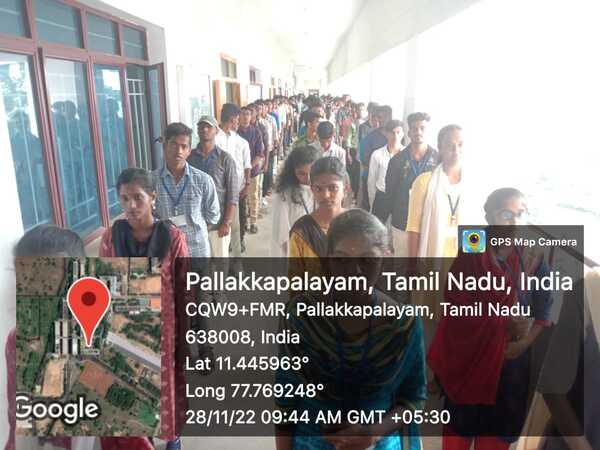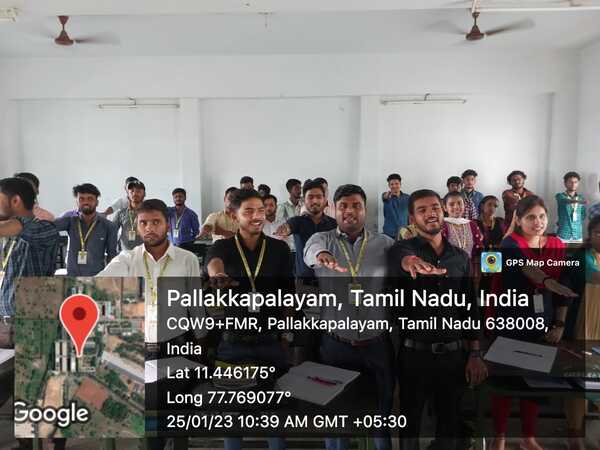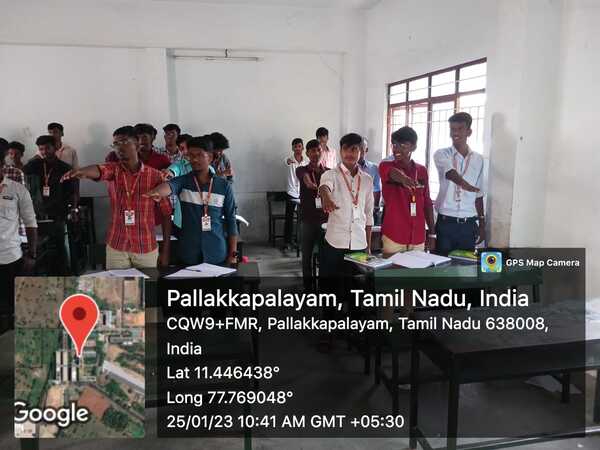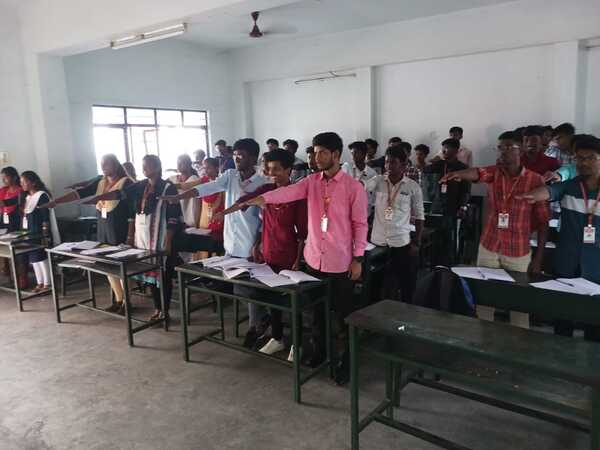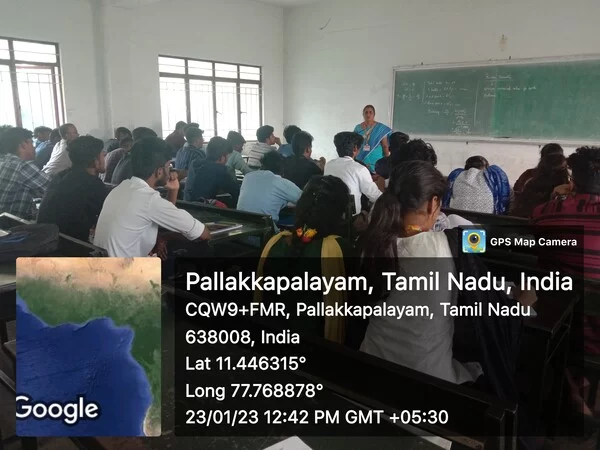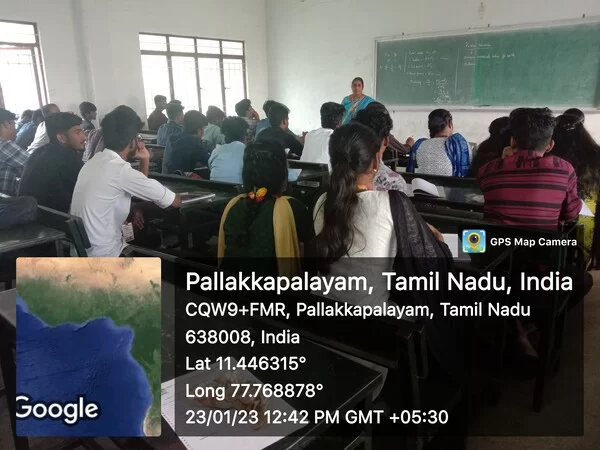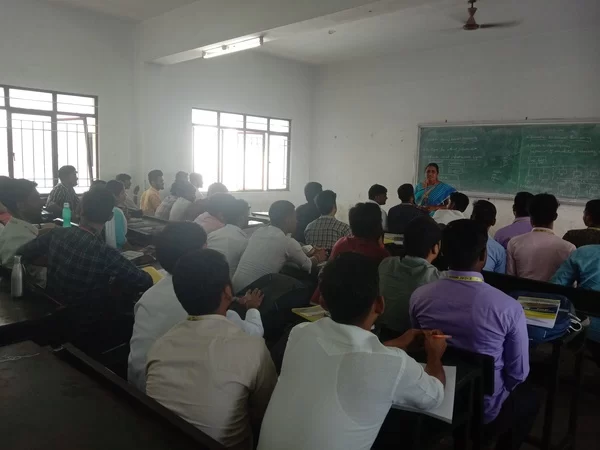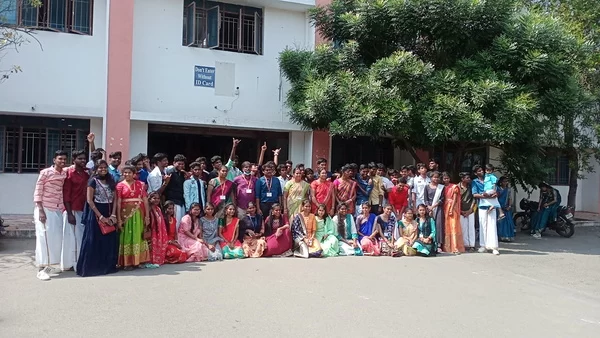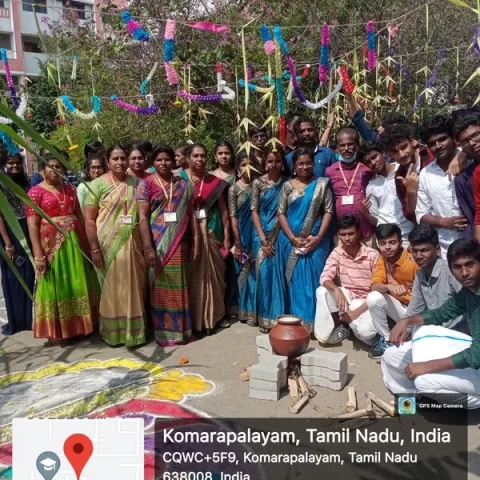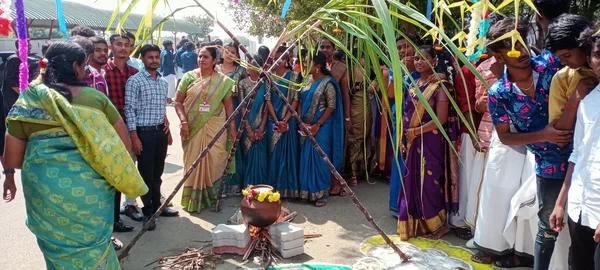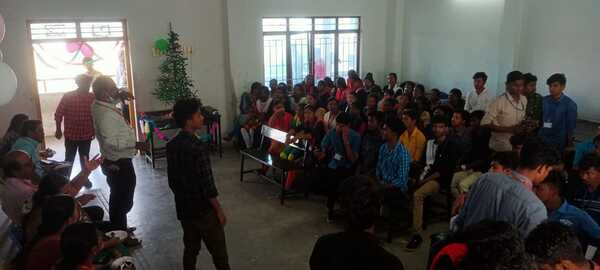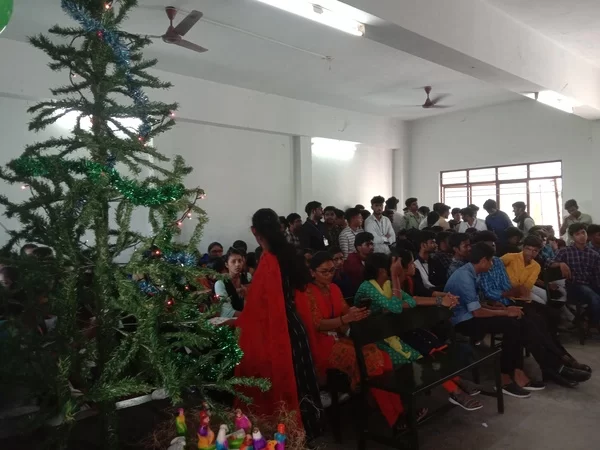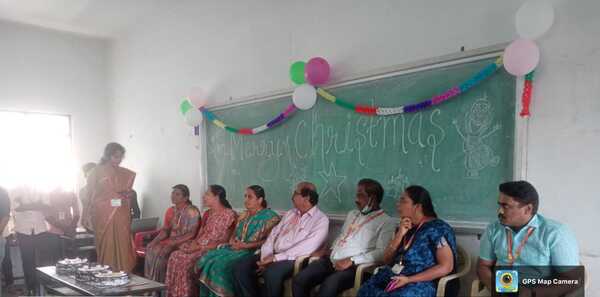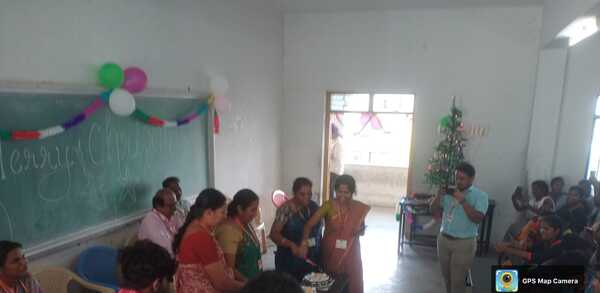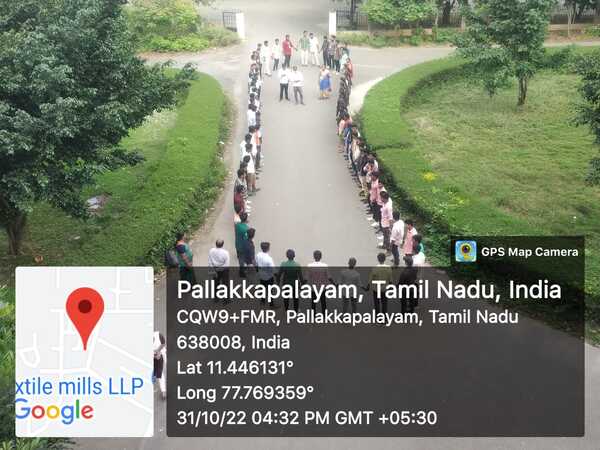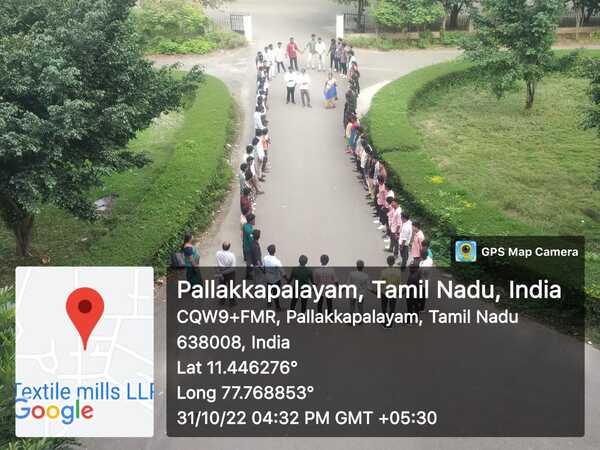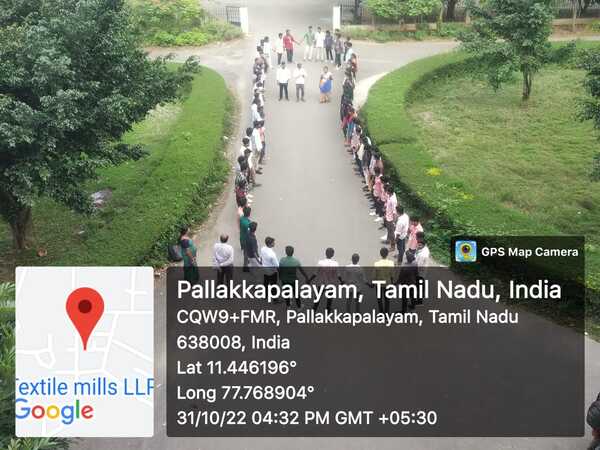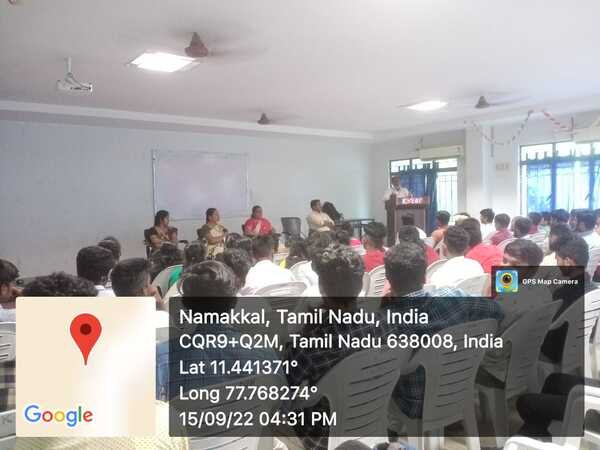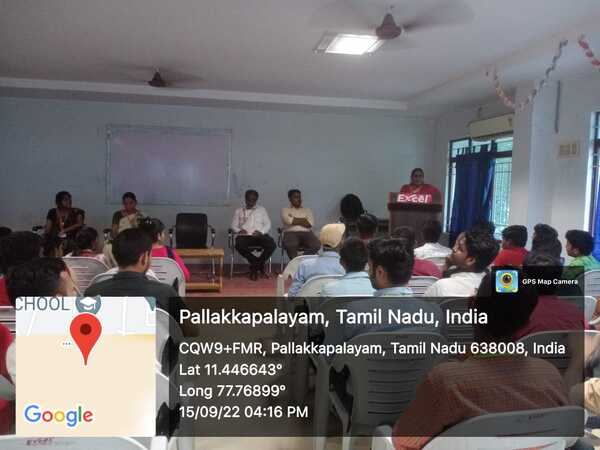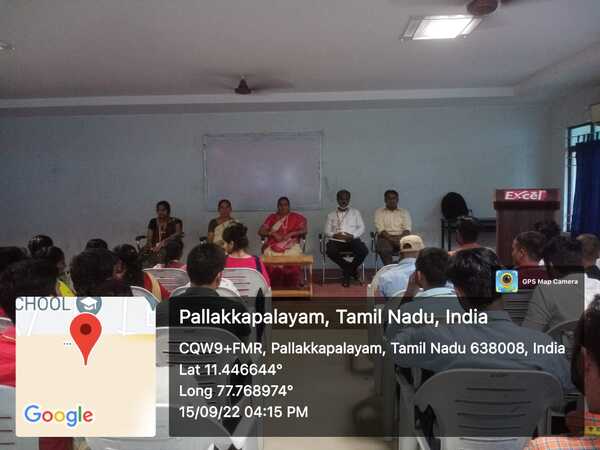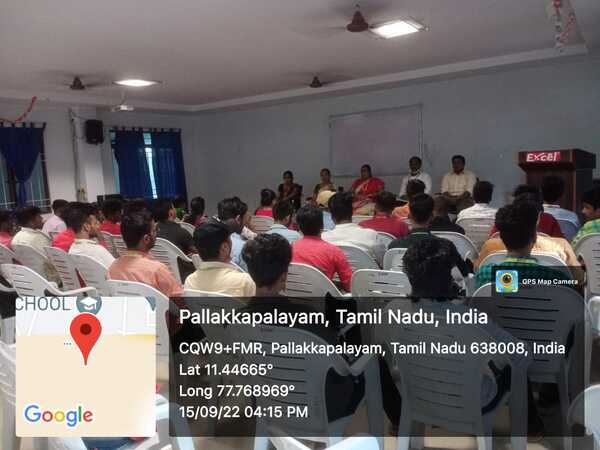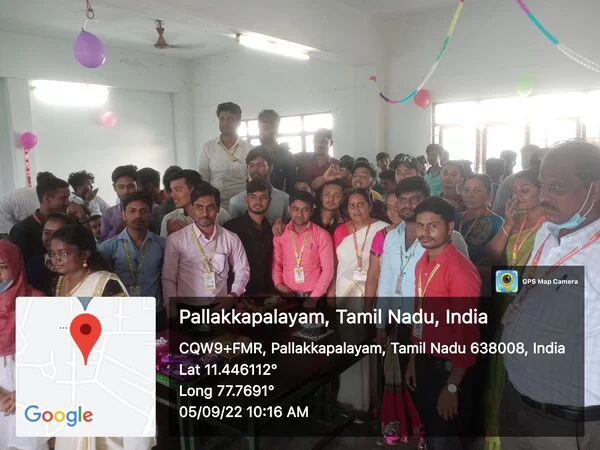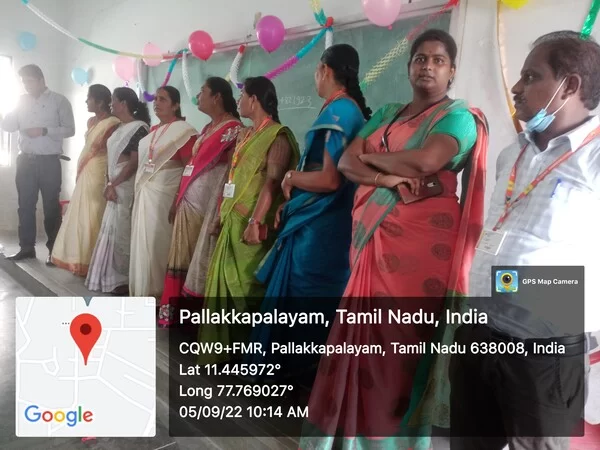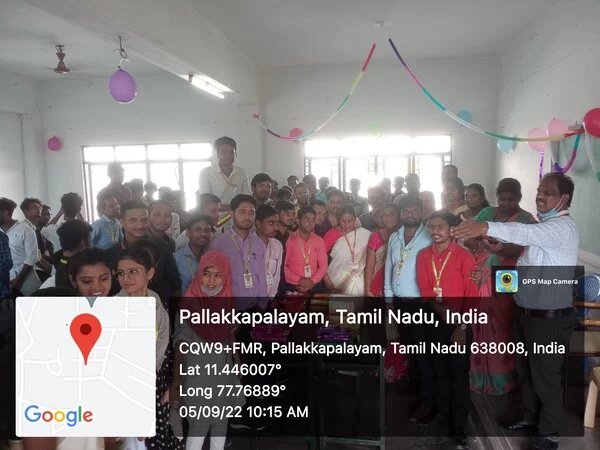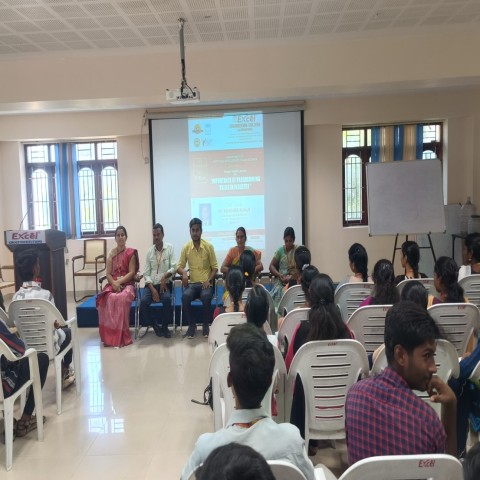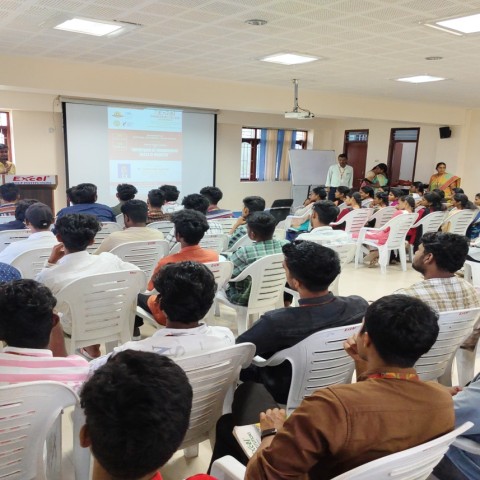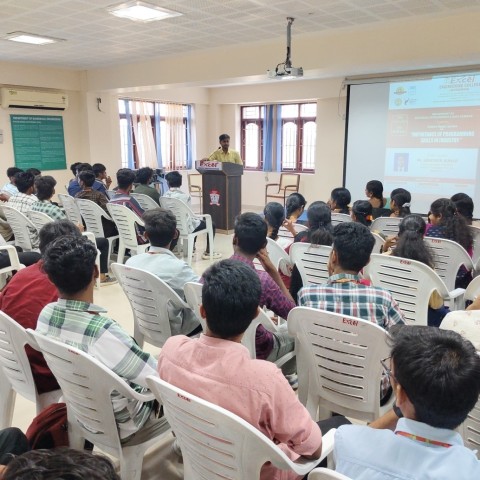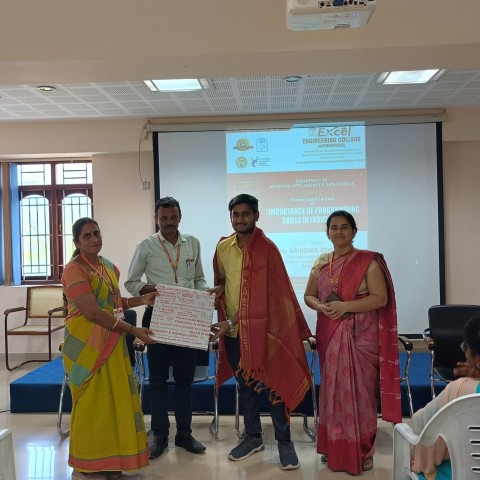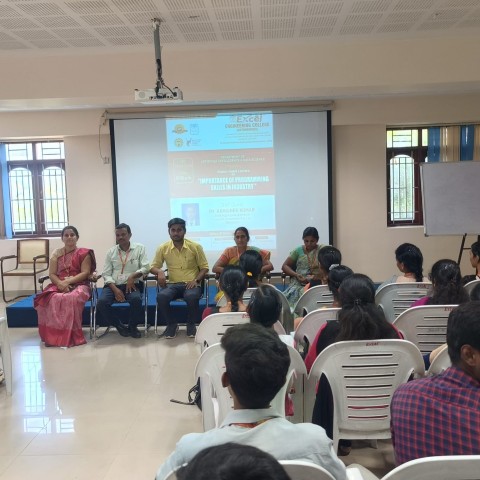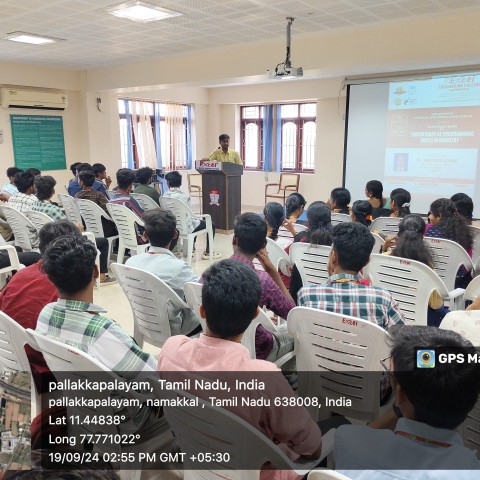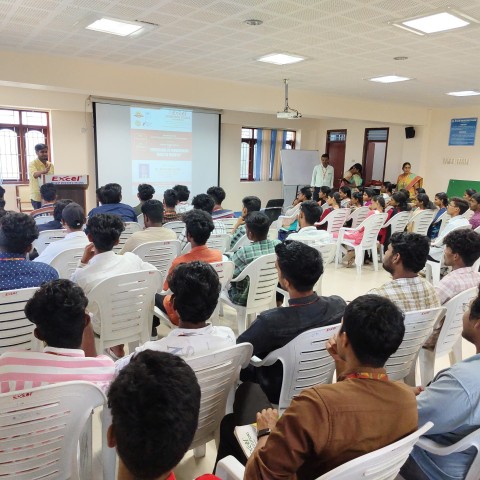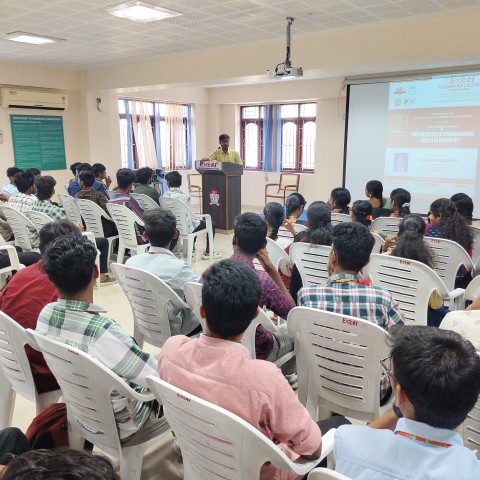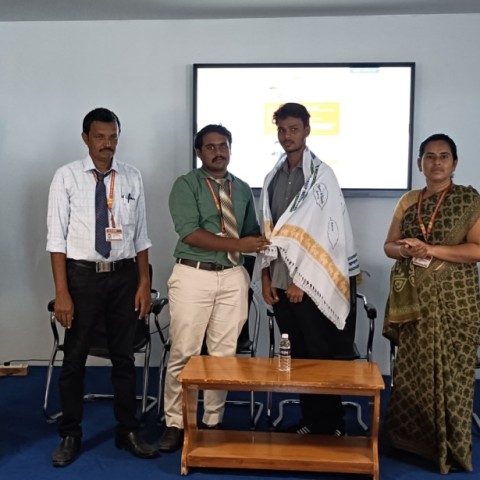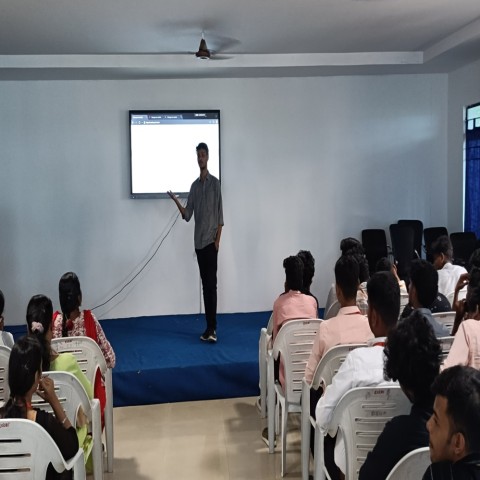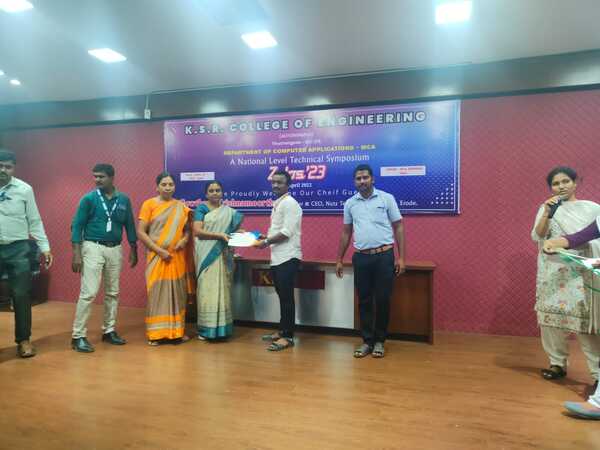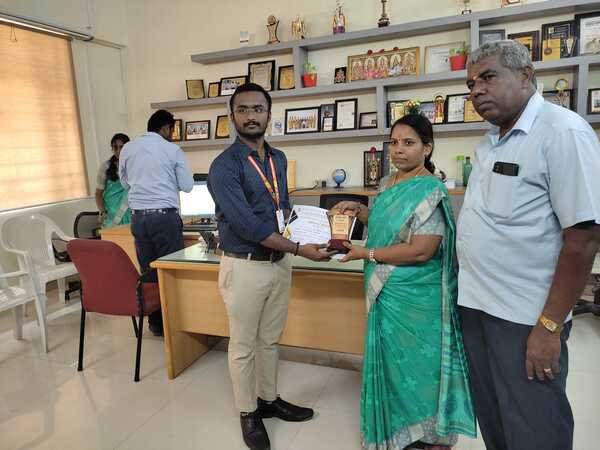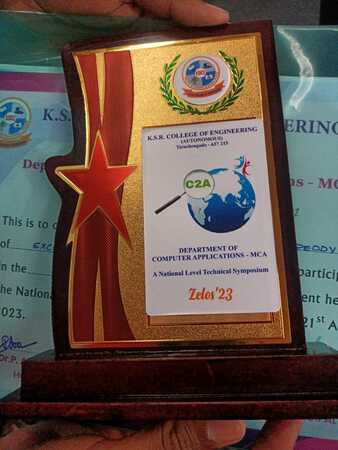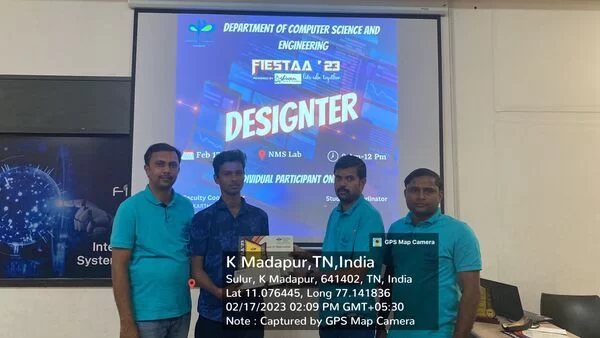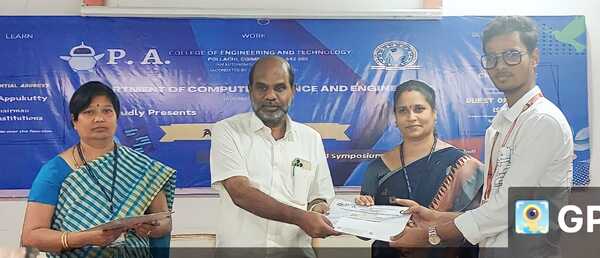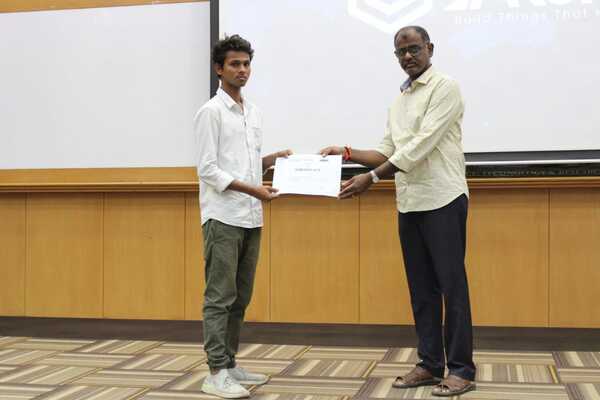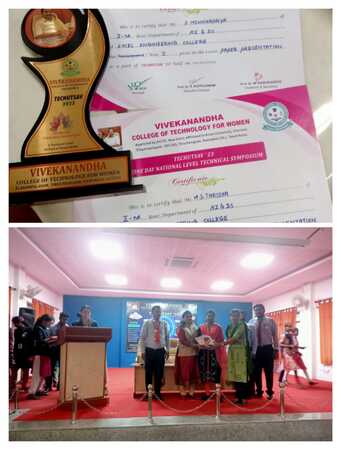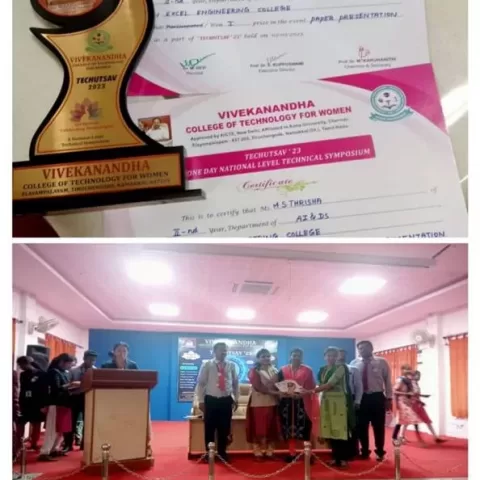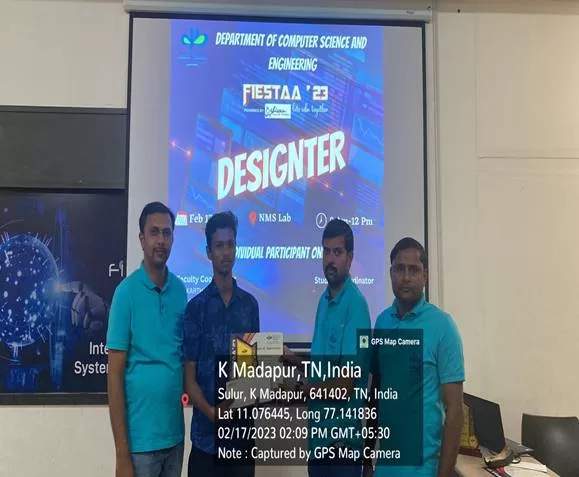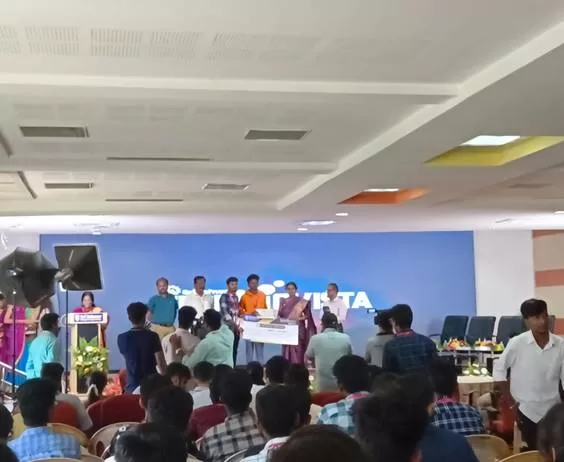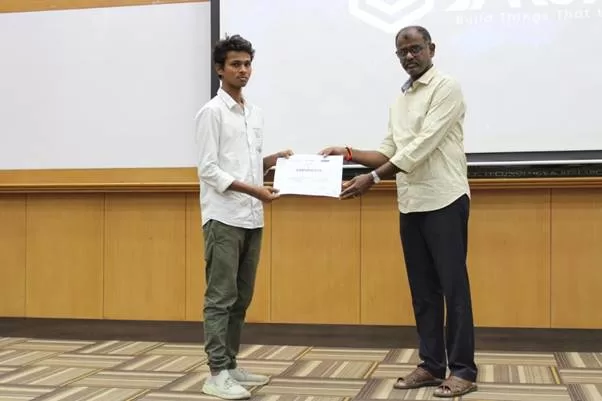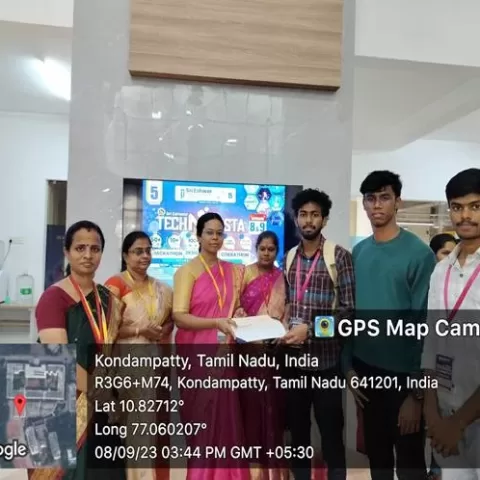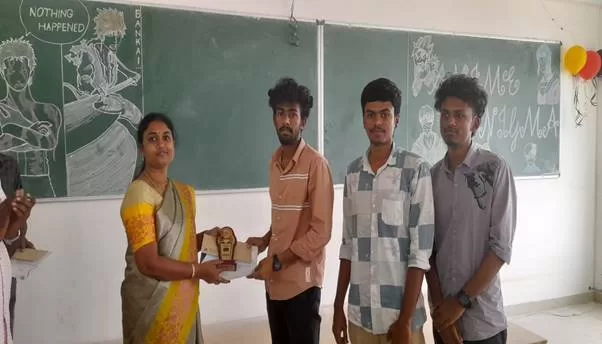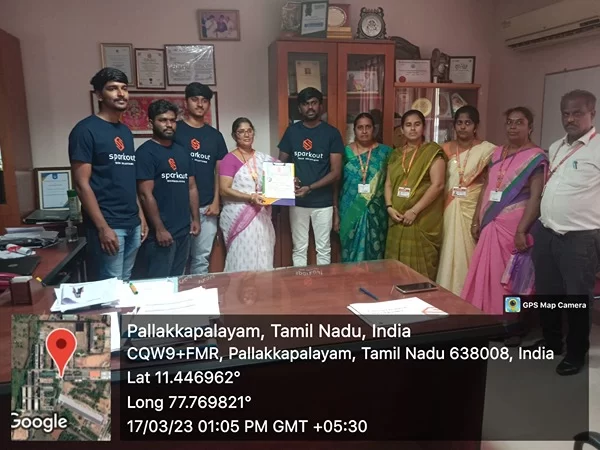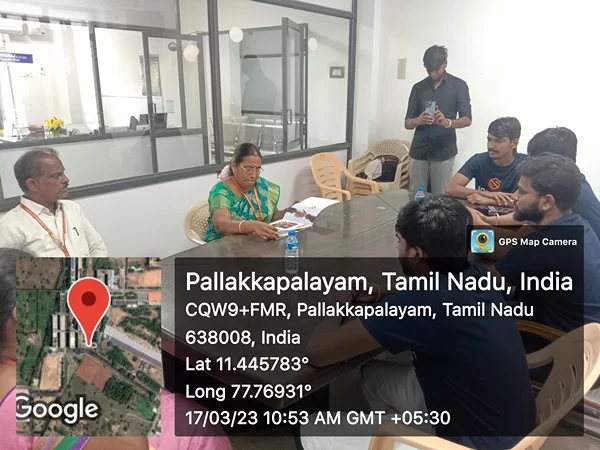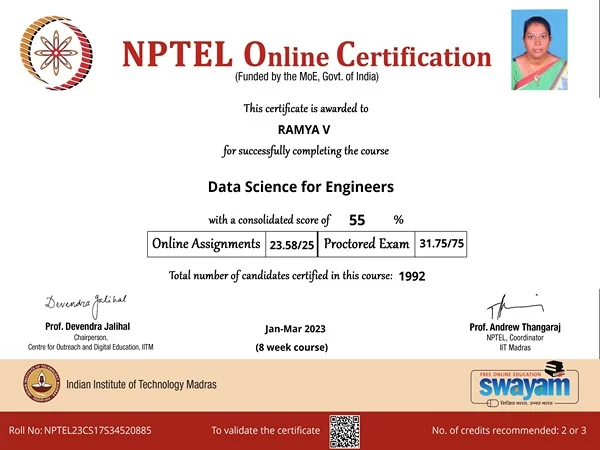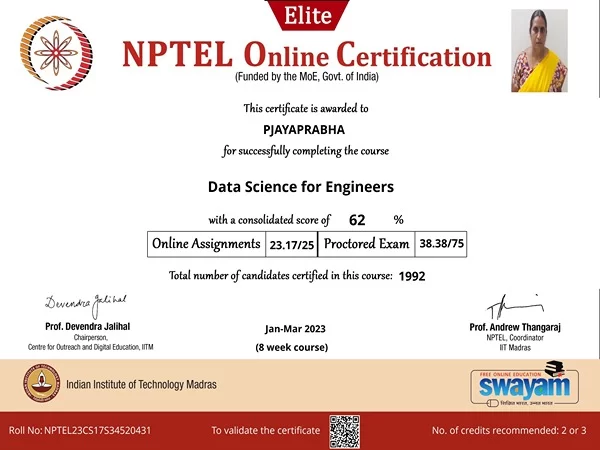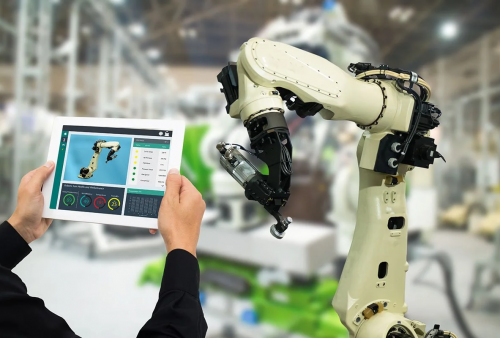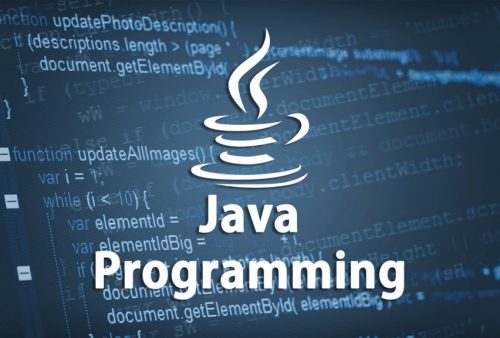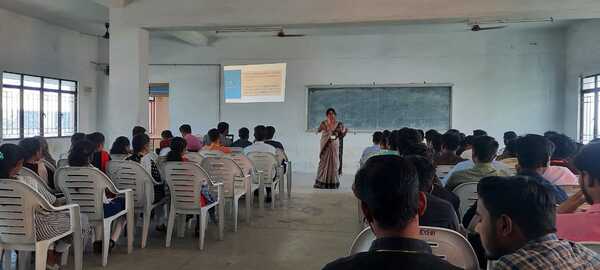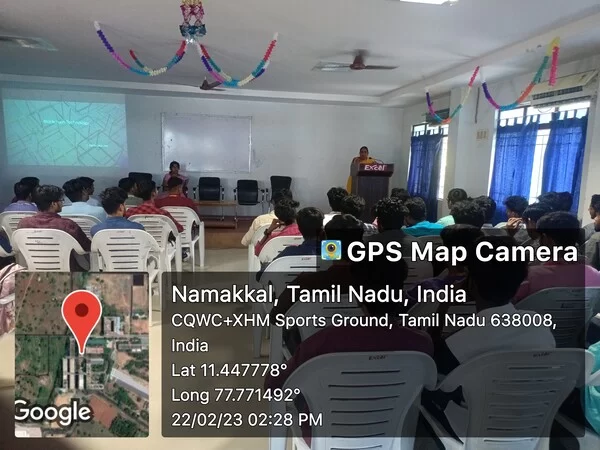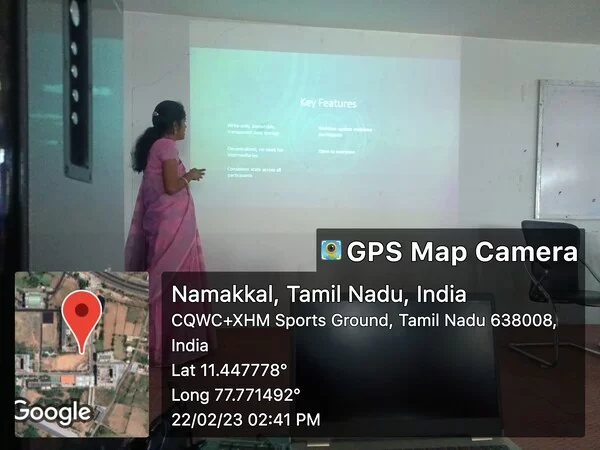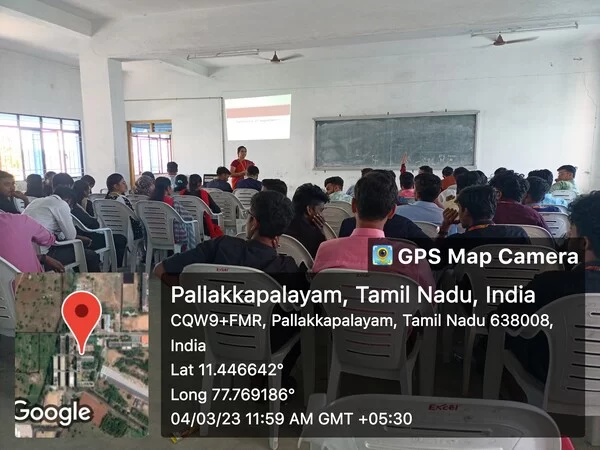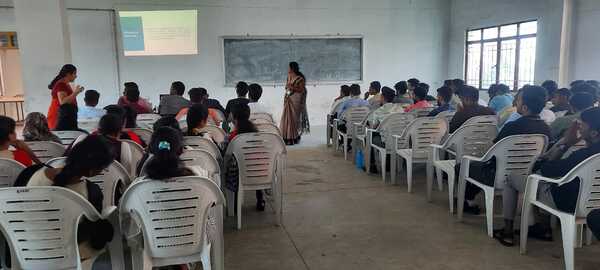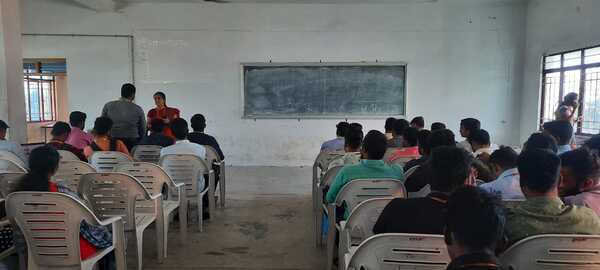Artificial Intelligence and Data Science (AI &DS)
Artificial Intelligence and Data Science (AI & DS)
About the Department
| Programme | Intake |
| B. Tech. in Artificial Intelligence and Data Science (AI &DS) | 120 |
The department of Artificial Intelligence and Data Science (AI&DS), a unique department endeavoring the students to impart knowledge on advanced innovations in the field of Artificial Intelligence, Data Science, Machine Learning, Deep Learning etc., The programme has comprehensive coverage of fundamentals of computer engineering along with cross disciplinary skills like statistics, mathematical and logical reasoning, knowledge discovery, visualization, big data analytics etc.
Successful MNCs like Google, Amazon, Facebook, Flipkart, twitter etc. uses various AI and DS techniques to discover patterns and trends in user’s data and behavior. Various banking and financial companies like Barclays, HDFC, Citi Bank, Morgan Stanley, Avaya etc. uses AI and DS techniques for risk analysis, share market trends analysis and investment banking. The programme curriculum is meeting to the contemporary industry needs. This specialized programme opens many career avenues for aspirants in healthcare, finance, astronomy, agriculture, data security, entertainment, E-commerce, social networking, climatology, biotechnology, genetics and many more. Overall the programme curriculum is designed in a way that imparts core and necessary skills required in the domain.
HOD’s Message

Prof. P.JAYAPRABHA
Educational Qualification : M.E
Teaching Experience : 20 Years
Industry Experience : Nil
As the Head of the Department, I feel privileged to be leading a team of committed, talented and experienced faculty members. AI & DS is the most conspicuous technology that is instrumental in transforming the facet of industry and mankind. This course is specially designed to enable students to build intelligent machines, software, or applications with a cutting-edge combination of Machine Learning, Deep Learning, Analytics and Visualization technologies.
Our department aims to produce skilled professional in the domain of AI and DS and enable them to excel professionally. It also provides state of the art laboratory facilities to the students to get better practical exposure and strong ties with industry, research organizations and the community at large.
Vision & Mission
Programs Outcomes & Objective
Programme Outcomes (POs)
Program Outcome describe the knowledge, skills and attitudes the students should have at the end of a four year engineering program.
Engineering Graduates will be able to:
- Engineering Knowledge: Apply the knowledge of mathematics, science, engineering fundamentals and an engineering specialization to the solution of complex engineering problems.
- Problem Analysis: Identify, formulate, review research literature, and analyze complex engineering problems reaching substantiated conclusions using first principles of mathematics, natural sciences, and engineering sciences.
- Design / Development of solutions: Design solutions for complex engineering problems and design system components or processes that meet the specified needs with appropriate consideration for the public health and safety, and the cultural, societal, and environmental considerations.
- Conduct investigations of complex problems: Use research-based knowledge and research methods, including design of experiments, analysis and interpretation of data, and synthesis of the information to provide valid conclusions.
- Modern tool usage: Create, select, and apply appropriate techniques, resources, and modern engineering and IT tools including prediction and modeling of complex engineering activities with an understanding of the limitations.
- The engineer and society: Apply reasoning informed by the contextual knowledge to assess societal, health, safety, legal and cultural issues and the consequent responsibilities relevant to the professional engineering practice.
- Environment and Sustainability: Understand the impact of the professional engineering solutions to societal and environmental contexts, and demonstrate the knowledge of, and need for sustainable development.
- Ethics: Apply ethical principles and commit to professional ethics and responsibilities and norms of the engineering practice.
- Individual and team work: Function effectively as an individual and as a member or leader in diverse teams, and in multidisciplinary settings.
- Communication: Communicate effectively on complex engineering activities with the engineering community and with society at large, such as, being able to comprehend and write effective reports and design documentation, make effective presentations, and give and receive clear instructions.
- Project management and finance: Demonstrate knowledge and understanding of the engineering management principles and apply these to one’s own work, as a member and leader in a team, to manage projects and in multidisciplinary environments.
- Lifelong learning: Recognize the need for and have the preparation and ability to engage in independent and lifelong learning in the broadest context of technological change.
Programme Specific Outcomes (PSOs)
Program Specific Outcomes are statements that describe what the graduates of a specific engineering program should be able to do.
- Ability to implement innovative, cost effective, energy efficient and eco-friendly integrated solutions for existing and new applications using Internet of Things.
- Graduates will possess the additional skills in network security and IT infrastructure in Cyberspace
- Develop, test and maintain software system for business and other applications that meet the automation needs of the society and industry
Lab Details
Python Programming Lab
Computer Practices Lab
Programming and Data Structures Lab
Intelligent Systems Lab
Operating Systems Lab
RDBMS Lab
Data mining Tools Lab
R Programming Lab
Object Oriented Programming lab
Machine Learning Lab
Data Analytics Lab
Networks Lab
Data Visualization Lab
IOT Lab
Cloud Computing Lab
Department Activities
Skill development program on Effective Communication in Workplace
Department of Artificial Intelligence & Data Science organized a skill development program on Effective Communication in Workplace on March 8, 2025, at B1 Block 208. The session aimed to enhance the communication skills of non-teaching faculty members, fostering better workplace interactions and professional growth The session was led by the Resource Person, Dr. C. Samsonraj, Assistant Professor, Department of English, who provided valuable insights into various aspects of workplace communication.
Unlock Your Full Potential
Department of Artificial Intelligence and Data Science organizing Non Academic event on “Unlock Your Full Potential” on 07.03.2025 at Medical Block, Excel Medical College for Naturopathy and Yoga, The session was led by the distinguished resource person, Dr. Malathi Rathinam, Principal, Excel Medical College for Naturopathy and Yoga. She delivered an insightful talk on unlocking one’s potential through self-awareness, discipline, and positive mindset.
Make Every Step Greener:
Department of Artificial Intelligence and Data Science, successfully organized a non-academic event titled “Make Every Step Greener” on February 21, 2025, at GHSS Kullanaickenpalayam. A group of 80 students and 5 faculty members travelled to the venue using our college transportation. During the event, we planted 30 different species of plants, reinforcing our commitment to environmental sustainability.
Awareness Rally on Health and Fitness
Department of Artificial Intelligence and Data Science, Excel Engineering College and National Cadet Corps jointly organized an “ Awareness Rally on Health and Fitness” on 21.02.25 at kullanayakkanpalayam, Tiruchencode. 124 students from AI&DS Department participated to create awareness on health and Fitness. The awareness rally started at 10.00 A.M and ended 12.30 P.M. Ms. A. Yasmin, Assistant professors of AI&DS Department and Mr. Nithyanandhan, NCC Coordinator of Excel Group of Institutions coordinated the rally. Prof. P.Jayaprabha HOD/ AI&DS and Dr. S. Anbukaruppusamy, Director Admin, Excel Engineering college, started the rally by waving the flag.
Essay writing on Gender Balance in Workplace
Department of Artificial Intelligence and Data Science organized Non-Academic Event – Essay writing on Gender Balance in Workplace. Conducted for I year and II-year students on 15.02.2025 at 02.30 pm in B1-303.This event aimed to raise awareness and foster a deeper understanding of gender equality in professional settings, encouraging students to think critically about societal issues.
During the essay writing session, 31 students are participated and expressed their thoughts on the importance of gender balance and the role it plays in creating inclusive and productive work environments.
Non Academic event: National Girl Child day
Department of Artificial Intelligence and Data Science organied Non Academic event on “National Girl Child day”( Dance, Mehandi ) on 24.01.2025 at B1 Block 303. National Girl Child Day is observed on January 24th every year in India to promote awareness about the rights, education, and empowerment of girls. Officers from Collectorate gave speech about National Girl Child day and highlighted government schemes and initiatives to support girl’s welfare.
Non Academic event: World development information day
Department of Artificial Intelligence and Data Science organizing Non Academic event “World development information day” on 24.10.2024 at AI&DS Lab, B1 Block. Students of II year and III year participated and presented their ideas about the recent trends of information and its importance in this upcoming AI era.
Non Academic event:
Department of Artificial Intelligence and Data Science organizing an Orientation program “Support Staffs Success Series” on Microsoft word and Excel for Non Teaching staff at 10.AM on 05.10.2024 in AI&DS Lab, B1 block The programme was conducted by P.Jayaprabha HOD/AI&DS about Microsoft word and Excel and how to improve their skills in MS Word and Excel as it is a essential tools for communication, organization, and data analysis.
Non Academic event:
Department of Artificial Intelligence and Data Science organizing an Orientation program “Support Staffs Success Series” on Microsoft word and Excel for Non Teaching staff at 10.AM on 05.10.2024 in AI&DS Lab, B1 block The programme was conducted by P.Jayaprabha HOD/AI&DS about Microsoft word and Excel and how to improve their skills in MS Word and Excel as it is a essential tools for communication, organization, and data analysis.
Awareness on Environmental Pollution
Department of Artificial Intelligence & Data Science organized Non Academic Event on “Awareness on Environmental Pollution” at B1 Block-208 on 20.09.2024.The students of II,III and IV year participated and created awareness by displaying their presentation on pollution.
Non Academic event
The Department of Artificial Intelligence and Data Science organized a Debate on Gender Equity “Does Gender Affects Leadership” on 06.09.2024 at 3.00 P.M in 208 hall ,B1 Block. The students of II,III year participated in debate and shared their points about how gender can significantly influence leadership in various ways.
Non academic Activity on 06.09.2024
The Department of Artificial Intelligence and Data Science organized a Debate on Gender Equity “Does Gender Affects Leadership” on 06.09.2024 at 3.00 P.M in 208 hall ,B1 Block. The students of II,III year participated in debate and shared their points about how gender can significantly influence leadership in various ways.
Digital Learning day
Department of Artificial Intelligence and Data Science organized an Awareness programme “Digital Learning day” 29.02.2024 at 10.00 A.M in AI&DS lab,B1 Block.
The students of II and III year students created awareness by presenting content about various learning websites like Udemy, Scalar, Coursera and also gave information about government website for health insurance and sites for digital marketing.
extension activity on visiting old age Home
Department of Artificial Intelligence and Data Science organized extension activity on visiting old age home on 13.02.2024.
The students II and III year students visited the Annai old age home, Komarapalayam, Namakal District. Before one week itself the students collected groceries, clothes and other needed items for the people staying in the old age home.
Debate On Women Researchers Challenges And Responsbilities
Department of Artificial Intelligence and Data Science organized a Gender Equity programme “DEBATE ON WOMEN RESEARCHERS CHALLENGES AND RESPONSBILITIES”. The students of II and III year students participated in the debate and put forth their points as team about women researchers and their challenges in the present world, and others participated in Drawing competition to unveil their artistic nature to create awareness on Gender Equity.
Conversational English, Computer skills and Laboratory safety
Department of Artificial Intelligence and Data Science organized A Skill Development Programme for non-teaching faculties on the topic Education on “Conversational English, Computer skills and Laboratory safety”on 04.08.2023 at 11.00 A.M to 12.30 P.M in 208-Seminar Hall,B1,Block.The programme was conducted by P.Jayaprabha HOD/AI&DS about basic lab safety points and how to improve the communication and computer skills among them in the lab.
DevOps and Cloud Computing Trends
Department of Artificial Intelligence and Data Science organized Academic Guest Lecture on “Devops and Cloud Computing Trends” on 15.02.2025 at APJ Hall” for II year and IV year students.The resource person Dr.D.Deepa gave Lecture about DevOps and Cloud Computing trends. The students gained knowledge about how cloud enables DevOps principles by providing on-demand infrastructure, automation capabilities, and scalability.
Role of AI and Data Science in Smart Cities
Department of Artificial Intelligence and Data Science organized Academic Guest Lecture on “Role of AI and Data Science in Smart Cities” for II year and IV year students on 14.02.2025 at 10.30 am in Kandhaswamy hall. The resource person Dr.I.Bramnavasgave Lecture about Role of AI and Data Science in Smart Cities. Delivered a comprehensive lecture on the transformative role of Artificial Intelligence (AI) in the networking industry
Recent Industry Trends and Opportunities of AI&DS
Department of Artificial Intelligence and Data Science organized Alumini Guest Lecture on “Recent Industry Trends and Opportunities of AI&DS” for III year and IV year students on 23.01.2025 at 10AM in 208 B1,Block. The Alumini Resource Person Mr.Abhijeet Anand gave Lecture how programming skills are important in many industries and help people to communicate with machines and create solutions to meet organizational needs.
Recent Industry Trends and Opportunities of AI&DS
Department of Artificial Intelligence and Data Science organized an Alumini Guest Lecture on ”Recent Industry Trends and Opportunities of AI&DS” for III year and IV year students on 23.01.2025 at 10.00 AM in Kandasamy hall. Our Alumni student Mr. Abhijeet Anand Technical Resesarch Analyst,Junomoneta Finsol Pvt Ltd,Gujarat discusses recent trends and opportunities in AI driven automation.
Academic Guest lecture
Department of Artificial Intelligence and Data Science organized Academic Guest Lecture on “Influence of AI in 5G Network” for III year and IV year students on 09.09.2024 at 10.00 am in Kandhaswamy hall. Prof P.Jayaprabha welcome the gathering, Followed by Dr.P.Selvaraju introduced the Chief guest.
The resource person Dr.A.Prabhu gave Lecture about Influence of AI in 5G Network.. AI plays a transformative role in the networking industry by optimizing various aspects of network operations.
Academic Guest lecture
Department of Artificial Intelligence and Data Science organized Academic Guest Lecture on Dimensionality Reduction in Machine learning” by Dr.R.Thangarajan, Kongu Engineering College on 06.09.2024 at 10.AM in B1 Block-208 Hall to III year students. The resource person gave introduction about Machine learning and its concepts and explained students about dimensionality reduction methods for representing the dataset.
Activity on 09/09/2024
Department of Artificial Intelligence and Data Science organized Academic Guest lecture on “Influence of AI in 5G Network” by Dr.A.Prabhu, ASP, Jain Deemed to be University on 09.09.2024 at 10.AM in Kandhasamy Hall to III year and IV year students. The resource person gave a lecture about how AI can automate tasks, improve workflows, and reduce human error. It can also provide deeper analytics and help with decision making using the 5G network.
AGL Activity on 06.09.2024
Department of Artificial Intelligence and Data Science organized Academic Guest Lecture on Dimensionality Reduction in Machine learning” by Dr.R.Thangarajan, Kongu Engineering College on 06.09.2024 at 10.AM in B1 Block-208 Hall to III year students.The resource person gave introduction about Machine learning and its concepts and explained students about dimensionality reduction methods for representing the dataset.
Full Stack Development
Department of Artificial Intelligence and Data Science organized Virtual Industrial Guest lecture on “Full Stack Development” by Mr.S.HariPrasad on 23.04.2024 at 10.AM in B1 Block to II year and III year students.The resource person gave information about Full stack development and the process of developing both the frontend and backend of applications.
Data mining and Text Mining Applications in Business intelligence
Department of Artificial Intelligence and Data Science organized Academic Guest lecture on “Data mining and Text Mining Applications in Business intelligence” by Dr.A.Sabenabanu on 08.04.2024 at 10.AM in B1 Block-Seminar Hall to II year students.The resource person gave introduction about Data mining and its concepts and explained students about Text Mining Applications.
Data Analysis Using “STATCRAFT”
Department of Artificial Intelligence and Data Science organized One Day Seminar for II and III year students on “Data Analysis Using STATCRAFT” by Dr.M.Dhurgadevi at APJ Hall on 05.03.2024 at 10.AM.The resource person gave lecture about STATCRAFT a web-server based platform that allows users to run data analytics in R.
Industrial Application of Generative AI
Department of Artificial Intelligence and Data Science organized Industrial Seminar on “Industrial Application of Generative AI” on 08.02.2024 at 10.00 am in Kandhaswamy hall for II and III year students.The resource person provides the machine learning and growth of the generative AI in the current scenario.
Public Key Cryptography and its Real time Applications
Department of Artificial Intelligence and Data Science organized an Academic guest lecture for III year and IV year students on “Public Key Cryptography and its Real time Applications “on 04.09.2023 at 10.00 A.M in Kandhasamy hall. The speech was given by Dr.P.Saveetha, Professor/CSE, Karpagam Academy of Higher Education, and Coimbatore.
Industrial EDC Seminar
Department of Artificial Intelligence and Data Science and Institution’s Innovation Council (IIC) organized Industrial EDC Seminar titled “Entrepreneurship skill development among student Community” ” on 21.09.2024 at 10.00 am Pavayammal hall.
The resource person Mr.K.Praveen, Senior data analyst, HDFC bank, Bangalore handled the entire session on 21.09.2024. He mentioned the skill set need for running the business successfully and need of market analysis in any start up. Finally he provided financial assistance and loan availability in bank as per the government norms and RBI guidelines.
Python Bug Hunt
The AI Hive Club organized a thrilling Code Debugging Event titled “Python Bug Hunt” for its members from various computing branches. The event aimed to challenge participants’ coding skills, problem-solving abilities, and attention to detail. The Event commenced with a warm welcome and address by the Club Coordinator, Mrs.A.Yasmin, The event began with a comprehensive briefing on the competition format, rules, and evaluation criteria. Participants were provided with incorrect Python codes containing various bugs and errors, which they had to identify, debug, and correct within the allotted time.
Real-Time Data Visualization using Power-BI
The AI-Hive Club, a student-led organization focused on Artificial Intelligence and Data Science, Excel Engineering College was inaugurated on 04.03.2025 at APJ Hall. Club Coordinators Mrs.A.Yasmin and Mrs.C.Eben Exceline, Assistant Professor of AI&DS Department presented an overview of the AI-Hive Club, highlighting its mission, objectives, and planned activities. The club aims to provide a platform for students to learn, experiment, and innovate in AI and Data Science. The guest speaker, Mr.S.Gokulraj, delivered an insightful lecture on “Real-Time Data Visualization using Power-BI.” The speaker explained the concepts of data visualization,
Deep Learning for Computer Vision from Scratch to Development
Department of Artificial Intelligence and Data Science organizing Faculty Development Program on “Deep Learning for Computer Vision from Scratch to Development” from 22.04.2024 to 24.04.2024 at 10.AM in Dr.APJ. Abdul Kalam Hall. About 17 faculties actively participated and gained knowledge.
Opportunities For Engineers AI Product Design Service Industry
Department of Artificial Intelligence and Data Science organized Industrial Guest Lecture on “Opportunities For Engineers AI Product Design Service Industry” for III year students on 24.01.2025 at 10AM in APJ Hall. The Resource Person Mr.Joseph Anthony gave valuable insights, how emerging technologies like Virtual Reality (VR) and Augmented Reality (AR) are revolutionizing education. The session aimed to educate students on the practical applications and benefits of immersive learning techniques.
Industrial Seminar on “QuantumLeap in AI Superposition of Intelligence: The Fusion of AI and Quantum Computing
Department of Artificial Intelligence and Data Science, successfully organized Industrial Seminar on “Quantum Leap in AI Superposition ofIntelligence: The Fusion of AIand Quantum Computing ”on25.02.2025at KandhasamyHall for III year and Other College students on 25.02.2025 at 10.00am in Kandhasamy Hall. Prof P.Jayaprabha welcomed the gathering, Followed by Dr.P.Selvaraju introduced the Chief guest. The resource person Mr.GobiNagaraj gave Lecture about how programming skills are important in many industries and help people to communicate with machines and create solutions to meet organizational needs.
Opportunities for Engineers AI Product Design Service Industry
Department of Artificial Intelligence and Data Science, successfully organized a Guest Lecture on “Opportunities For Engineers AI Product Design Service Industry” for III year students on 24.01.2025 at 10AM in APJ Hall. Prof P.JayaPrabha welcome the gathering, Followed by Dr.P.Selvaraju introduced the Chief guest.The Resource Person Mr.JothiMurugan gave Lecture how Engineers in the AI product design service industry have numerous opportunities to innovate and lead in developing intelligent solutions for various sectors.
IPR Seminar
The Department of Artificial Intelligence and Data Science organized an IPR Seminar on “Secure your idea’s secure your future ” for III year and IV year students on 28.08.2024 at 10.00 AM in Kandasamy Hall. The resource person Mr.Gowtham Krishnamoorthy,Founder & CEO Nutz technovation Pvt.Ltd,Erode shared his ideas to build a secure and prosperous future to ensure long-term success and stability.
Industrial Guest lecture
Department of Artificial Intelligence and Data Science organized Industrial Guest lecture on “Digitalization using Tableau” for III year and IV year students on 23.08.2024 at 11.00 am in Kandhaswamy hall.The resource person Mr. S. Hariprasad gave lecture about Tableau, a popular data visualization tool that enables users to connect to various data sources, create interactive dashboards, and share insights with others.
IPR SEMINAR
The Department of Artificial Intelligence and Data Science organized an IPR Seminar on “Secure your idea’s secure your future ” for III year and IV year students on 28.08.2024 at 10.00 AM in Kandasamy Hall. The resource person Mr.Gowtham Krishnamoorthy,Founder & CEO Nutz technovation Pvt.Ltd,Erode shared his ideas to build a secure and prosperous future to ensure long-term success and stability.
Research Trends in Industrial Cyber security
Department of Artificial Intelligence and Data Science organized an Industrial Guest Lecture for II and III year students on “Research Trends in Industrial Cyber security”, on 25.03.2024 at 10.00 AM in Kandasamy Hall. The resource person Mr. Vikas Karunakaran, Head Threat research, Sectrio, Banglore shared his thoughts about cyber security trends, security measures, recent techniques to avoid cyber-attacks.
Persistence IT from Entry level to Expert
Department of Artificial Intelligence and Data Science Organized Industrial Guest Lecture for II and III year students on “Persistence IT from Entry level to Expert” in Paavayammal Hall on 06/03/2024. The resource person Mr.Rajkumar Ramasamy,Project Manager at UCEFER gave lecture about IT Industry.
Social Media Strategies & Social Media Analytics
Department of Artificial Intelligence and Data Science organized Industrial Guest Lecture on “Social Media Strategies & Social Media Analytics” on 26.02.2024 at 10.00 am in Kandhaswamy Hall for II and III year students
The resource person provides the Knowledge about social media marketing strategies. Which gives a plan to do and hope to achieve on social media
Industrial Visit
Department of Artificial Intelligence and Data Science Industrial Visit to “Sparkout Tech Solutions (P) Ltd, Coimbatore on 14.10.2023.The students of III year and IV year visited the Sparkout Tech Solutions (P) Ltd and gained knowledge about different projects that is undergoing in present time. The Primary focus is to build solutions that impact human lives for the better, providing services such as MEAN/MERN Stack Development, iOS App Development, Android App Development, Layer 1/Layer 2 Blockchain Development.
Mastering Job Interview
Department of Artificial Intelligence and Data Science organized Industrial Guest lecture on “Mastering Job Interview ” on 06.10. 2023 at 10.00 A.m in AI & DS Lab for III year students. The resource person provides the key points about interview strategies, And gave a enthusiastic note and shared his knowledge about preparation for an interview in companies
Defi
Department of Artificial Intelligence and Data Science Organized MOU Industry Related Activity “Seminar on Decentralized Finance” for students of II & III year AI&DS on 17.03.2023. The resource persons Mr. Ruban and Mr. Jeevanantham gave lectures about Blockchain Technology and Cryptocurrency in Banking Sector.
Mastering AI Tools
Department of Artificial Intelligence and Data Science organized workshop on “Mastering AI Tools” for II year students and students from outside colleges on 17.03.2025 at 10:00 AM in Kandasamy Hall,Main Block. The workshop was an insightful session aimed at providing participants with practical knowledge of AI-driven platforms such as QuillBot, GitHub Copilot, and Learn.AI. The workshop was led by Dr. Vimaladevi, Associate Professor, Kongu Engineering College, shared her expertise on the applications and benefits of AI in various domains, including writing, coding, and education.
Hands on Training on “Digital Marketing Tools and Techniques”:
Department of Artificial Intelligence and Data Science organized Hands on Training on “Digital Marketing Tools and Techniques” at Kandaswamy hall on 04.10.2024. The Program starts with a prayer song and welcome address given by Prof.P.Jayaprabha, HOD/AI&DS followed by Honoring the Chief Guest by Dr.P.Selvaraju, ASP/AI&DS and the Chief Guest was introduced by Mrs.A.Yasmin AP/AI&DS.The speech was given by Mr.Stanley Victor, Freelancer from Bangalore. The students from various colleges actively participated and gain knowledge about various tools and techniques in Digital Marketing.
Workshop
The Department of Artificial Intelligence and Data Science organized Workshop on “AI in Industrial Automation” for AI&DS students and other college students on 19.09.2024 at 10.00 am in APJ Abdul kalam hall. The resource person Mr. M.Sudhakar gave a lecture about the importance of Artificial intelligence (AI) in transforming industrial automation by improving efficiency and flexibility. The students from various colleges attended the workshop and got benefitted.
Digital Forensic Tools
Department of Artificial Intelligence and Data Science organized a Workshop on “Digital Forensic Tools” by Mr.D. Paul Joseph on 08.04.2024 at 10.AM in APJ Hall. Students from various other colleges and our college students attended the workshop. The resource person introduced various categories of digital forensic tools, including those for disk imaging, file analysis.
One credit course on Linux Shell Programming
Department of AI&DS conducted one credit course for II year students on Linux Shell Programming for 2 days on 09.10.23 & 10.10.23 The resource person is Mr. Aravind Raj, discussed how shell programs are created and then executed and importance of Shell scripting for backing up files, monitoring system resources, and managing user accounts.
Machine Learning
Department of Artificial Intelligence and Data Science Organized a Workshop on Machine Learning Techniques on 27.02.2023 at APJ Hall from 10.00 AM to 04.00 PM in two Sessions. Students from various other colleges and our college students attended the workshop. Dr.S.Malliga from Kongu Engineering College was the Resource person who handled sessions.
International Animation Day
Department of Artificial Intelligence and Data Science organized “International Animation Day” on 28.10.2023 at 10.00 A.M at AI&DS Lab,B1 Block.The students of III year and IV year understood the importance of this special day as it was created in 2002 by ASIFA (Association International du Film Animation) to recognize the art of animation and its importance in film, television, gaming, and other forms of entertainment.
Teacher’s day celebration
Department of Artificial Intelligence and Data Science organized Teachers day celebration on 05.09.2023 at 2.00 P.M in Drawing hall,B1 Block. The students of II ,III and IV year participated in Teachers day function and they performed activities and fun games to make teachers happy and they gave speech about efforts and hard work of every teacher to shape the future of students.
From Campus to Career: Navigating the Path to Success
Department of Artificial Intelligence and Data Science, organized an Alumni Guest Lecture titled “From Campus to Career: Navigating the Path to Success” for third-year students on January 23, 2025, at 10:00 AM in Room 208, B1 Block. Mr.R.Panbarasu the distinguished alumin began the session by emphasizing the importance of self-assessment in identifying strengths and values to explore diverse career opportunities in AI and Practical advice was provided on crafting tailored resumes and compelling cover letters, ensuring that students highlight relevant achievements and align their applications with industry expectations.
Recent Industry Trends and Opportunities of AI&DS
Department of Artificial Intelligence and Data Science organized Alumini Guest Lecture on “Recent Industry Trends and Opportunities of AI&DS” for III year and IV year students on 23.01.2025 at 10AM in 208 B1,Block. The Alumini Resource Person Mr.Abhijeet Anand gave Lecture how programming skills are important in many industries and help people to communicate with machines and create solutions to meet organizational needs.
Alumini Guest Lecture
Department of Artificial Intelligence and Data Science organized Alumini Guest Lecture on “Importance of Programming Skills in Industry” for III year and IV year students on 19.09.2024 at 2 PM in Kandhaswamy hall. Prof P.JayaPrabha welcome the gathering, Followed by Dr.P.Selvaraju introduced the Chief guest.
The Alumini cum Resource Person Mr.Abhishek Kumar gave Lecture about Importance of Programming Skills in Industry. He explained why programming skills are important in many industries like they help people communicate with machines and create solutions to meet organizational needs.
Alumini Guest Lecture
Department of Artificial Intelligence and Data Science organized Alumini Guest Lecture on “Importance of Programming Skills in Industry” for III year and IV year students on 19.09.2024 at 2 PM in Kandhaswamy hall. Prof P.JayaPrabha welcome the gathering, Followed by Dr.P.Selvaraju introduced the Chief guest.The Alumini cum Resource Person Mr.Abhishek Kumar gave Lecture about Importance of Programming Skills in Industry. He explained why programming skills are important in many industries like they help people communicate with machines and create solutions to meet organizational needs.
Alumini Guest Lecture
The Department of Artificial Intelligence and Data Science organized an Alumini Guest Lecture on”Career Guidance” for III year and IV year students on 29.08.2024 at 10.00 AM in 208 hall,B1 Block. The resource person Mr.Gopalakrishnan shared his ideas and key points to build a carreer and achieve success in life.
Awards and Recognition
| S. No. | Roll.No | Reg.No | Name | Participation | Organizer Details | Event Name | Date | PRIZE |
| 1 | 21AD045 | 730921201045 | RAVIKUMAR R | Hunts on Cyber threats | SIMATS School of Engineering | Cyber Security | 31.10.22 | I |
| 2 | 21LAD056 | 730920201301 | GOPALAKRISHNAN D | Designer | KPR Institute of Engineering and Technology | FIESTAA 23 | 16.02.23 | I |
| 3 | 21AD034 | 730921201034 | MOUNIKA PRIYA.S | Paper Presentation | Vivekananda College of Technology For Women | TECHUTSAV’23 | 02.03.23 | I |
| 4 | 21AD059 | 730921201059 | THRISHA.M.S | Paper Presentation | Vivekananda College of Technology For Women | TECHUTSAV’23 | 02.03.23 | I |
| 5 | 20AD001 | 730920201001 | ABHIJEET ANAND | Paper Presentation | K.S.Rangasamy College of Technology | DAKSHAA T23 | 23.04.23 – 24.03.23 | III |
| 6 | 20AD009 | 730920201009 | ATIULLAH ANSARI | Paper Presentation | SSM College of Engineering | TECHZONE 2023 | 24.03.23 | III |
| 7 | 20AD028 | 730920201028 | MD KALAM | Paper Presentation | SSM College of Engineering | TECHZONE 2023 | 24.03.23 | III |
| 8 | 20AD043 | 730920201042 | RAZI HAIDAR | Paper Presentation | K.S.Rangasamy College of Technology | DAKSHAA T23 | 23.04.23 – 24.03.23 | III |
| 9 | 21LAD056 | 730920201301 | GOPALAKRISHNAN D | Hackathon | Sastra University | DAKSH | 07.04.23 – 09.04.23 | III |
| 10 | 21AD029 | 730921201029 | MARAM SIVABALAJI | Web Designing | K.S.R.College of Engineering | ASTHARA 2K23 | 11.4.23 | I |
| 11 | 21AD006 | 730921201006 | ARVETI SATISH BABU | Brainy Battle | K.S.R.College of Engineering (MCA Dept) | ZELOS’23 | 21.04.23 | I |
| 12 | 21AD008 | 730921201008 | AVULA VISHNUVARDHU REDDY | Brainy Battle | K.S.R.College of Engineering (MCA Dept) | ZELOS’23 | 21.04.23 | I |
| 13 | 21AD029 | 730921201029 | MARAM SIVABALAJI | Bug Sqash | K.S.R.College of Engineering (MCA Dept) | ZELOS’23 | 21.04.23 | II |
| 14 | 21AD040 | 730921201040 | PAMIDAKULA VENKATA SAI | Brainy Battle | K.S.R.College of Engineering (MCA Dept) | ZELOS’23 | 21.04.23 | I |
Faculty Details
| S.N o | Name | Qualification | Designation | Date of Joining | Nature of Association (Regular/Contract/ Adjunct) |
| 1 | Ms.P.JAYAPRABHA | M.E | Asst. Prof. & Head | 01-10-2021 | Regular |
| 2 | Ms.A.YASMIN | M.E | Assistant Professor | 01-02-2023 | Regular |
| 3 | Ms.M.GEETHA | M.E | Assistant Professor | 04-01-2021 | Regular |
| 4 | Ms.N.NAFISA PARVEEN | M.E | Assistant Professor | 04-01-2021 | Regular |
| 5 | Ms.P.KERUTHIKA | M.E | Assistant Professor | 04-01-2021 | Regular |
| 6 | Ms.C.PAVITHRA | M.E | Assistant Professor | 06-09-2021 | Regular |
| 7 | Mr.T.PREMKUMAR | M.E | Assistant Professor | 01-02-2023 | Regular |
| 8 | Mr.V.VEERESH | M.E | Assistant Professor | 05-06-2023 | Regular |
| 9 | Ms.S.MANJU VIDHYA | M.E | Assistant Professor | 28-06-2023 | Regular |
| 10 | Ms.P.PRIYADHARSHINI | M.E | Assistant Professor | 05-08-2024 | Regular |
| 11 | Ms.R.THILAGAVATHI | M.E | Assistant Professor | 02-09-2024 | Regular |
| 12 | Ms.M.HEMALATHA | M.E | Assistant Professor | 18-09-2024 | Regular |
| 13 | Ms.S.RAMYA | M.E | Assistant Professor | 23-09-2024 | Regular |
| 14 | Mr.G.THIYAGARAJAN | M.TECH | Assistant Professor | 03-10-2024 | Regular |
| 15 | Mr.K.SARAVANAPRASATH | M.TECH | Assistant Professor | 03-10-2024 | Regular |
| 16 | Mr.D.DHAVAMANIPRAKASH | M.TECH | Assistant Professor | 07-10-2024 | Regular |
| 17 | Ms.M.KARTHIKA | M.E | Assistant Professor | 20-01-2025 | Regular |
| 18 | Mr.M.SRIRAM | M.E | Assistant Professor | 20-01-2025 | Regular |
| 19 | Mr.M.DHARANIDHARAN | M.E | Assistant Professor | 03-02-2025 | Regular |
| 20 | Ms.G.KUPPULAKSHMI | M.E | Assistant Professor | 01-06-2020 | Regular |
| 21 | Ms.S.R.ARUNA | M.E | Assistant Professor | 20-09-2021 | Regular |
| 22 | Ms.M.SARANYA | M.E | Assistant Professor | 02-01-2025 | Regular |
| 23 | Ms.N.MAGESHWARI | M.E | Assistant Professor | 20-01-2025 | Regular |
Participation
Faculty Participation in 2022-2023 – FDP
NPTEL
| Faculty Name | Course | Grade | Photo |
| Mrs. P.Jayaprabha | Data Science for Engineers | Jan-Mar 2023 |  |
| Mrs.V.Ramya
| Data Science for Engineers | Jan-Mar 2023 |  |
| Introduction to Machine Learning | July-sep 2022 |
Internship
II YEAR INTERNSHIP DETAILS
| S.No. | Roll.No | Reg.No | Name of the Student | Name of Industry with Address | No.of Days |
| 1 | 21AD001 | 730921201001 | AARIFF.M | Maxlore Innovations LLP | 15 Days |
| 2 | 21AD002 | 730921201002 | AKSHAYA.M | BYOT Technologies | 18 days |
| 3 | 21AD004 | 730921201004 | ANANDRAJ.M | TECHVOLT Software Pvt Ltd | 14 Days |
| 4 | 21AD006 | 730921201006 | ARVETI SATISH BABU | PanTech E-Learning | 15 Days |
| 5 | 21AD007 | 730921201007 | ARYAN KUMAR | InfoCampus Logics Pvt.Ltd | 15 Days |
| 6 | 21AD008 | 730921201008 | AVULA VISHNUVARDHU REDDY | PanTech E-Learning | 15 Days |
| 7 | 21AD009 | 730921201009 | BABU PRASATH.M | TECHVOLT Software Pvt Ltd | 14 Days |
| 8 | 21AD010 | 730921201010 | BERBIN JOE.J | Maxlore Innovations LLP | 15 Days |
| 9 | 21AD012 | 730921201012 | DHACHINAMOORTHI.M | TECHVOLT Software Pvt Ltd | 14 Days |
| 10 | 21AD013 | 730921201013 | DHARANEESH.M.B | TECHVOLT Software Pvt Ltd | 14 Days |
| 11 | 21AD015 | 730921201015 | DIVYA.G | BYOT Technologies | 18 days |
| 12 | 21AD016 | 730921201016 | GOMATHI.S | TECHVOLT Software Pvt Ltd | 14 Days |
| 13 | 21AD017 | 730921201017 | GOWTHAM.S | Maxlore Innovations LLP | 15 Days |
| 14 | 21AD018 | 730921201018 | JANARTHANAN.S | Maxlore Innovations LLP | 15 Days |
| 15 | 21AD019 | 730921201019 | JINU.P | Maxlore Innovations LLP | 15 Days |
| 16 | 21AD020 | 730921201020 | JOHNAJAY.J | Maxlore Innovations LLP | 15 Days |
| 17 | 21AD022 | 730921201022 | KAVIN.M | NXTGEN Industruments | 15 Days |
| 18 | 21AD023 | 730921201023 | KAVINSARATHI.S | TECHVOLT Software Pvt Ltd | 14 Days |
| 19 | 21AD024 | 730921201024 | KAYALVIZHI.R | TECHVOLT Software Pvt Ltd | 14 Days |
| 20 | 21AD026 | 730921201026 | LINDA LANCE | Maxlore Innovations LLP | 15 Days |
| 21 | 21AD027 | 730921201027 | MAJALA JINDO.J | Maxlore Innovations LLP | 15 Days |
| 22 | 21AD028 | 730921201028 | MALLELA BHARATH | TECHVOLT Software Pvt Ltd | 14 Days |
| 23 | 21AD029 | 730921201029 | MARAM SIVABALAJI | TECHVOLT Software Pvt Ltd | 14 Days |
| 24 | 21AD031 | 730921201031 | MEHALLAN.B | NXTGEN Industruments | 15 Days |
| 25 | 21AD033 | 730921201033 | MOHAMED AQEEL | Maxlore Innovations LLP | 15 Days |
| 26 | 21AD034 | 730921201034 | MOUNIKA PRIYA.S | Star Technologies Pvt Ltd | 14 Days |
| 27 | 21AD035 | 730921201035 | MUHAMMED SHAHAL.M.M | Maxlore Innovations LLP | 15 Days |
| 28 | 21AD036 | 730921201036 | MUHAMMED SHAHIF.K | Maxlore Innovations LLP | 15 Days |
| 29 | 21AD037 | 730921201037 | MUTHURAMYA.S | BYOT Technologies | 18 days |
| 30 | 21AD038 | 730921201038 | NAVEEN.R | BYOT Technologies | 18 days |
| 31 | 21AD040 | 730921201040 | PAMIDAKULA VENKATA SAI | TECHVOLT Software Pvt Ltd | 14 Days |
| 32 | 21AD041 | 730921201041 | PRAKASH.V | TECHVOLT Software Pvt Ltd | 14 Days |
| 33 | 21AD042 | 730921201042 | PRATHISON.A | Maxlore Innovations LLP | 15 Days |
| 34 | 21AD043 | 730921201043 | PRATHIUSH CHANDRA.P | Maxlore Innovations LLP | 15 Days |
| 35 | 21AD044 | 730921201044 | PRINCE KUMAR | Raza Infra Services Pvt.Ltd | 15 Days |
| 36 | 21AD045 | 730921201045 | RAVIKUMAR.R | Maxlore Innovations LLP | 15 Days |
| 37 | 21AD046 | 730921201046 | ROHIT.M.JITH | Maxlore Innovations LLP | 15 Days |
| 38 | 21AD047 | 730921201047 | RUBAN.B | BYOT Technologies | 18 Days |
| 39 | 21AD048 | 730921201048 | SANJAY.V | TECHVOLT Software Pvt Ltd | 14 Days |
| 40 | 21AD049 | 730921201049 | SATHIASHRI.K | Star Technologies Pvt Ltd | 14 Days |
| 41 | 21AD050 | 730921201050 | SATHISHKUMAR.T | TECHVOLT Software Pvt Ltd | 14 Days |
| 42 | 21AD051 | 730921201051 | SELVA KUMAR.E | BYOT Technologies | 18 Days |
| 43 | 21AD052 | 730921201052 | SELVAKUMAR.J | TECHVOLT Software Pvt Ltd | 14 Days |
| 44 | 21AD053 | 730921201053 | SREEHARAN.P | TECHVOLT Software Pvt Ltd | 14 Days |
| 45 | 21AD054 | 730921201054 | SRUTHIKASUBHIKSHA | BYOT Technologies | 18 Days |
| 46 | 21AD055 | 730921201055 | SUGANESH.A | Maxlore Innovations LLP | 15 Days |
| 47 | 21AD056 | 730921201056 | SUMANKANTH.K | TECHVOLT Software Pvt Ltd | 14 Days |
| 48 | 21AD057 | 730921201057 | SUSHMI.D | BYOT Technologies | 18 Days |
| 49 | 21AD058 | 730921201058 | THARUN ATITHYA.B | Maxlore Innovations LLP | 15 Days |
| 50 | 21AD059 | 730921201059 | THRISHA.M.S | TECHVOLT Software Pvt Ltd | 14 Days |
| 51 | 21AD062 | 730921201062 | YERASI VENUGOPAL REDDY | PanTech E-Learning | 15 Days |
| 52 | 21AD063 | 730921201063 | YOGESH.P | TECHVOLT Software Pvt Ltd | 14 Days |
| 53 | 22LAD067 | 730921201301 | DHINOOP BAIJU | Maxlore Innovations LLP | 15 Days |
| 54 | 22LAD066 | 730921201303 | PRATEEK SINHA | LNIT Solution | 15 Days |
III YEAR INTERNSHIP DETAILS
| S.No. | Reg.No | Roll.No | Name of the Student | Name of Industry with Address | Title | No.of Days |
| 1 | 20AD001 | 730920201001 | ABHIJEET ANAND | Teachnook(Banglore) | Data Science | 60 days |
| 2 | 20AD002 | 730920201002 | ABHISHEK DAS | Kodacy(Kerala) | Robotics | 15 days |
| 3 | 20AD002 | 730920201002 | ABHISHEK DAS | Teachnook(Banglore) | Data Science | 60 days |
| 4 | 20AD003 | 730920201003 | ABHISHEK KUMAR | NSIC Technical Service Centre (Chennai) | Virtual Internship trainning on PYTHON with Machine Learning | 2 Weeks |
| 5 | 20AD004 | 730920201004 | ADITYA KUMAR | Teachnook(Banglore) | Data Science | 60 days |
| 6 | 20AD005 | 730920201005 | ANKIT KUMAR | Sevakriti Private Limited(Bihar) | FullStack Development | 28 days |
| 7 | 20AD005 | 730920201005 | ANKIT KUMAR | NSIC Technical Service Centre(Chennai) | Virtual Internship trainning on PYTHON with Machine Learning | 2 Weeks |
| 8 | 20AD006 | 730920201006 | ANKU KUMAR PANDEY | Teachnook(Banglore) | Data Science | 60 days |
| 9 | 20AD008 | 730920201008 | ASHOK KUMAR | Pantech Solution(Coimbatore) | Data Analytics | 30 Days |
| 10 | 20AD008 | 730920201008 | ASHOK KUMAR | DevTown(Karnataka) | Data Science | 4 Month |
| 11 | 20AD008 | 730920201008 | ASHOK KUMAR | PanTech E-Learning (Chennai) | Machine Learning | 30 days |
| 12 | 20AD009 | 730920201009 | ATIULLAH ANSARI | NSIC Technical Service Centre(Chennai) | Virtual Internship trainning on PYTHON with Machine Learning | 2 Weeks |
13 | 20AD011 | 730920201011 | BHUPENDRA KUMAR | NSIC Technical Service Centre(Chennai) | Virtual Internship trainning on PYTHON with Machine Learning | 2 Weeks |
| BHUPENDRA KUMAR | Internshal Trainings | Data Science | 6 week | |||
| 14 | 20AD012 | 730920201012 | DEEPAK KUMAR (12-12-2003) | NSIC Technical Service Centre(Chennai) | Virtual Internship trainning on PYTHON with Machine Learning | 2 Weeks |
| 15 | 20AD013 | 730920201013 | DEEPAK KUMAR | NSIC Technical Service Centre(Chennai) | Virtual Internship trainning on PYTHON with Machine Learning | 2 Weeks |
| 16 | 20AD013 | 730920201013 | DEEPAK KUMAR | Durga Tech (Erode) | Artificial Intelligence | 15 days |
| 17 | 20AD015 | 730920201015 | DIPENDRA KUMAR | NSIC Technical Service Centre(Chennai) | Virtual Internship trainning on PYTHON with Machine Learning | 2 Weeks |
| 18 | 20AD016 | 730920201016 | INDIRAJITH S | NSIC Technical Service Centre(Chennai) | Virtual Internship trainning on PYTHON with Machine Learning | 2 Weeks |
| 19 | 20AD018 | 730920201018 | KAJALKUMARI SHARMA | Sevakriti Private Limited(Bihar) | FullStack Development | 28 days |
| 20 | 20AD019 | 730920201019 | KANHAI KUMAR | NSIC Technical Service Centre(Chennai) | Internship Traning on Cyber Security & Ethical Hacking | 2 Weeks |
| 21 | 20AD020 | 730920201020 | KANNU PRIYA | NSIC Technical Service Centre(Chennai) | Virtual Internship trainning on PYTHON with Machine Learning | 2 Weeks |
| 22 | 20AD022 | 730920201022 | KAVINS A | NSIC Technical Service Centre(Chennai) | Virtual Internship trainning on PYTHON with Machine Learning | 2 Weeks |
| 23 | 20AD025 | 730920201025 | LAVANYA M | NSIC Technical Service Centre(Chennai) | Android Application Development usin IoT | 2 Weeks |
| 24 | 20AD026 | 730920201026 | LOGESH S | NSIC Technical Service Centre(Chennai) | Virtual Internship trainning on PYTHON with Machine Learning | 2 Weeks |
| 25 | 20AD026 | 730920201026 | LOGESH S | NSIC Technical Service Centre(Chennai) | Android Application Development using IoT | 2 Weeks |
26 | 20AD028 | 730920201028 | MD KALAM | NSIC Technical Service Centre(Chennai) | Virtual Internship trainning on PYTHON with Machine Learning | 2 Weeks |
| Durga Tech (Erode) | Artificial Intelligence | 15 days | ||||
| 27 | 20AD030 | 730920201030 | MOHAMMED WAASIM R | NSIC Technical Service Centre(Chennai) | Android Application Development using IoT | 2 Weeks |
28 | 20AD032 | 730920201031 | NARMADHA V | NSIC Technical Service Centre(Chennai) | Virtual Internship trainning on PYTHON with Machine Learning | 2 Weeks |
| NSIC Technical Service Centre(Chennai) | Android Application Development using IoT | 2 Weeks | ||||
| 29 | 20AD034 | 730920201033 | PANBARASU R | NSIC Technical Service Centre(Chennai) | Virtual Internship trainning on PYTHON with Machine Learning | 2 Weeks |
| 30 | 20AD035 | 730920201034 | PRASANNA P | NSIC Technical Service Centre(Chennai) | Android Application Development using IoT | 2 Weeks |
| 31 | 20AD036 | 730920201035 | RAHUL KUMAR | Durga Tech (Erode) | Artificial Intelligence | 15 days |
| 32 | 20AD037 | 730920201036 | RAJ LAXMI | NSIC Technical Service Centre(Chennai) | Android Application Development using IoT | 2 Weeks |
| 33 | 20AD038 | 730920201037 | RAJAN KUMAR | Durga Tech (Erode) | Artificial Intelligence | 15 days |
| 34 | 20AD038 | 730920201037 | RAJAN KUMAR | NSIC Technical Service Centre(Chennai) | Virtual Internship trainning on PYTHON with Machine Learning | 2 Weeks |
| 35 | 20AD039 | 730920201038 | RAJNANDAN KUMAR | Durga Tech (Erode) | Artificial Intelligence | 15 days |
| 36 | 20AD040 | 730920201039 | RAM PRAVESH KUMAR | NSIC Technical Service Centre(Chennai) | Virtual Internship trainning on PYTHON with Machine Learning | 2 Weeks |
| 37 | 20AD041 | 730920201040 | RANJEET KUMAR | NSIC Technical Service Centre(Chennai) | Internship Traning on Cyber Security & Ethical Hacking | 2 Weeks |
38 | 20AD043 | 730920201042 | RAZI HAIDAR | Teachnook(Banglore) | Data Science | 60 days |
| Kodacy(Kerala) | Robotics | 15 days | ||||
| Inspire Softech Solution (Chennai) | Python Made Simple (Basic & Advanced) | 30 days | ||||
| 39 | 20AD044 | 730920201043 | SAKTHI DINESA S | Kodacy(Kerala) | Robotics | 15 days |
| 40 | 20AD045 | 730920201044 | SAMRAJ B | NSIC Technical Service Centre(Chennai) | Virtual Internship trainning on PYTHON with Machine Learning | 2 Weeks |
41 | 20AD047 | 730920201046 | SHIVAM KUMAR | Teachnook(Banglore) | Data Science | 60 days |
| Kodacy(Kerala) | Robotics | 15 days | ||||
42 | 20AD048 | 730920201047 | SOBIKA M | NSIC Technical Service Centre(Chennai) | Virtual Internship trainning on PYTHON with Machine Learning | 2 Weeks |
| NSIC Technical Service Centre(Chennai) | Android Application Development using IoT | 2 Weeks | ||||
| 43 | 20AD049 | 730920201048 | SONU KUMAR | NSIC Technical Service Centre(Chennai) | Virtual Internship trainning on PYTHON with Machine Learning | 2 Weeks |
| 44 | 20AD050 | 730920201049 | SUNNY KUMAR | NSIC Technical Service Centre(Chennai) | Virtual Internship trainning on PYTHON with Machine Learning | 2 Weeks |
45 | 20AD051 | 730920201050 | SUSHIL DHILLON | Incoders Lab (New Delhi) | Python | 30 days |
| Accent Techno Soft | Web Development | 15 days | ||||
| 46 | 20AD052 | 730920201051 | UJJWAL KUMAR PANDEY | Incoders Lab (New Delhi) | Python | 30 days |
47 | 20AD053 | 730920201052 | VICKY KUMAR SINGH | Teachnook(Banglore) | Data Science | 60 days |
| Durga Tech (Erode) | Artificial Intelligence | 15 days | ||||
48 | 20AD054 | 730920201053 | VISHAL | Durga Tech (Erode) | Artificial Intelligence | 15 days |
| NSIC Technical Service Centre(Chennai) | Virtual Internship trainning on PYTHON with Machine Learning | 2 Weeks | ||||
| 49 | 21LAD056 | 730920201301 | GOPALAKRISHNAN D | DevTown(Karnataka) | Data Science | 4 Month |
| 50 | 21LAD057 | 730920201302 | NAVANEETHAN V | NSIC Technical Service Centre(Chennai) | Virtual Internship trainning on PYTHON with Machine Learning | 2 Weeks |
| 51 | 21LAD058 | 730920201303 | AHRAR SHAZI QAZI | DevTown(Karnataka) | Data Science | 4 Month |
Outside Participation
II YEAR OUTSIDE PARTICIPATION
| S.No | Roll.No | Reg.No | Name | Participation | Organizer Details | Event Name |
| 1 | 21AD001 | 730921201001 | AARIFF.M | Workshop (Cyber Security) | SIMATS School of Engineering | |
| 2 | 21AD010 | 730921201010 | BERBIN JOE J | Workshop (Cyber Security) | SIMATS School of Engineering | |
| 3 | 21AD045 | 730921201010 | RAVIKUMAR R | Workshop (Cyber Security) | SIMATS School of Engineering | |
| 4 | 21AD042 | 730921201042 | PRATHISON A | Workshop (Cyber Security) | SIMATS School of Engineering | |
| 5 | 21AD033 | 730921201033 | MOHAMED AQEEL M | Workshop (Cyber Security) | SIMATS School of Engineering | |
| 6 | 21AD017 | 730921201017 | GOWTHAM S | Workshop (Cyber Security) | SIMATS School of Engineering | |
| 7 | 21AD055 | 730921201055 | SUGANESH A | Workshop (Cyber Security) | SIMATS School of Engineering | |
| 8 | 21AD058 | 730921201058 | THARUN ATITHYA B | Workshop (Cyber Security) | SIMATS School of Engineering | |
| 9 | 21AD027 | 730921201027 | MAJALA JINDO J | |||
| 10 | 21AD020 | 730921201020 | JOHN AJAY J | Workshop (Cyber Security) | SIMATS School of Engineering | |
| 11 | 21AD001 | 730921201001 | AARIFF.M | Workshop (Automation with IoT) | Vellammal Engineering College | MEACON 2023 |
| 12 | 21AD006 | 730921201006 | ARVETI SATISH BABU | Bug Sqash | K.S.R.College of Engineering (MCA Dept) | ZELOS’23 |
| 13 | 21AD006 | 730921201006 | ARVETI SATISH BABU | Workshop (Robotic Process Automation) | K.S.R.College of Engineering (MCA Dept) | ZELOS’23 |
| 14 | 21AD007 | 730921201007 | ARYAN KUMAR | Tech Quiz | Knowledge Institute of Technology | TECHNOVA 2K23 |
| 15 | 21AD008 | 730921201008 | AVULA VISHNUVARDHU REDDY | Bug Sqash | K.S.R.College of Engineering (MCA Dept) | ZELOS’23 |
| 16 | 21AD008 | 730921201008 | AVULA VISHNUVARDHU REDDY | Workshop (Robotic Process Automation) | K.S.R.College of Engineering (MCA Dept) | ZELOS’23 |
| 17 | 21AD009 | 730921201009 | BABU PRASATH.M | Workshop (Automation with IoT) | Vellammal Engineering College | MEACON 2023 |
| 18 | 21AD011 | 730921201010 | BUDILI JASWANTH REDDY | Bug Sqash | K.S.R.College of Engineering (MCA Dept) | ZELOS’23 |
| 19 | 21AD011 | 730921201010 | BUDILI JASWANTH REDDY | Brainy Battle | K.S.R.College of Engineering (MCA Dept) | ZELOS’23 |
| 20 | 21AD011 | 730921201010 | BUDILI JASWANTH REDDY | Workshop (Robotic Process Automation) | K.S.R.College of Engineering (MCA Dept) | ZELOS’23 |
| 21 | 21AD015 | 730921201015 | DIVYA.G | Paper Presentation | Kongu Engineering College | EPOCH 2K23 |
| 22 | 21AD017 | 730921201017 | GOWTHAM.S | Work Shop (Automation with IoT) | Vellammal Engineering College | MEACON 2023 |
| 23 | 21AD024 | 730921201024 | KAYALVIZHI.R | Paper Presentation | Kongu Engineering College | EPOCH 2K23 |
| 24 | 21AD028 | 730921201028 | MALLELA BHARATH | Bug Sqash | K.S.R.College of Engineering (MCA Dept) | ZELOS’23 |
| 25 | 21AD028 | 730921201028 | MALLELA BHARATH | Brainy Battle | K.S.R.College of Engineering (MCA Dept) | ZELOS’23 |
| 26 | 21AD028 | 730921201028 | MALLELA BHARATH | Work Shop (Robotic Process Automation) | K.S.R.College of Engineering (MCA Dept) | ZELOS’23 |
| 27 | 21AD028 | 730921201028 | MALLELA BHARATH | Web Designing | K.S.R.College of Engineering | ASTHARA 2K23 |
| 28 | 21AD029 | 730921201029 | MARAM SIVABALAJI | Brainy Battle | K.S.R.College of Engineering (MCA Dept) | ZELOS’23 |
| 29 | 21AD029 | 730921201029 | MARAM SIVABALAJI | Workshop (Robotic Process Automation) | K.S.R.College of Engineering (MCA Dept) | ZELOS’23 |
| 30 | 21AD029 | 730921201029 | MARAM SIVABALAJI | Treasure Hunt | Knowledge Institute of Technology | TECHNOVA 2K23 |
| 31 | 21AD029 | 730921201029 | MARAM SIVABALAJI | Paper Presentation | Knowledge Institute of Technology | TECHNOVA 2K23 |
| 32 | 21AD033 | 730921201033 | MOHAMED AQEEL | Workshop (Automation with IoT) | Vellammal Engineering College | MEACON 2023 |
| 33 | 21AD034 | 730921201034 | MOUNIKA PRIYA.S | Paper Presentation | C404 Found | INTELLINA |
| 34 | 21AD040 | 730921201040 | PAMIDAKULA VENKATA SAI | Bug Sqash | K.S.R.College of Engineering (MCA Dept) | ZELOS’23 |
| 35 | 21AD040 | 730921201040 | PAMIDAKULA VENKATA SAI | Work Shop (Robotic Process Automation) | K.S.R.College of Engineering (MCA Dept) | ZELOS’23 |
| 36 | 21AD040 | 730921201040 | PAMIDAKULA VENKATA SAI | Paper Presentation | Knowledge Institute of Technology | TECHNOVA 2K23 |
| 37 | 21AD040 | 730921201040 | PAMIDAKULA VENKATA SAI | Treasure Hunt | Knowledge Institute of Technology | TECHNOVA 2K23 |
| 38 | 21AD044 | 730921201044 | PRINCE KUMAR | Tech Quiz | Knowledge Institute of Technology | TECHNOVA 2K23 |
| 39 | 21AD045 | 730921201045 | RAVIKUMAR.R | Workshop (Automation with IoT) | Vellammal Engineering College | MEACON 2023 |
| 40 | 21AD055 | 730921201055 | SUGANESH.A | Workshop (Automation with IoT) | Vellammal Engineering College | MEACON 2023 |
| 41 | 21AD058 | 730921201058 | THARUN ATITHYA.B | Workshop (Automation with IoT) | Vellammal Engineering College | MEACON 2023 |
| 42 | 21AD062 | 730921201062 | YERASI VENUGOPAL REDDY | Bug Sqash | K.S.R.College of Engineering (MCA Dept) | ZELOS’23 |
| 43 | 21AD062 | 730921201062 | YERASI VENUGOPAL REDDY | Brainy battle | K.S.R.College of Engineering (MCA Dept) | ZELOS’23 |
| 44 | 21AD062 | 730921201062 | YERASI VENUGOPAL REDDY | Workshop (Robotic Process Automation) | K.S.R.College of Engineering (MCA Dept) | ZELOS’23 |
III YEAR OUTSIDE PARTICIPATION
| S.No | Roll.No | Reg.No | Name | Participation | Organizer Details | Event Name |
| 1 | 20AD001 | 730920201001 | ABHIJEET ANAND | Paper Presentation | SSM College of Engineering | TECHZONE 2023 |
| 2 | 20AD001 | 730920201001 | ABHIJEET ANAND | Conference (Indoor Air Quality Monotoring System) | Paavai Engineering College | ICATS 2023 |
| 3 | 20AD003 | 730920201003 | ABHISHEK KUMAR | Conference (Indoor Air Quality Monotoring System) | Paavai Engineering College | ICATS 2023 |
| 4 | 20AD009 | 730920201009 | ATIULLAH ANSARI | Mathematical Competition Level-2 | ISTE Tamilnadu Section | Srinivasa Ramanuja Mathematical Competitions |
| 5 | 20AD009 | 730920201009 | ATIULLAH ANSARI | Mathematical Competition Level-3 | ISTE Tamilnadu Section | Srinivasa Ramanuja Mathematical Competitions |
| 6 | 20AD018 | 730920201018 | KAJALKUMARI SHARMA | Web Development using ruby on rails | Rails Factory | Rails Girls |
| 8 | 20AD020 | 730920201020 | KANNU PRIYA | Paper Presentation | SSM College of Engineering | TECHZONE 2023 |
| 9 | 20AD022 | 730920201022 | KAVINS A | Conference (EMO Player) | Paavai Engineering College | ICATS 2023 |
| 10 | 20AD023 | 730920201023 | KRISHNA KUMAR | Conference (Indoor Air Quality Monotoring System) | Paavai Engineering College | ICATS 2023 |
| 11 | 20AD025 | 730920201025 | LAVANYA M | Web Development using ruby on rails | Rails Factory | Rails Girls |
| 12 | 20AD032 | 730920201031 | NARMADHA V | Paper Presentation | Knowledge Institute of Technology | TECHNOVA 2K23 |
| 13 | 20AD034 | 730920201033 | PANBARASU R | Confernce(EMO Player) | Paavai Engineering College | ICATS 2023 |
| 14 | 20AD045 | 730920201044 | SAMRAJ B | Conference(EMO Player) | Paavai Engineering College | ICATS 2023 |
| 15 | 20AD049 | 730920201048 | SONU KUMAR | Paper Presentation | SSM College of Engineering | TECHZONE 2023 |
| 16 | 20AD049 | 730920201048 | SONU KUMAR | Hackathon(Neura let the Neurons Burst) | Sri Ramakrishna Engineering College | |
| 17 | 21LAD056 | 730920201301 | GOPALAKRISHNAN D | Hackathon | Daksh,Sastra University | |
| 18 | 21LAD056 | 730920201301 | GOPALAKRISHNAN D | Conference (Multimodal Emotion Recognition Dual Recurrent Encoder) | Paavai Engineering College | ICATS 2023 |
| 19 | 21LAD056 | 730920201301 | GOPALAKRISHNAN D | Project Expo | Manakula Vinayagar Institute of Technology | SCIMIT 23 |
| 20 | 21LAD056 | 730920201301 | GOPALAKRISHNAN D | Workshop(Artificial Intelligence And Machine Learning | KPR Institute of Engineering andTechnology | FIESTAA 23 |
| 21 | 21LAD056 | 730920201301 | GOPALAKRISHNAN D | Paper presentation | KPR Institute of Engineering andTechnology | FIESTAA 23 |
| 22 | 21LAD057 | 730920201302 | NAVANEETHAN V | Workshop(EMO Player) | Paavai Engineering College | ICATS 2023 |
NPTEL
| S.No. | Roll.No | Reg.No | Name of the Student | TITLE | DURATION | GRADE | Photo |
| 1 | 21AD007 | 730921201007 | ARYAN KUMAR | Python for Data Science | 4 Weeks | Elite |  |
| 2 | 21AD054 | 730921201054 | SRUTHIKA SUBHIKSHA | Python for Data Science | 4 Weeks | Completed |  |
| 3 | 21AD057 | 730921201057 | SUSHMI.D | Python for Data Science | 4 Weeks | Elite |  |
| 4 | 20AD006 | 730920201006 | ANKU KUMAR PANDEY | Data Analytics with Python | 12 Weeks | Completed |  |
| 5 | 20AD042 | 730920201042 | RAZI HAIDAR | Data Analytics with Python | 12 Weeks | Completed |  |
List of Placed Students
| S.NO | REG.NO | NAME | PLACED COMPANY | SALARY PACKAGE |
| 1. | 730920201001 | ABHIJEET ANAND | Junomoneta Finsol Private Limited, Gujarat | 3.6 LPA |
| 2. | 730920201002 | ABHISHEK DAS | Skill Forge, Bangalore | 3 LPA |
| 3. | 730920201003 | ABHISHEK KUMAR | Yespeal Technologies, Bangalore | 3 LPA |
| 4. | 730920201004 | ADITYA KUMAR | Skill Forge, Bangalore | 3 LPA |
| 5. | 730920201005 | ANKIT KUMAR | Skill Forge, Bangalore | 3 LPA |
| 6. | 730920201006 | ANKU KUMAR PANDEY | Techvolt Software Pvt Ltd, Coimbatore | 3 LPA |
| 7. | 730920201008 | ASHOK KUMAR | Nokia Solutions, Chennai | 2 LPA |
| 8. | 730920201009 | ATIULLAH ANSARI | Fairdebt Solutions, Bangalore | 2 LPA |
| 9. | 730920201010 | BALA MURUGAN R | Athena BPO Private Limited, Bangalore | 2.3 LPA |
| 10. | 730920201011 | BHUPENDRA KUMAR | Nokia Solutions, Chennai | 2 LPA |
| 11. | 730920201012 | DEEPAK KUMAR (12-12-2003) | Nokia Solutions, Chennai | 2 LPA |
| 12. | 730920201013 | DEEPAK KUMAR | Fairdebt Solutions, Bangalore | 2 LPA |
| 13. | 730920201014 | DHANUSH KUMAR S | Athena BPO Private Limited, Bangalore | 2.3 LPA |
| 14. | 730920201015 | DIPENDRA KUMAR | Fairdebt Solutions, Bangalore | 2 LPA |
| 15. | 730920201016 | INDIRAJITH S | Nokia Solutions, Chennai | 2 LPA |
| 16. | 730920201018 | KAJALKUMARI SHARMA | Skill Forge, Bangalore | 3 LPA |
| 17. | 730920201019 | KANHAI KUMAR | Yespeal Technologies, Bangalore | 3 LPA |
| 18. | 730920201020 | KANNU PRIYA | Skill Forge, Bangalore | 3 LPA |
| 19. | 730920201022 | KAVINS A | Yespeal Technologies, Bangalore | 3 LPA |
| 20. | 730920201023 | KRISHNA KUMAR | Skill Forge, Bangalore | 3 LPA |
| 21. | 730920201025 | LAVANYA M | QSPIDER, Bangalore | 3 LPA |
| 22. | 730920201026 | LOGESH S | Skill Forge, Bangalore | 3 LPA |
| 23. | 730920201028 | MD KALAM. | Skill Forge, Bangalore | 3 LPA |
| 24. | 730920201029 | MOHAMMED SADDAM K.S | Athena BPO Private Limited, Bangalore | 2.3 LPA |
| 25. | 730920201030 | MOHAMMED WAASIM R | Yespeal Technologies, Bangalore | 3 LPA |
| 26 | 730920201031 | NARMADHA V | Skill Forge, Bangalore | 3 LPA |
| 27 | 730920201033 | PANBARASU R | Skill Forge, Bangalore | 3 LPA |
| 28 | 730920201034 | PRASANNA P | QSPIDER, Bangalore | 3 LPA |
| 29 | 730920201035 | RAHUL KUMAR | Fairdebt Solutions, Bangalore | 2 LPA |
| 30 | 730920201036 | RAJ LAXMI | Pegatron Ltd, Chennai | 2.16 LPA |
| 31 | 730920201037 | RAJAN KUMAR | Nokia Solutions, Chennai | 2 LPA |
| 32 | 730920201039 | RAM PRAVESH KUMAR | Skill Forge, Bangalore | 3 LPA |
| 33 | 730920201040 | RANJEET KUMAR | Skill Forge, Bangalore | 3 LPA |
| 34 | 730920201042 | RAZI HAIDAR | Skill Forge, Bangalore | 3 LPA |
| 35 | 730920201043 | SAKTHI DINESA S | Yespeal Technologies, Bangalore | 3 LPA |
| 36 | 730920201044 | SAMRAJ B | TERV | 3 LPA |
| 37 | 730920201045 | SANJEET KUMAR | Skill Forge, Bangalore | 3 LPA |
| 38 | 730920201046 | SHIVAM KUMAR | Renault Nissan Technology Business Centre (RNTBCI) | 4.2 LPA |
| 39 | 730920201047 | SOBIKA M | QSPIDER, Bangalore | 3 LPA |
| 40 | 730920201048 | SONU KUMAR | Fairdebt Solutions, Bangalore | 2 LPA |
| 41 | 730920201049 | SUNNY KUMAR | Skill Forge, Bangalore | 3 LPA |
| 42 | 730920201050 | SUSHIL DHILLON | Renault Nissan Technology Business Centre (RNTBCI) | 4.2 LPA |
| 43 | 730920201051 | UJJWAL KUMAR PANDEY | Nokia Solutions, Chennai | 2 LPA |
| 44 | 730920201052 | VICKY KUMAR SINGH | Nokia Solutions, Chennai | 2 LPA |
| 45 | 730920201053 | VISHAL. | Skill Forge, Bangalore | 3 LPA |
| 46 | 730920201054 | MUTHUKANNAN K | Nokia Solutions, Chennai | 2 LPA |
| 47 | 730920201301 | GOPALAKRISHNAN D | Renault Nissan Technology Business Centre (RNTBCI) | 4.2 LPA |
| 48 | 730920201302 | NAVANEETHAN V | Skill Forge, Bangalore | 3 LPA |
| 49 | 730920201303 | AHRAR SHAZI QAZI | Nokia Solutions, Chennai | 2 LPA |




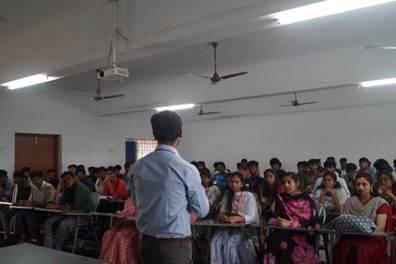

















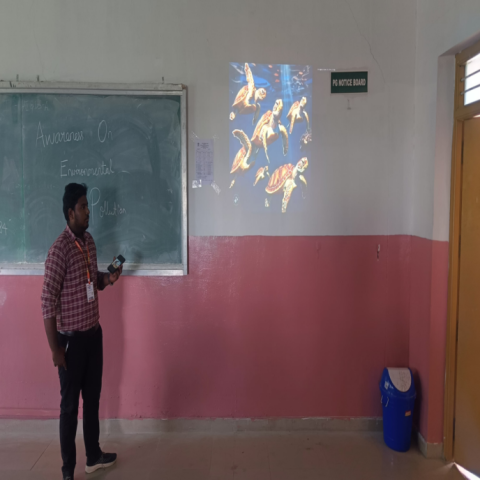
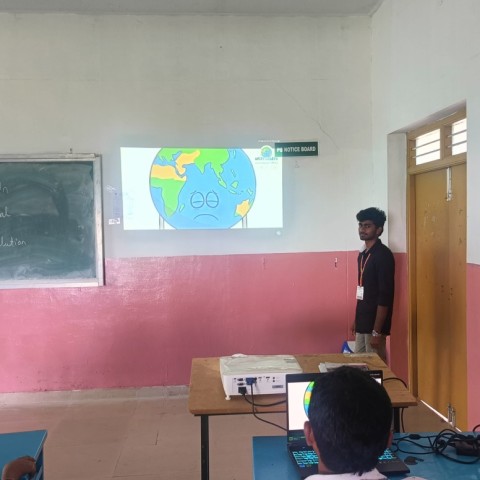
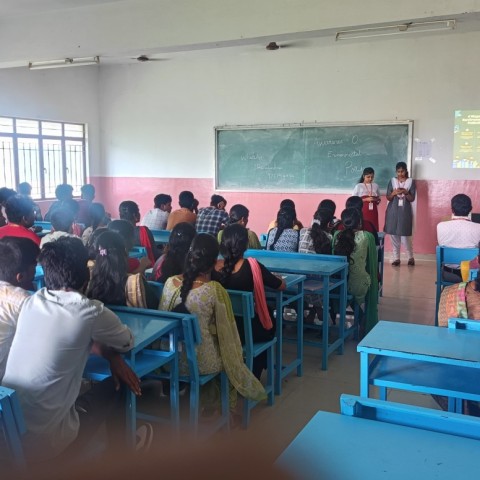
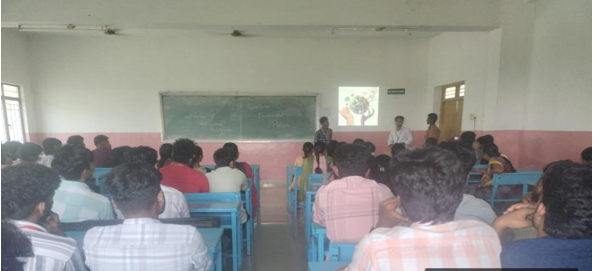
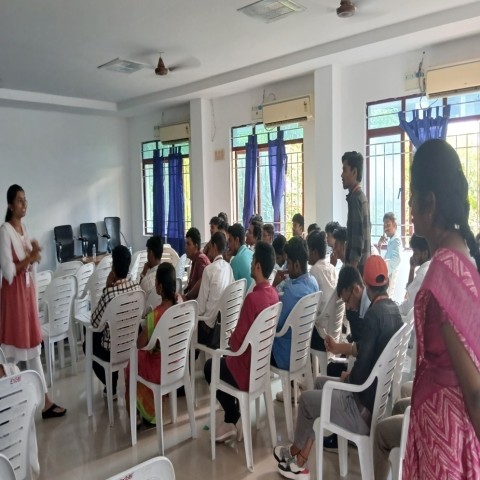
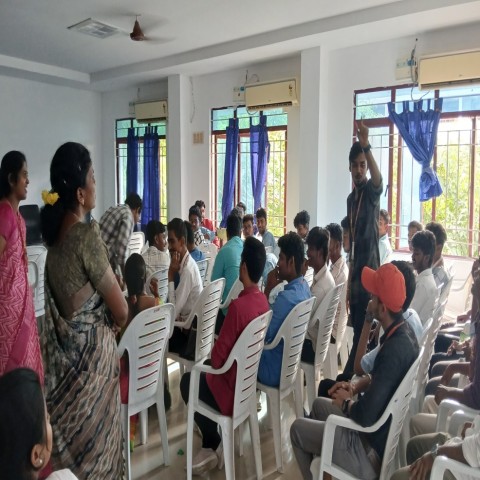
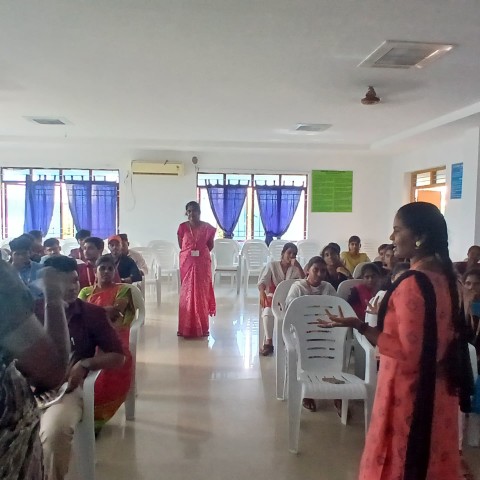
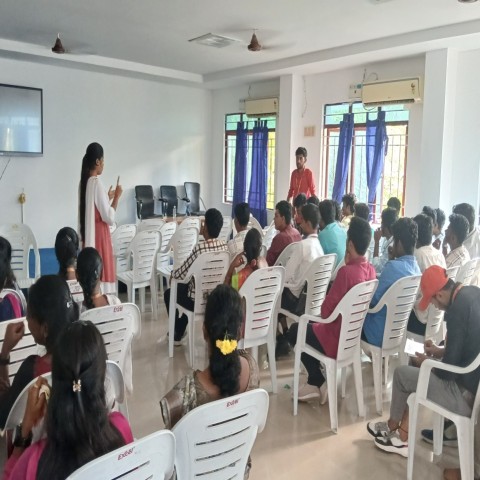

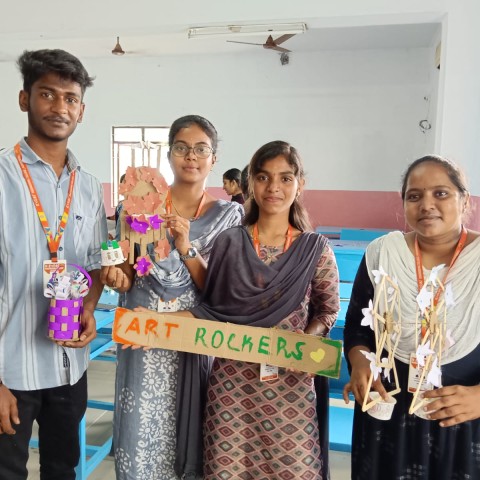


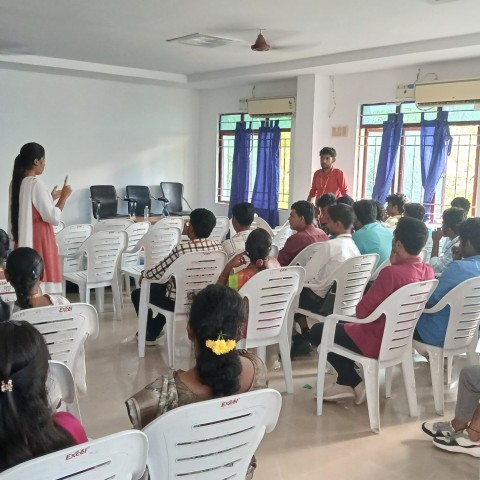
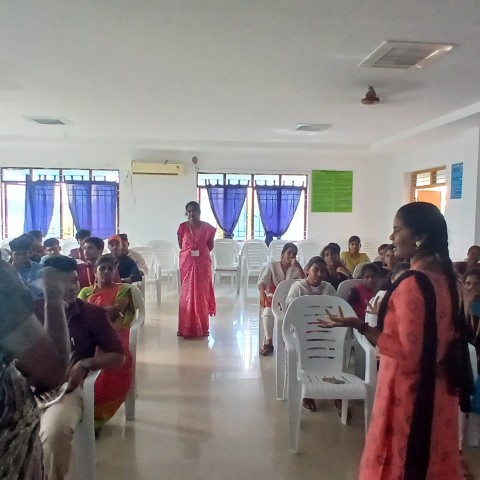
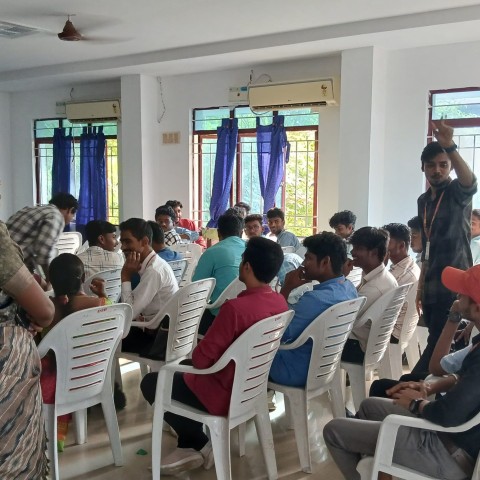
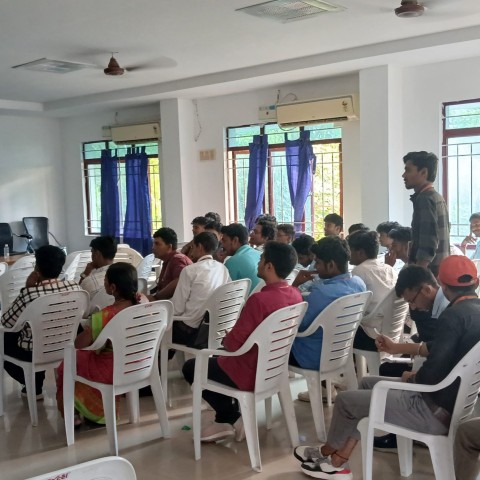

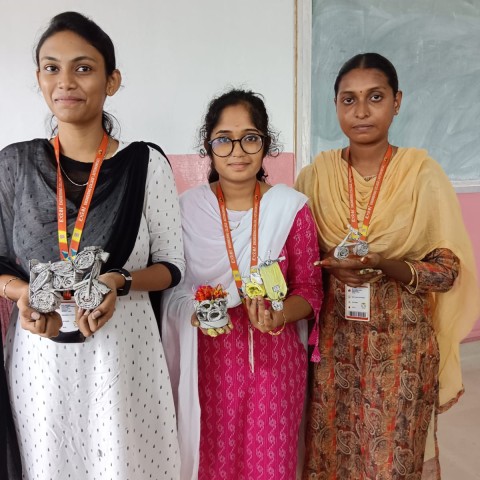
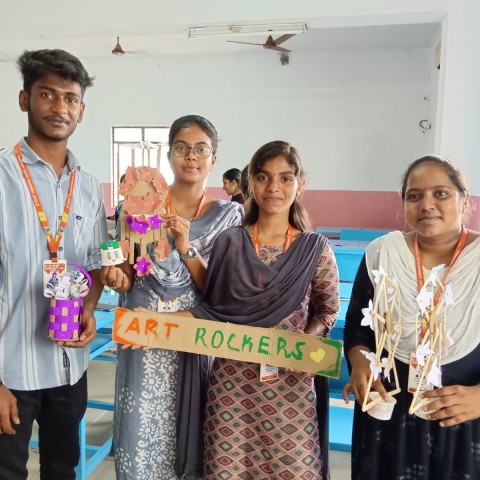

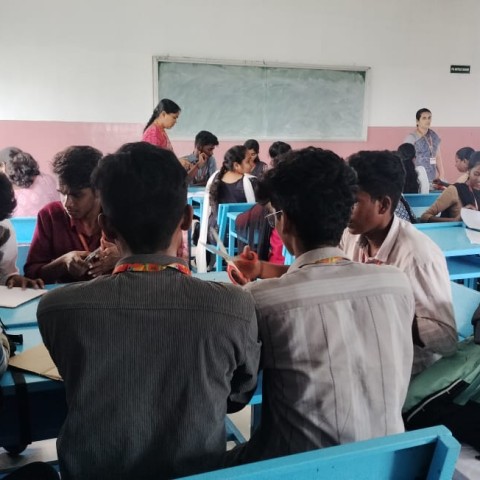

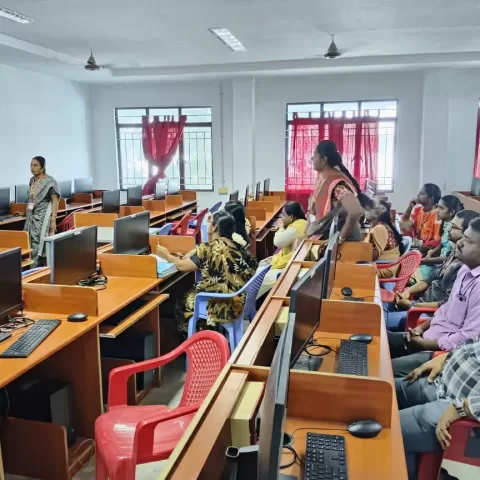
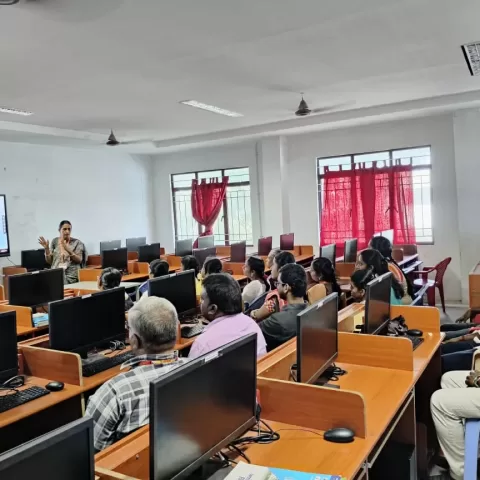
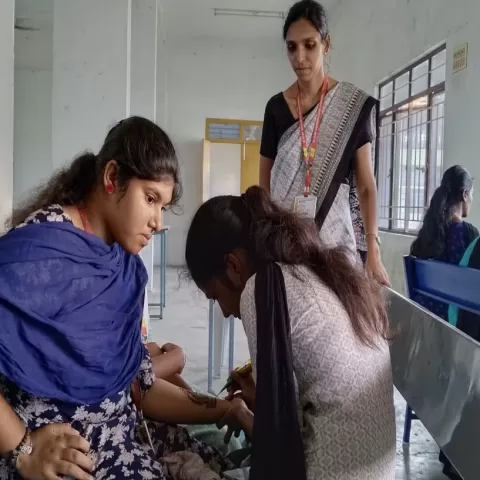
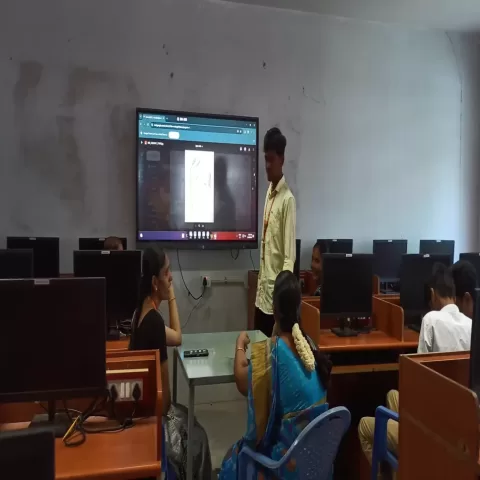

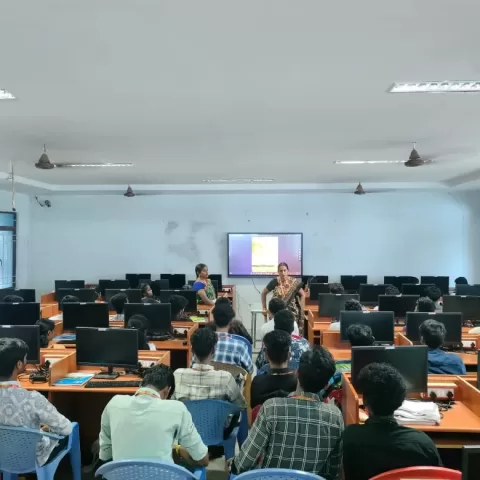
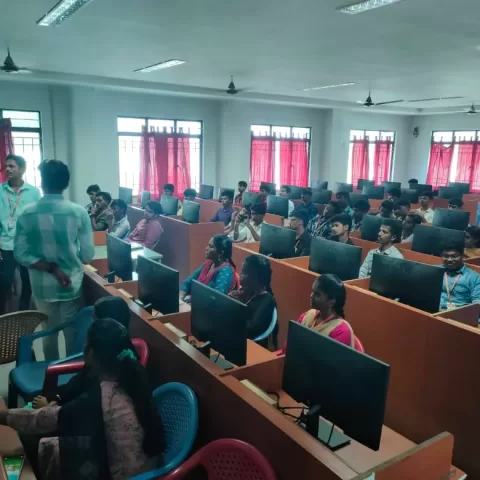
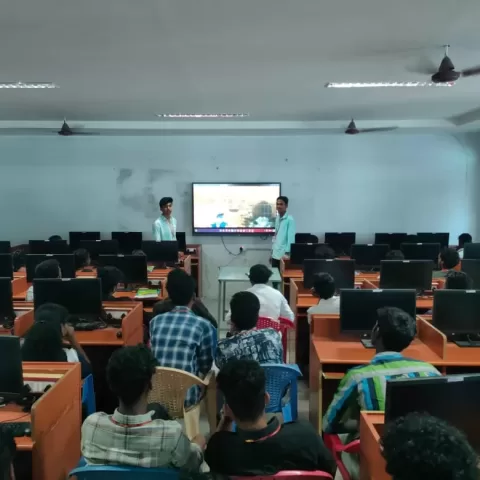
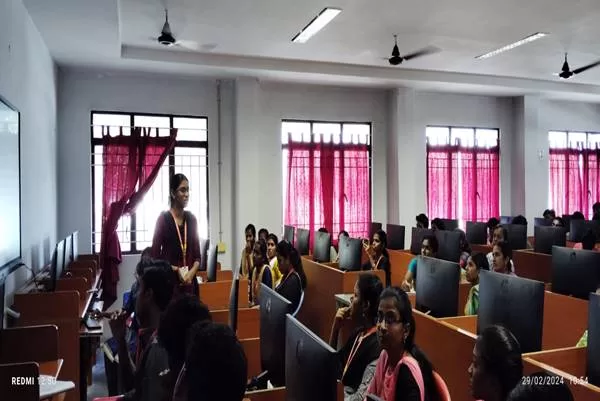
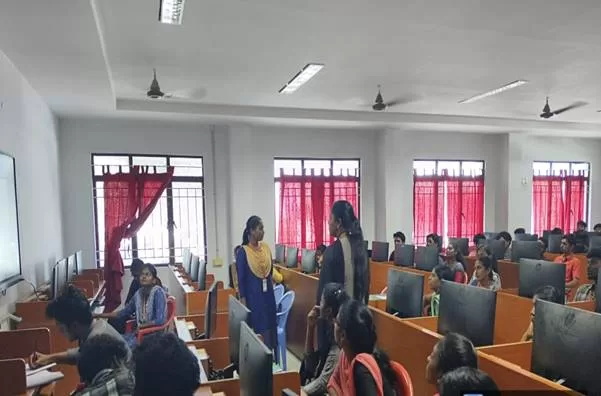
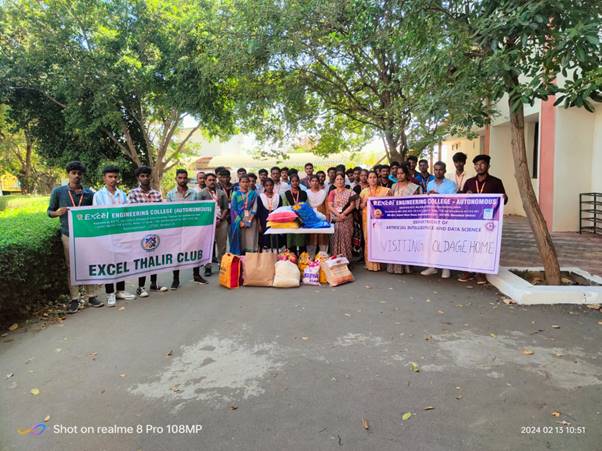
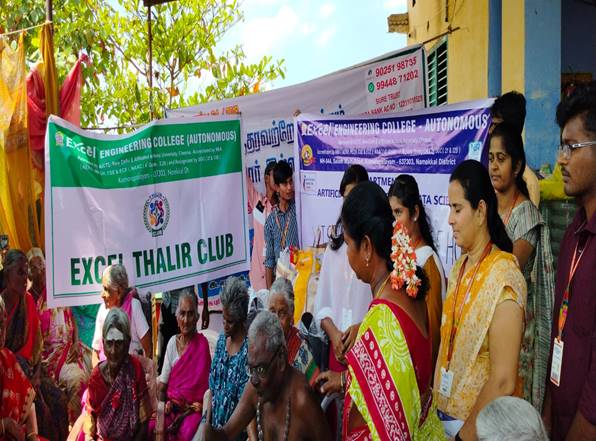
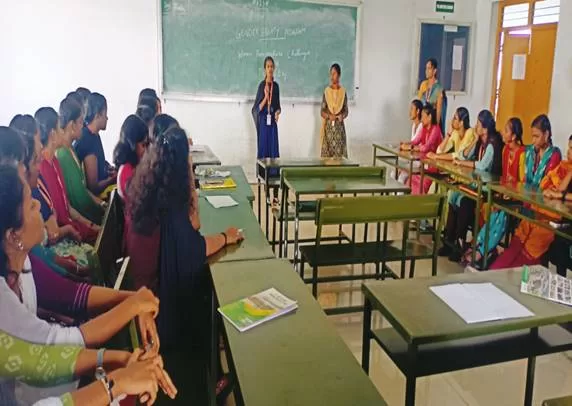

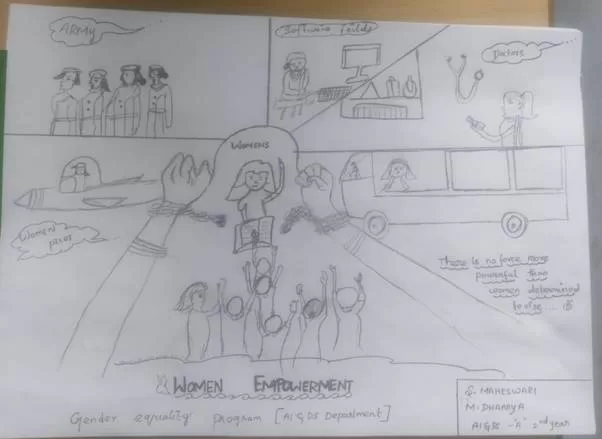
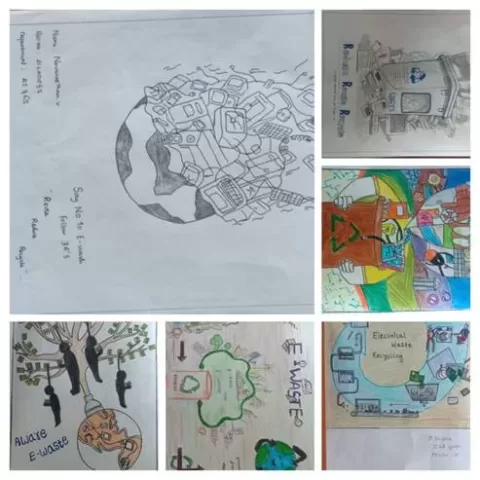
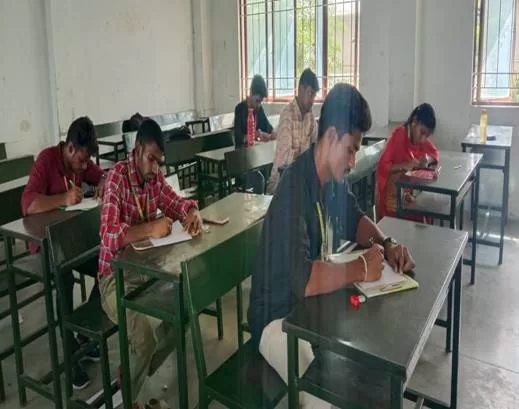

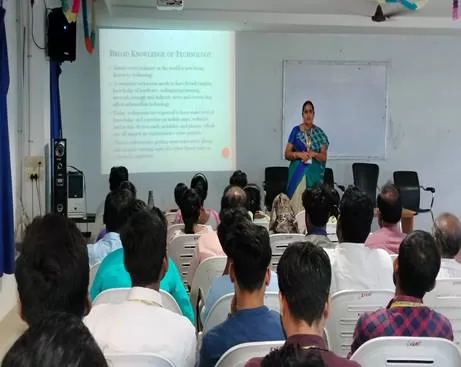
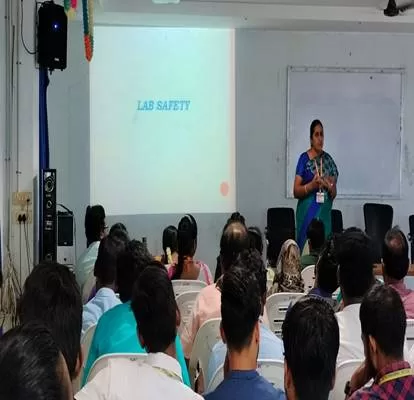
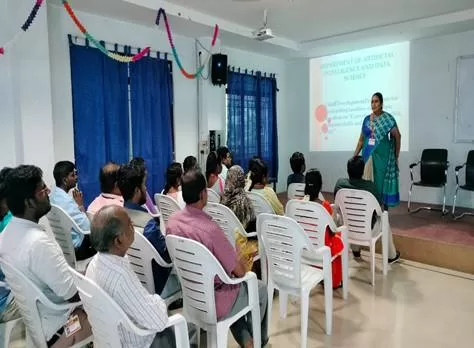
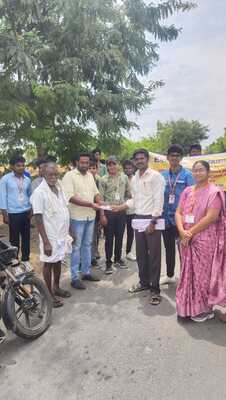
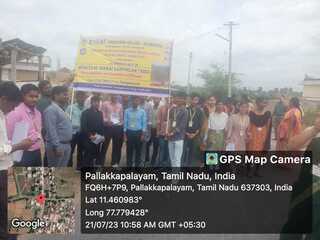
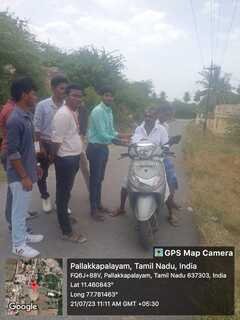
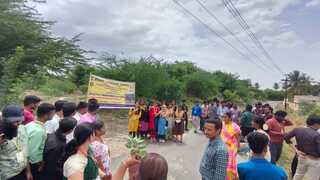
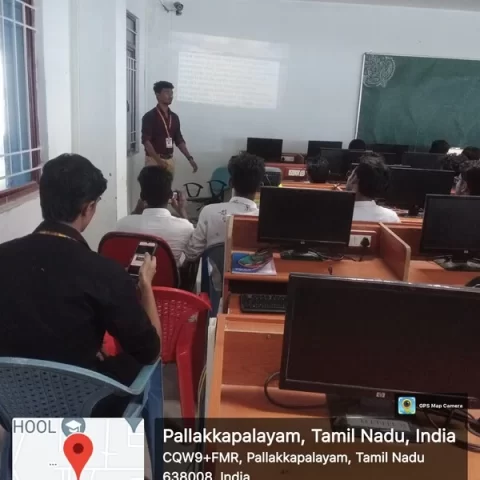
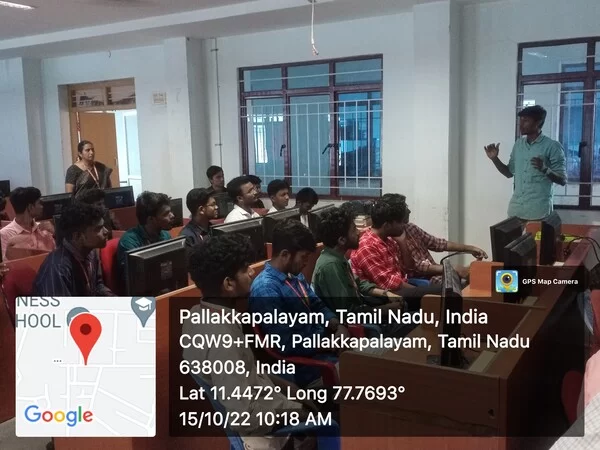
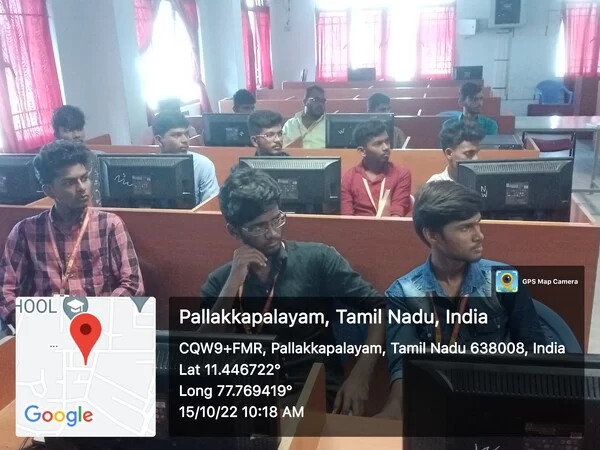
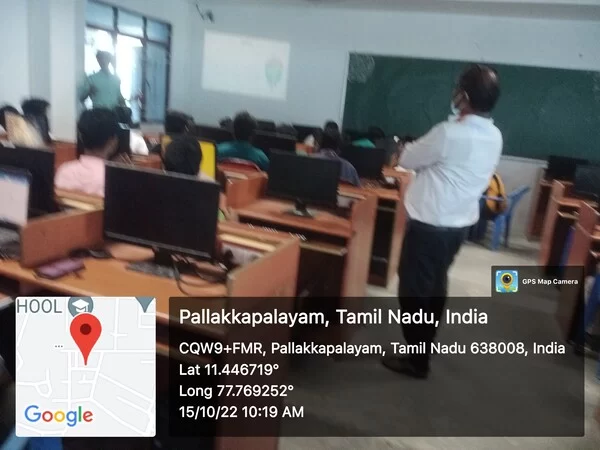
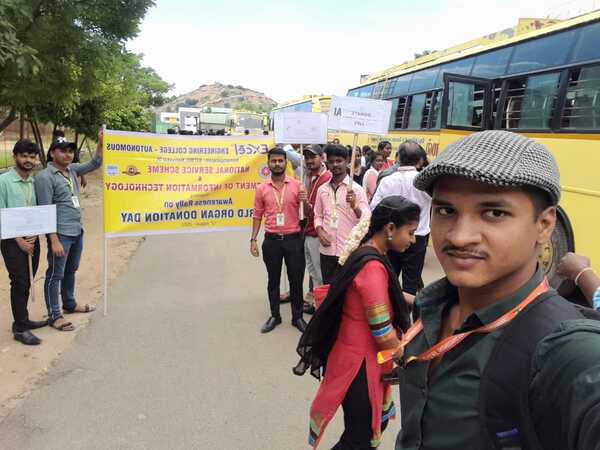
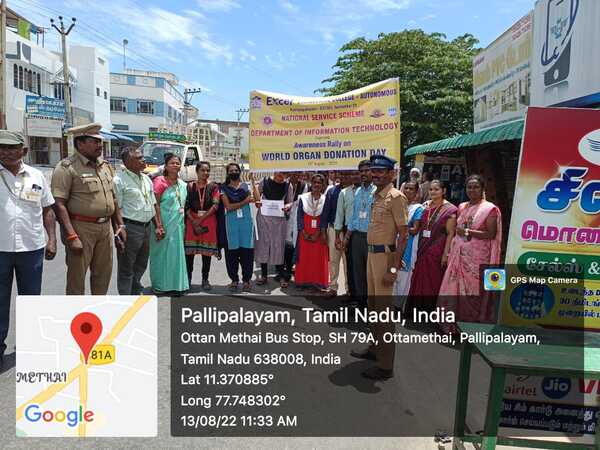
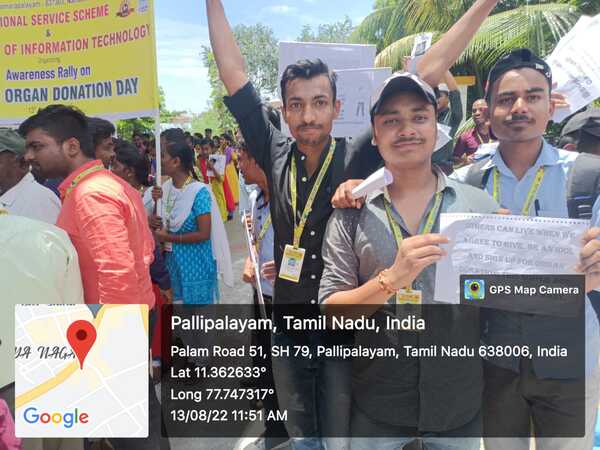
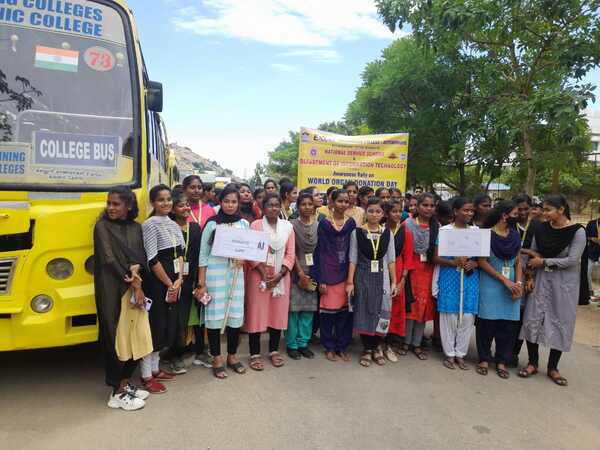
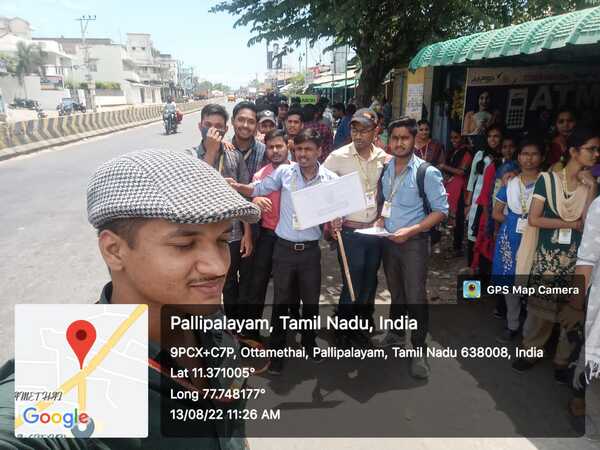
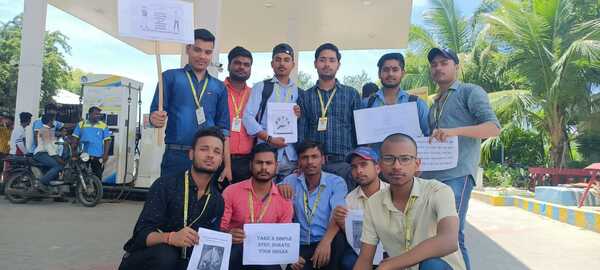









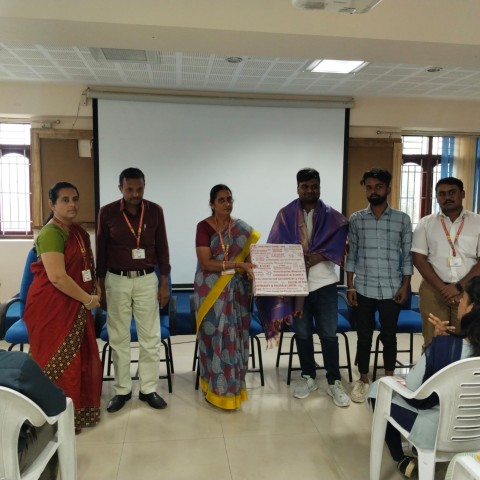

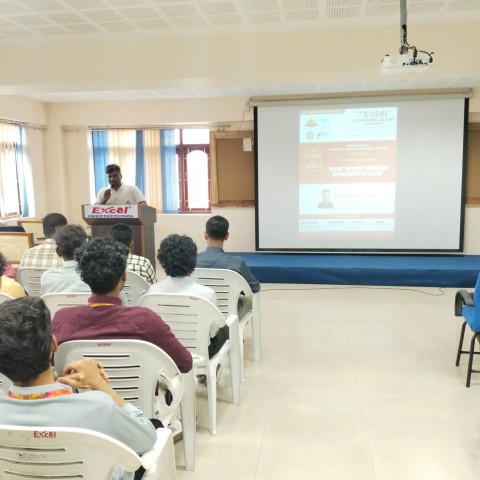
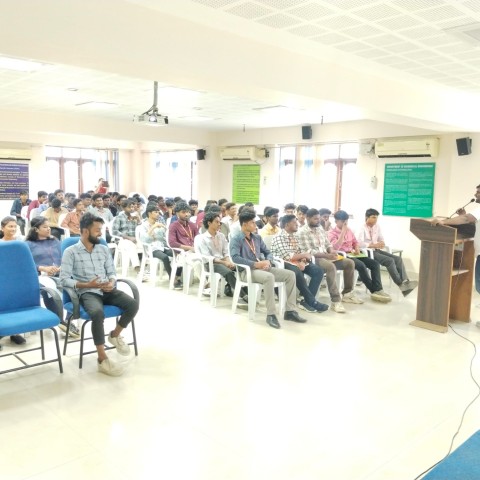
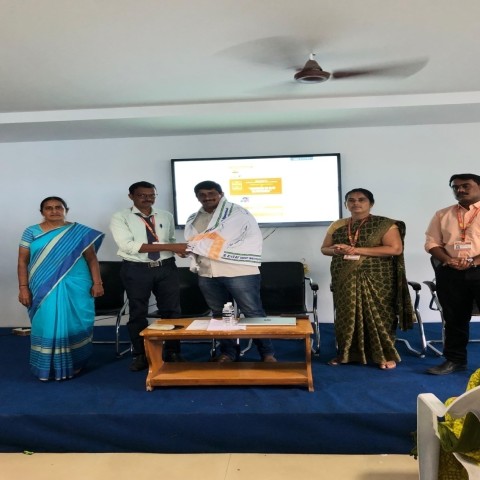
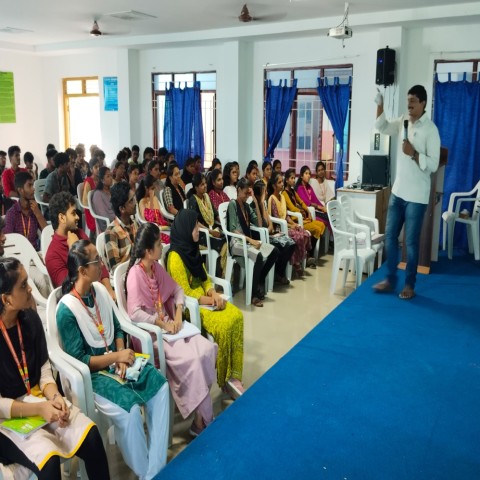
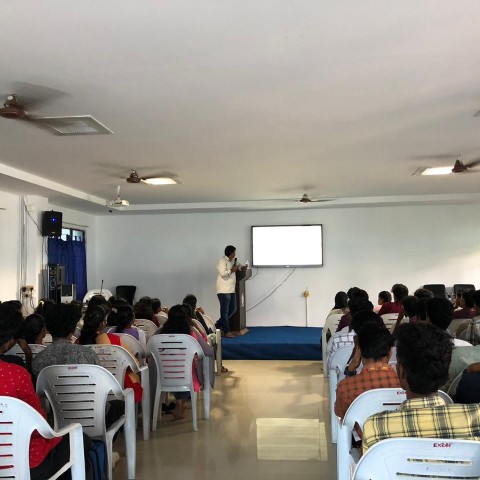
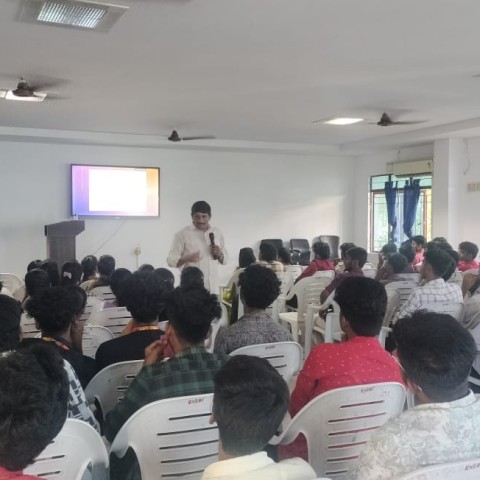
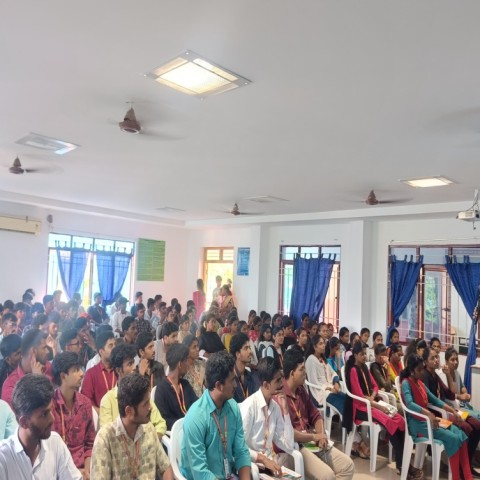
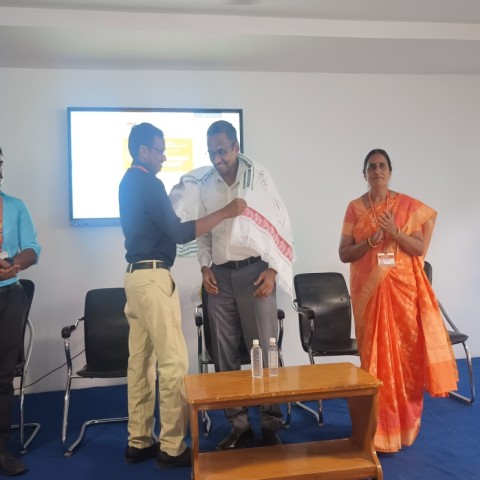
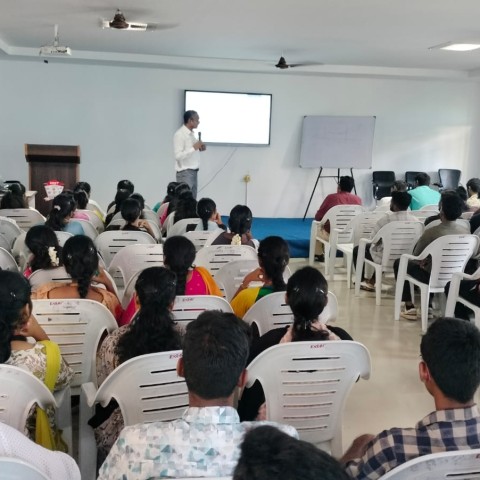
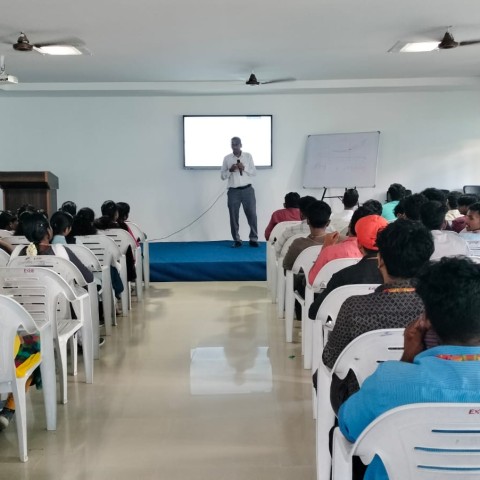
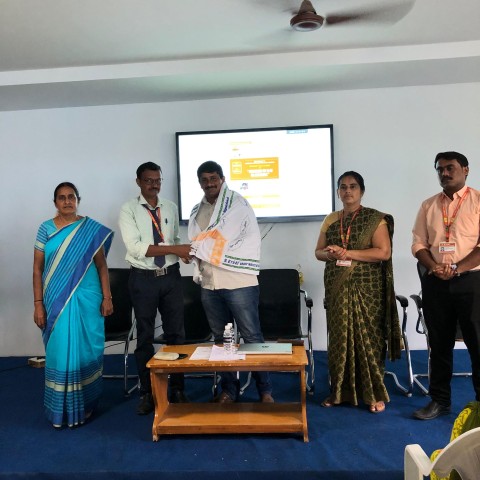
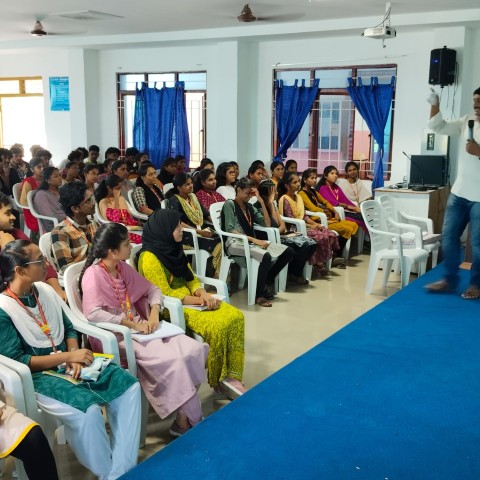
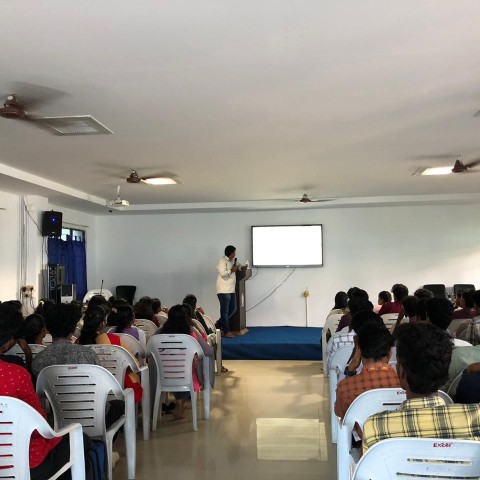
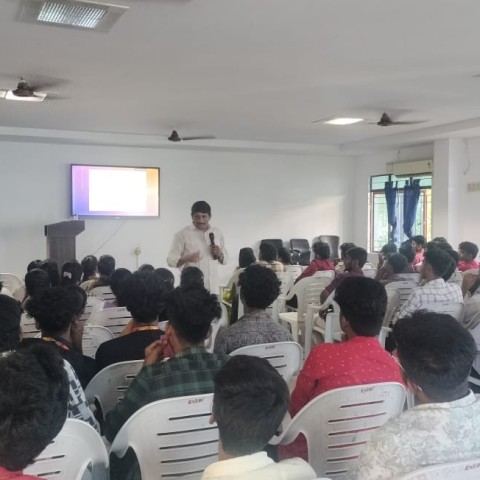
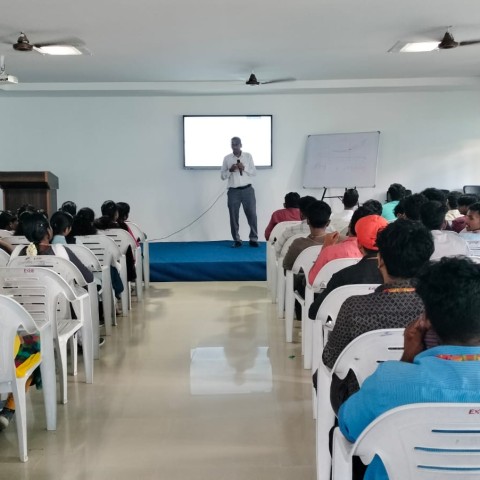
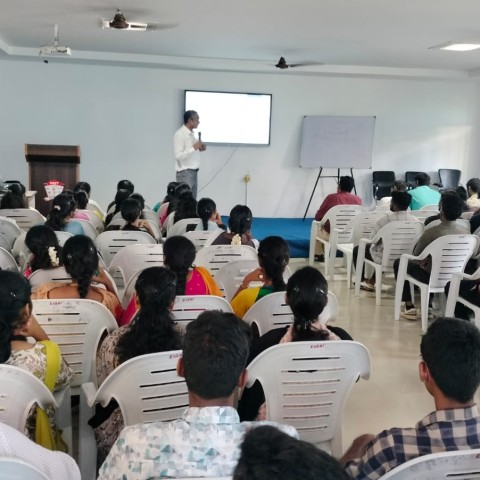
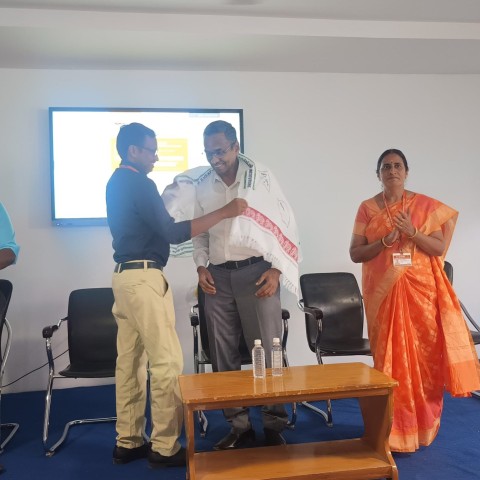
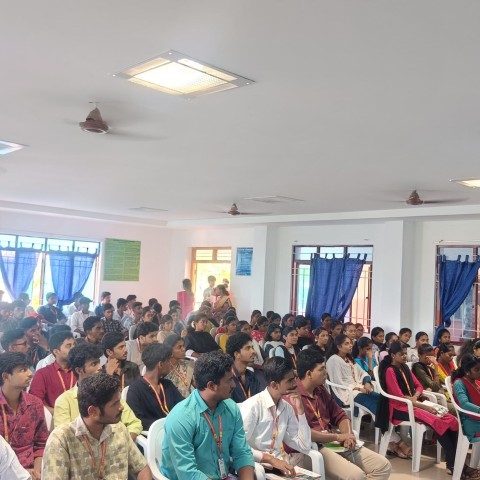






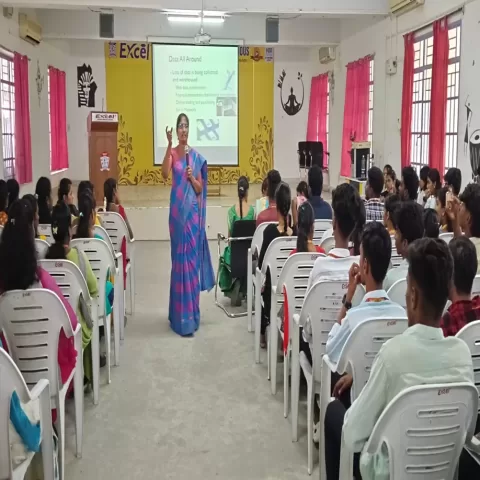
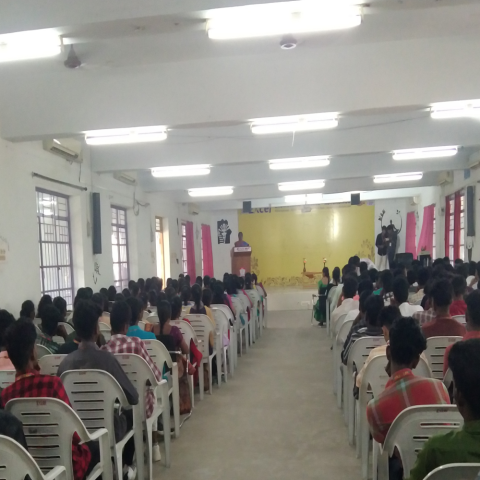
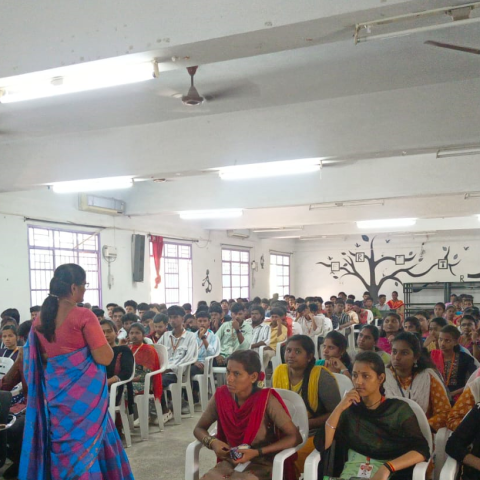
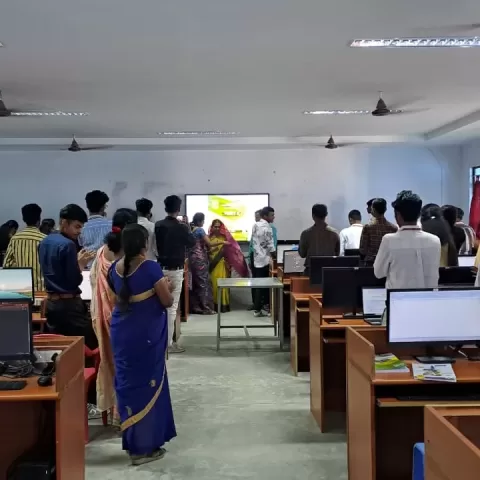
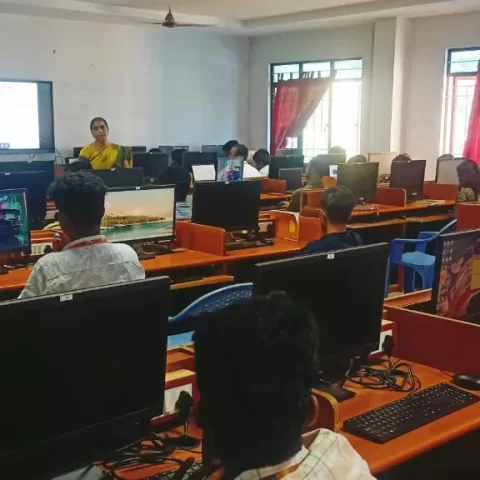
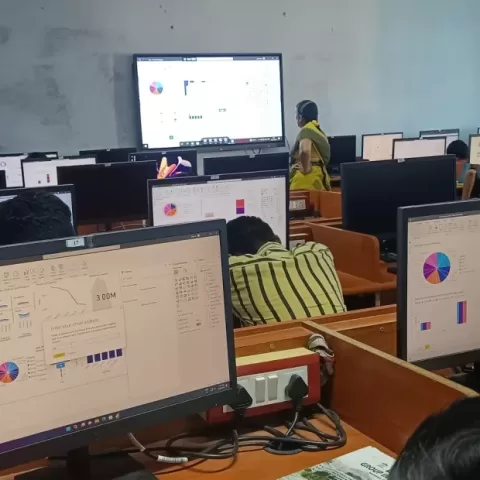
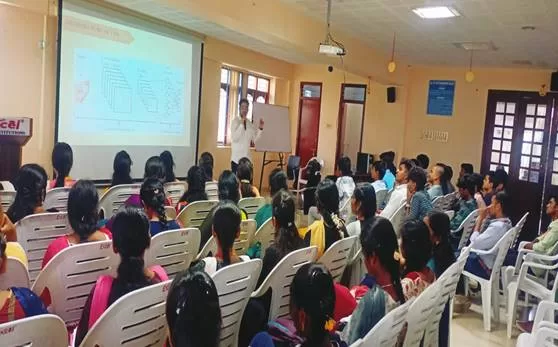
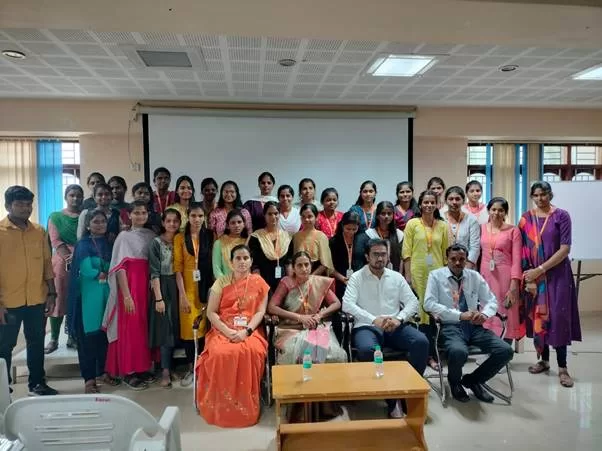
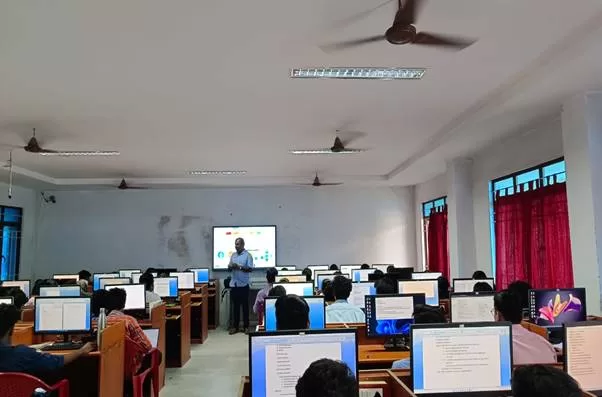
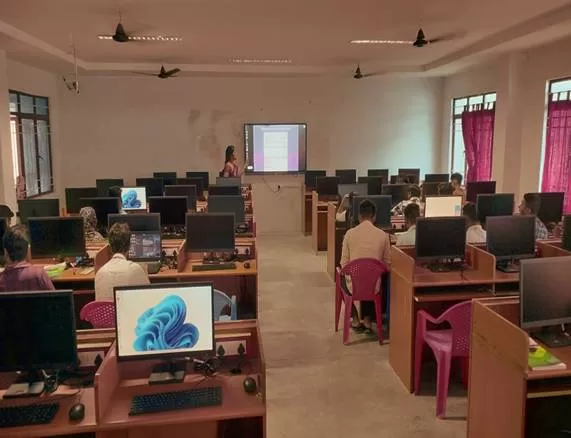
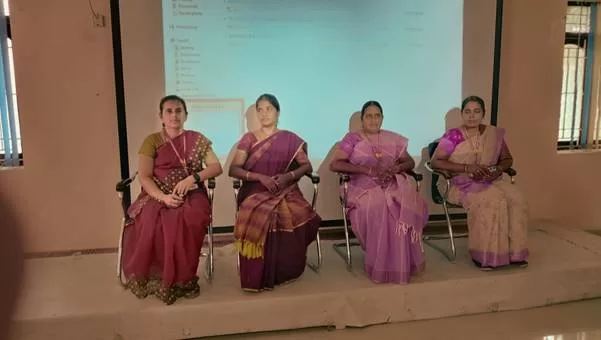
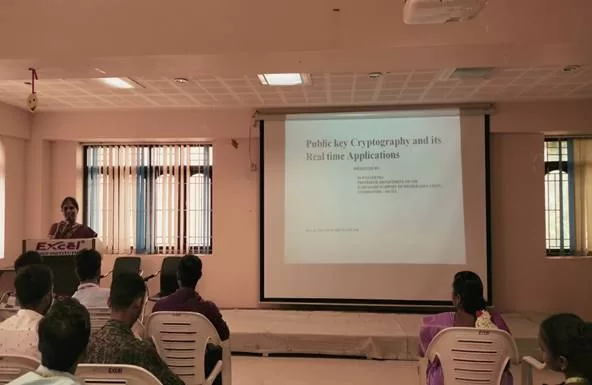
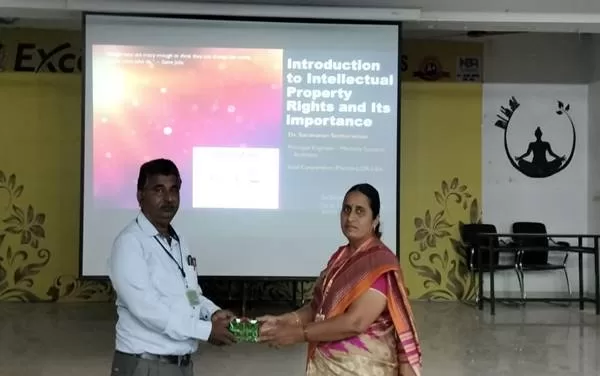
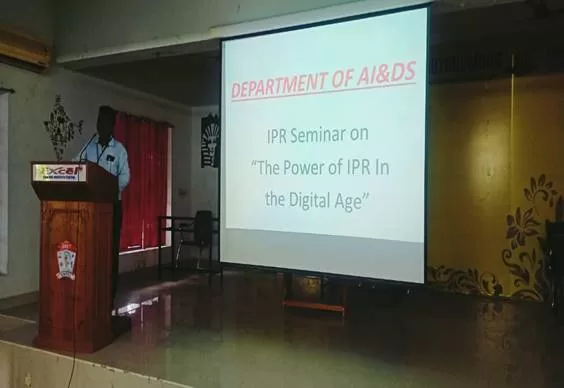
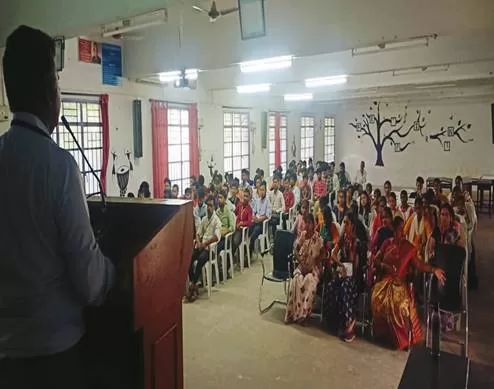
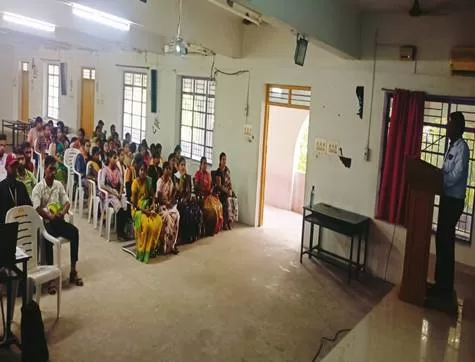
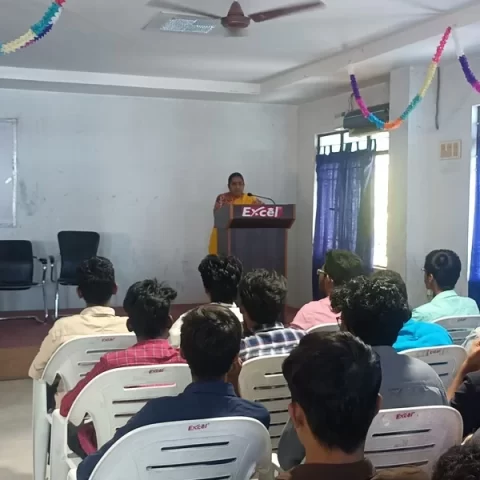
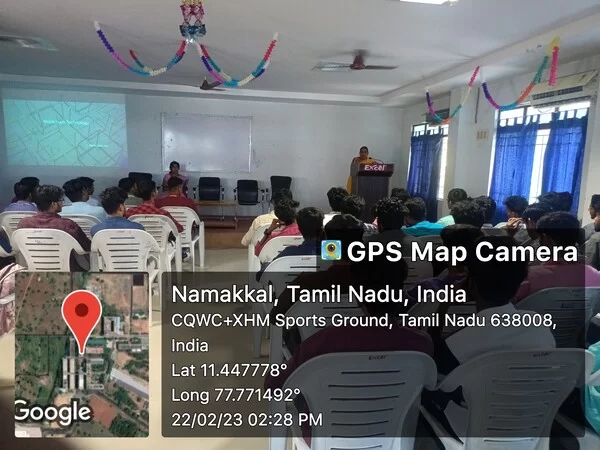
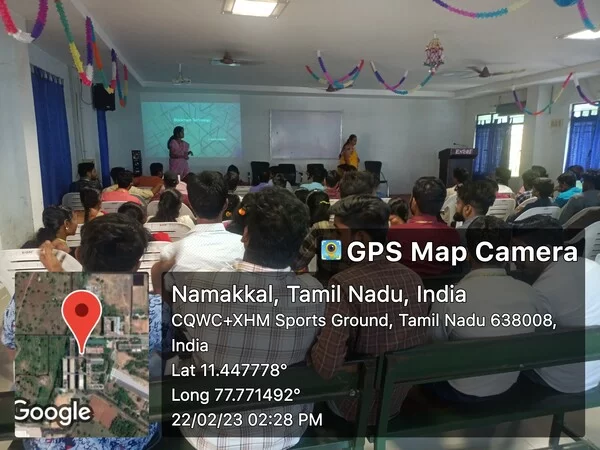
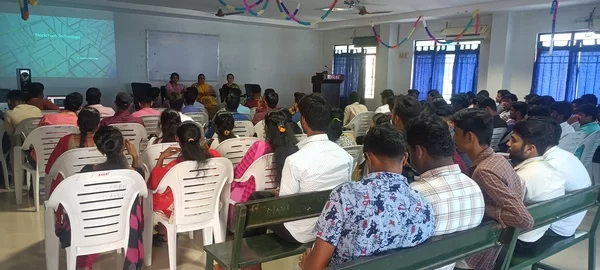
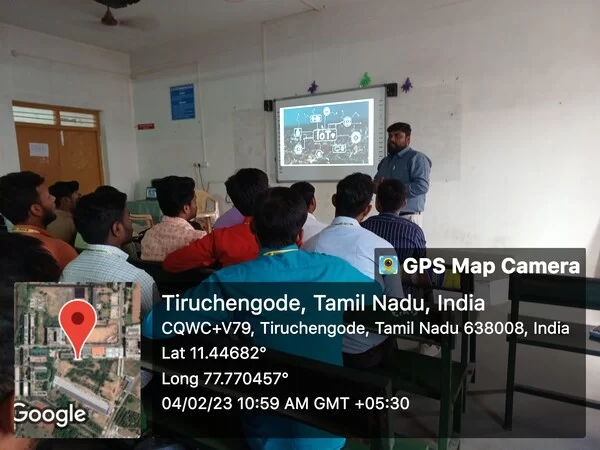
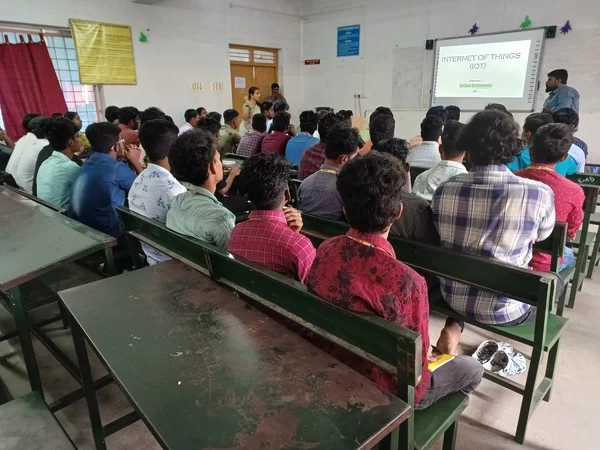
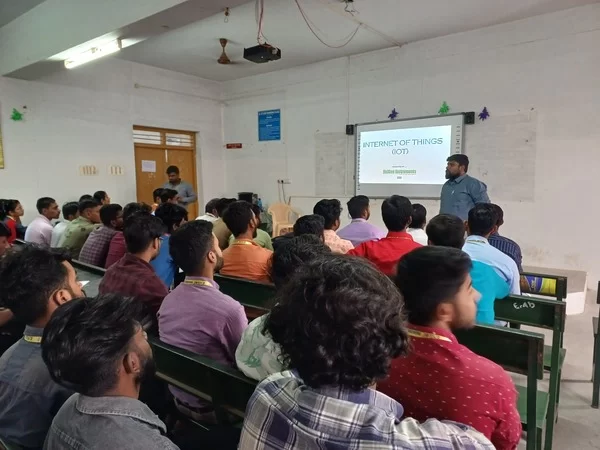
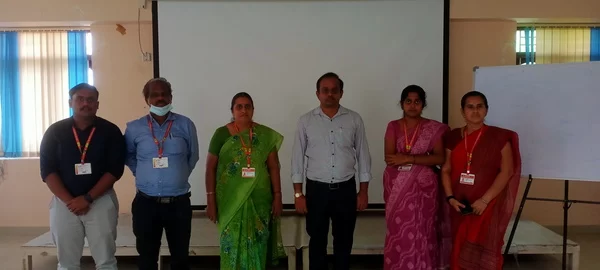
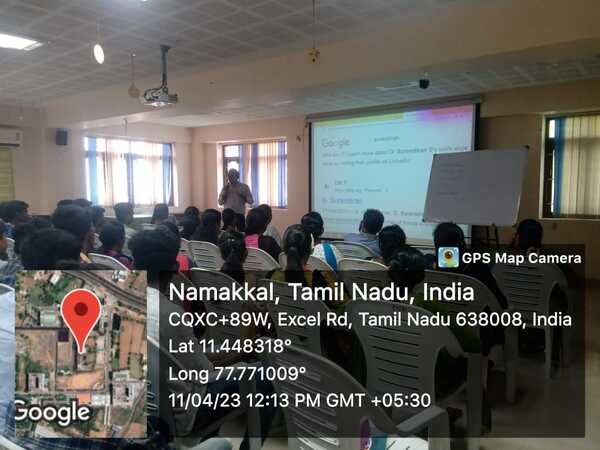
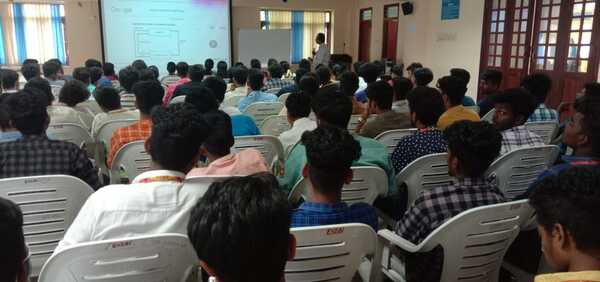
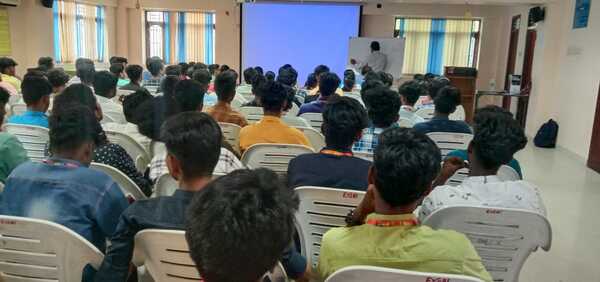
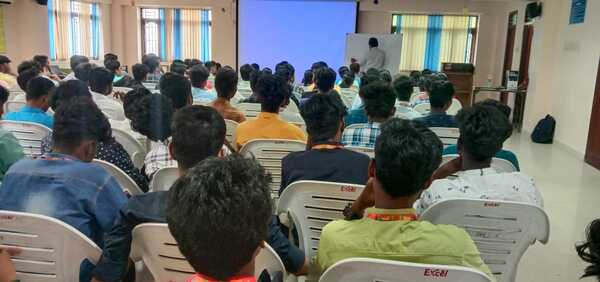
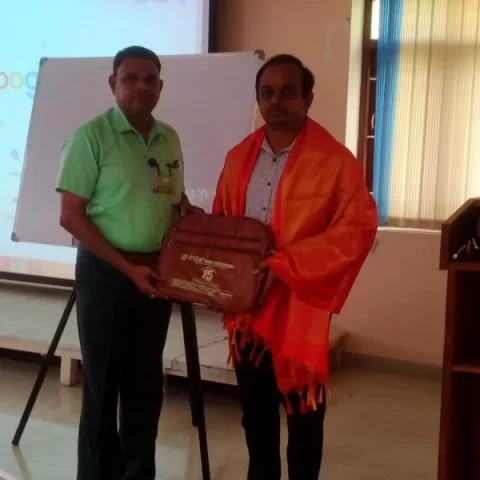
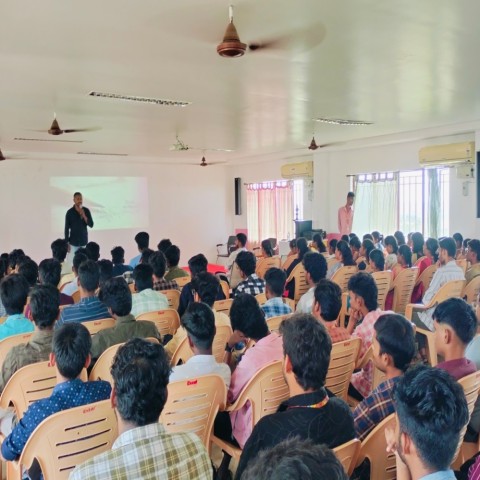
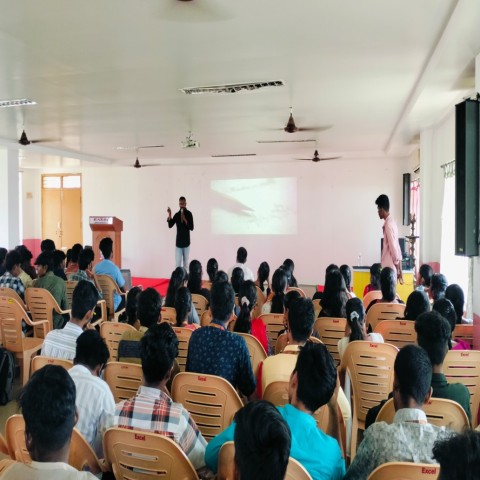
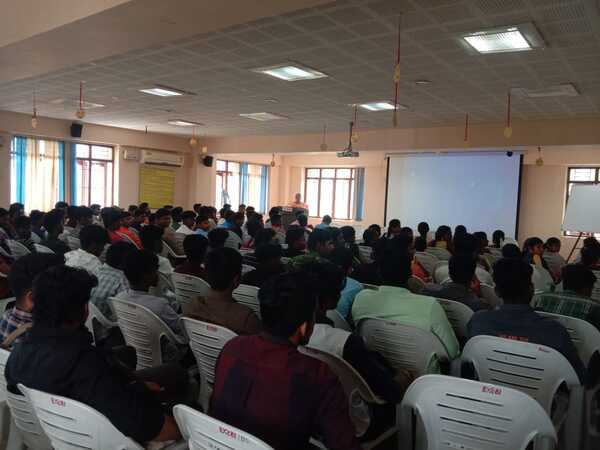
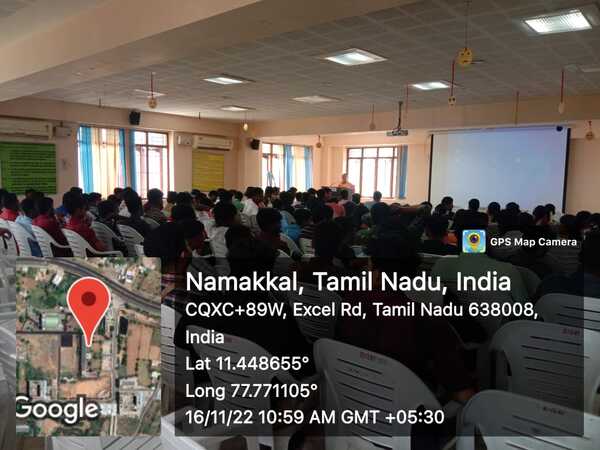
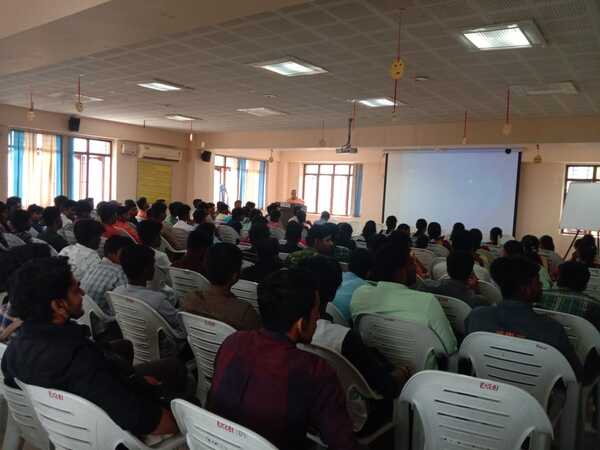
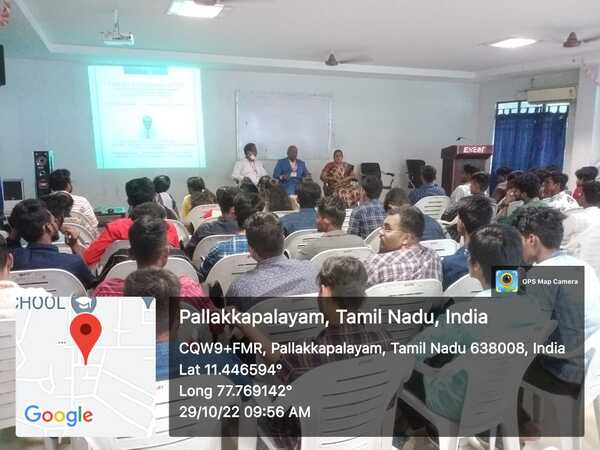
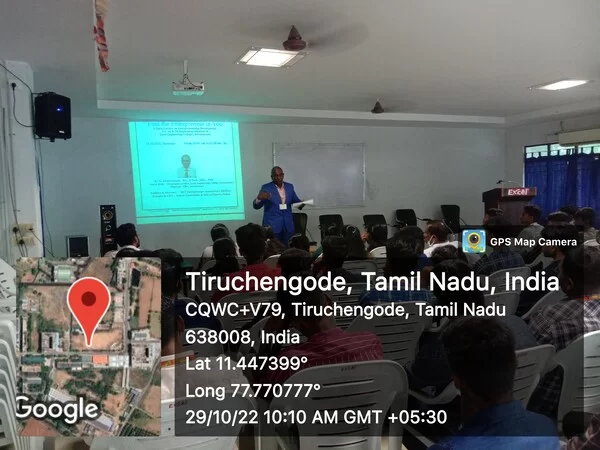
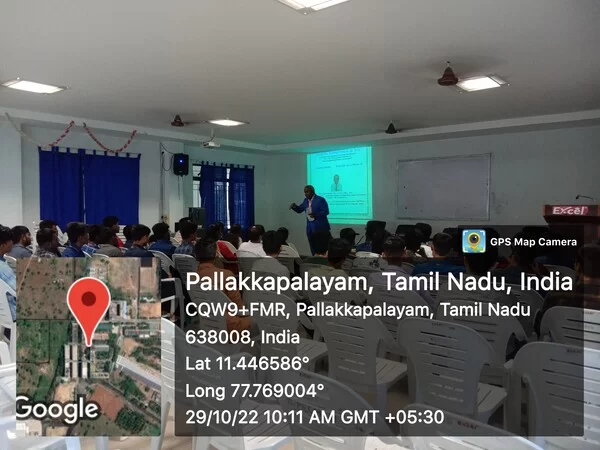
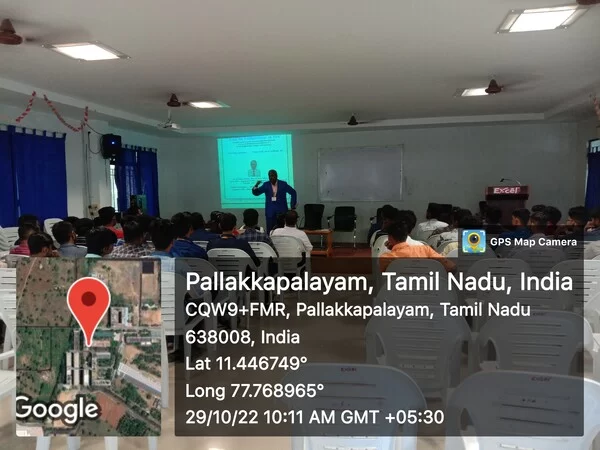
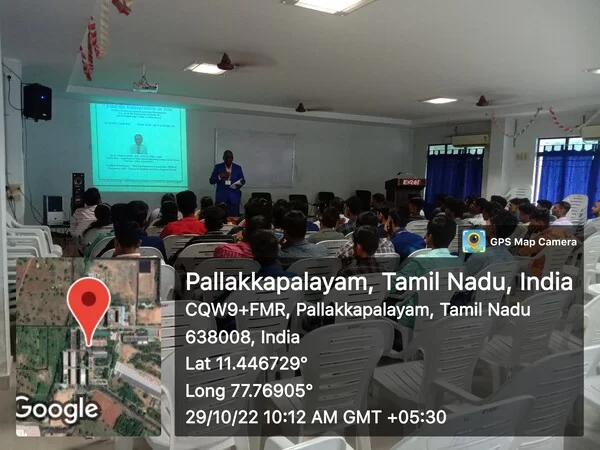









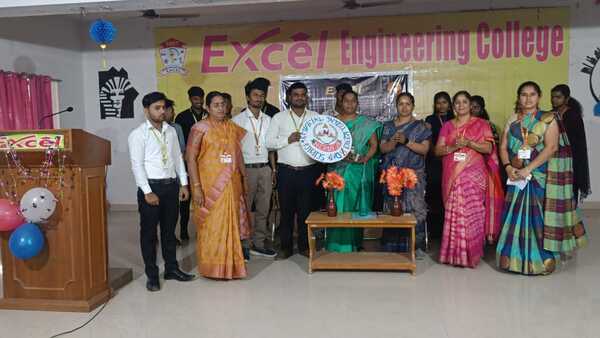
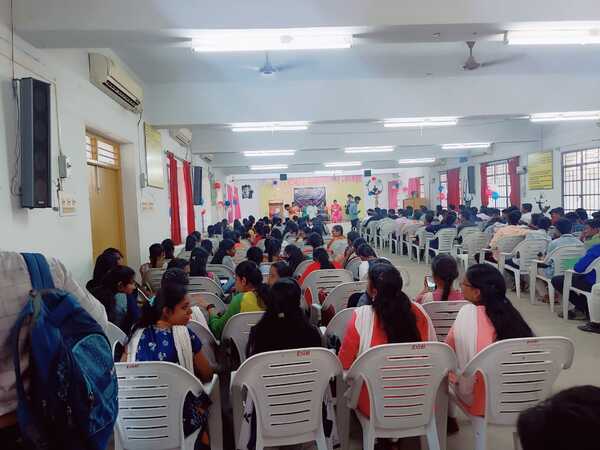
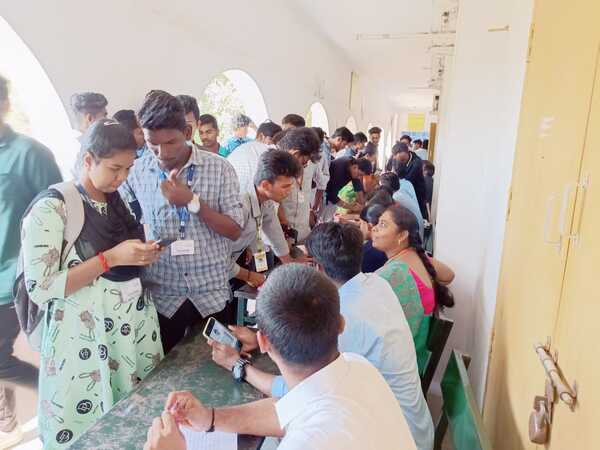
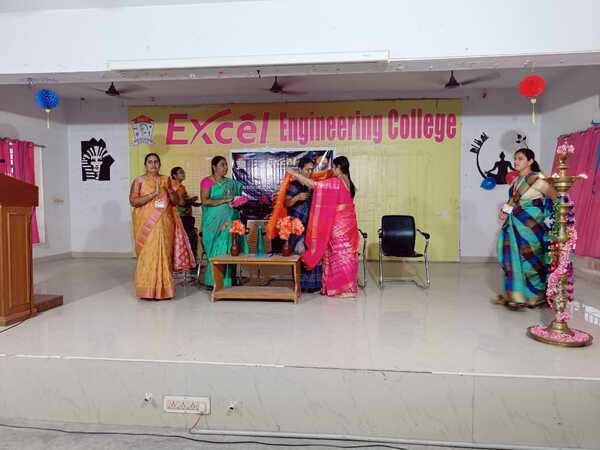
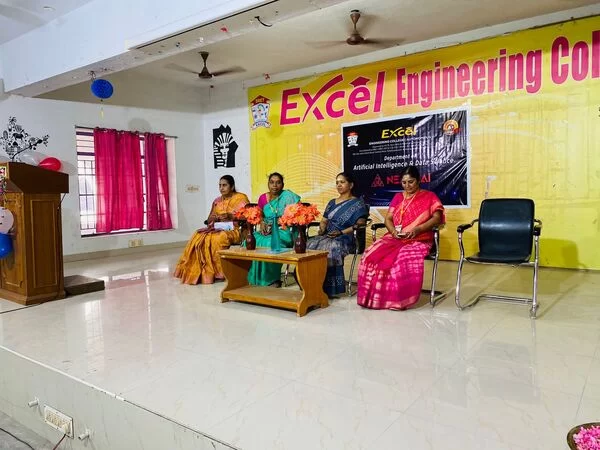
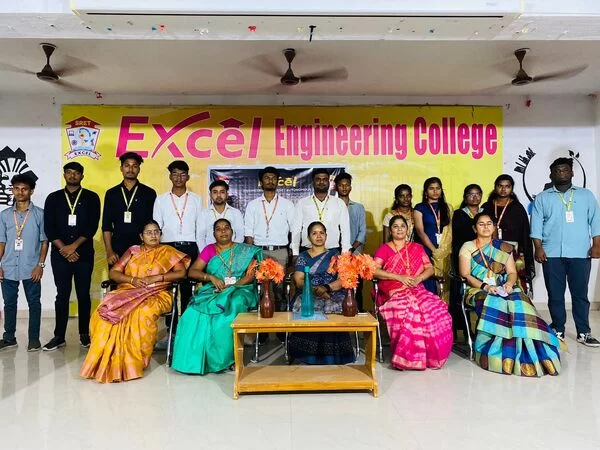
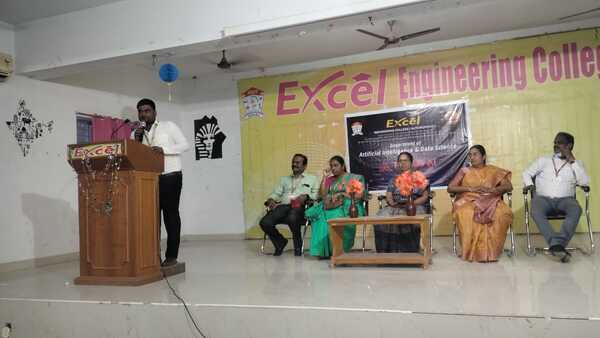
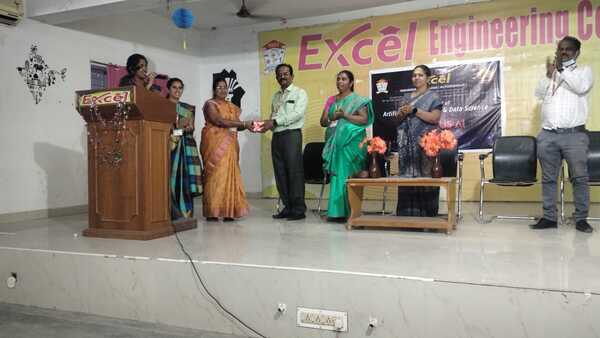
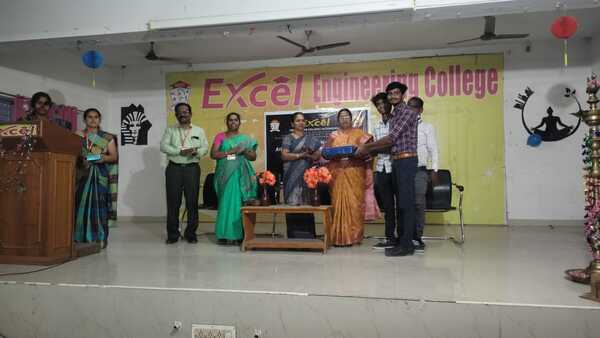
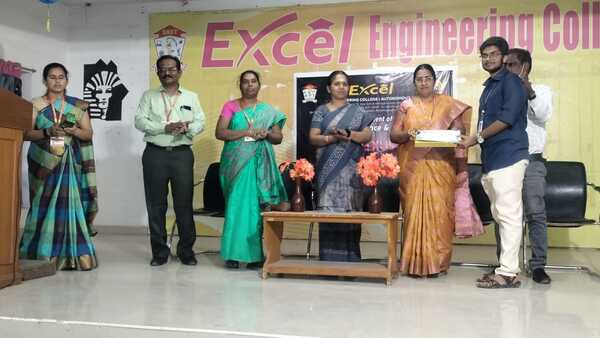
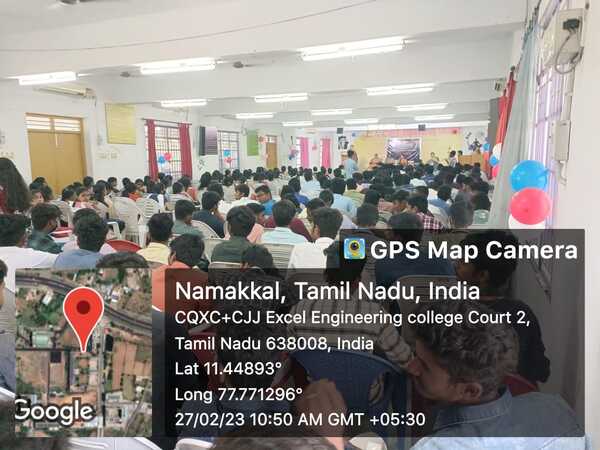

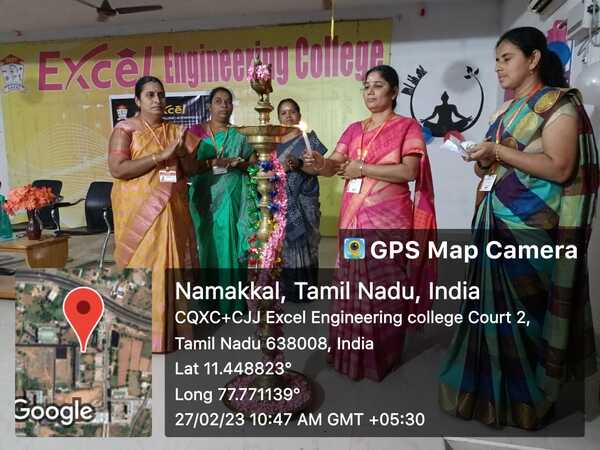
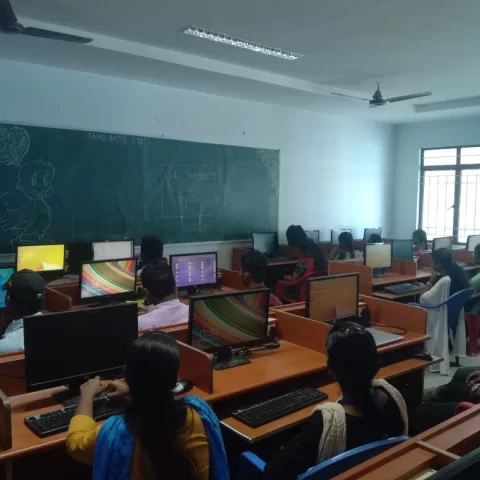
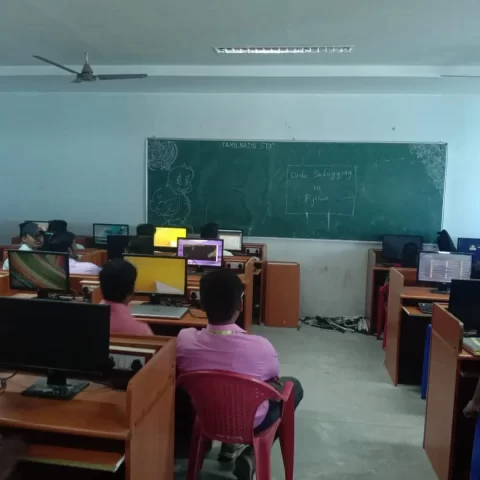
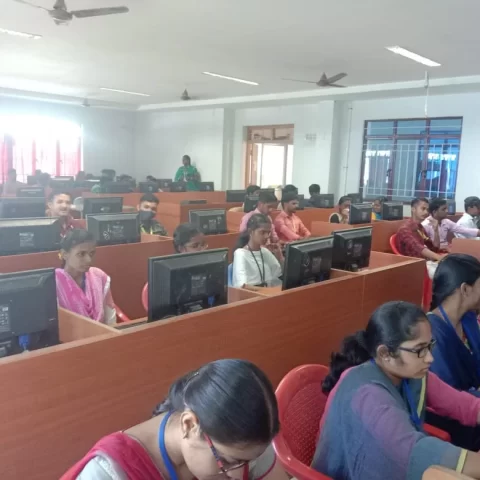
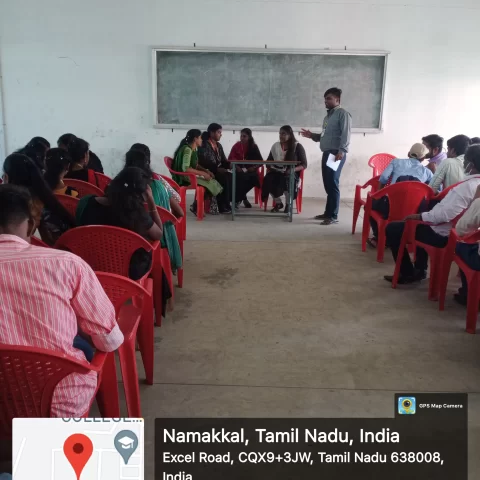
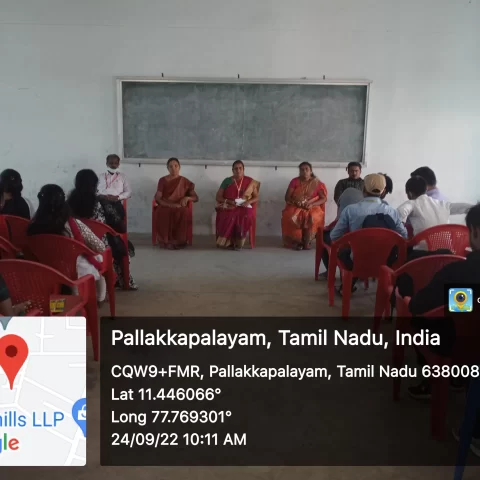
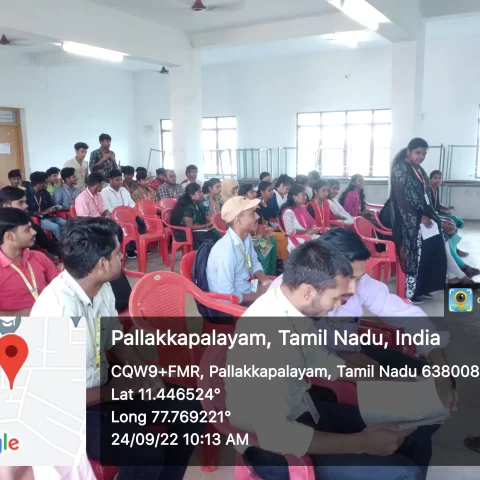
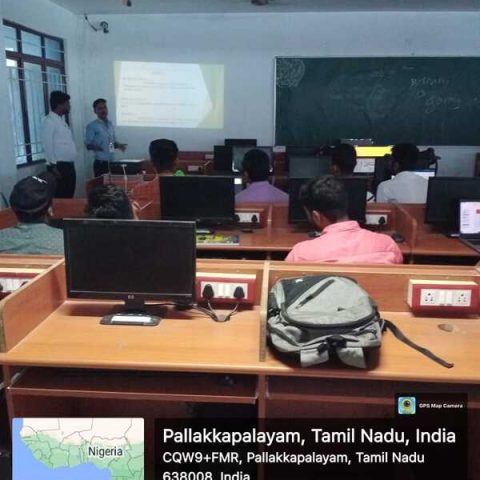
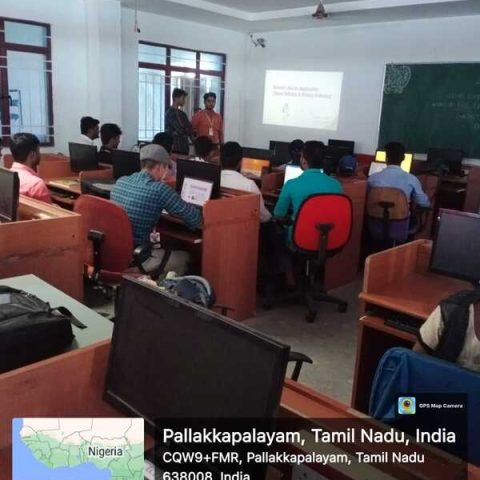
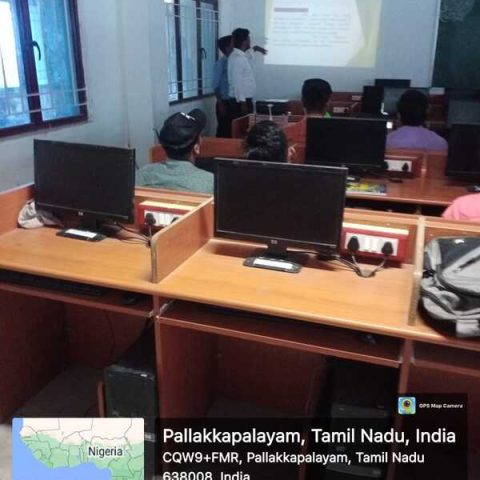
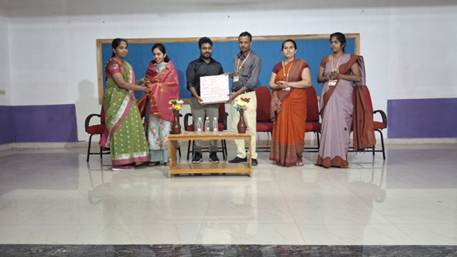
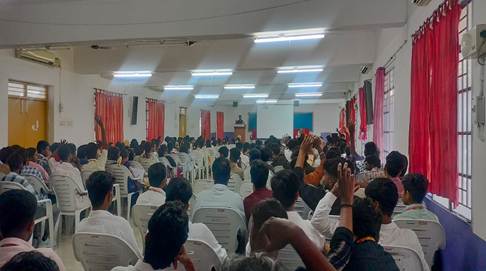




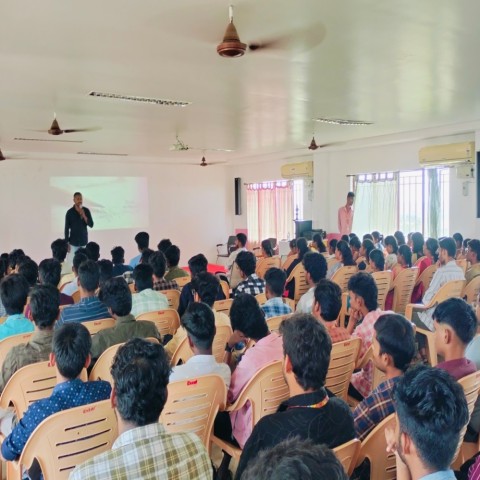
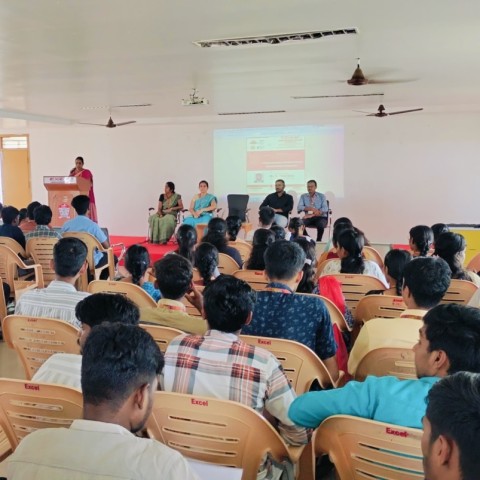
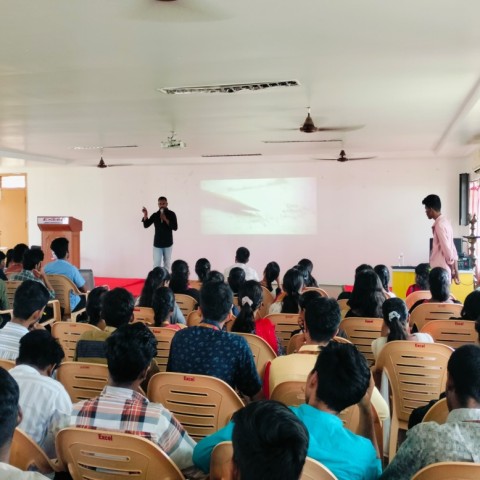
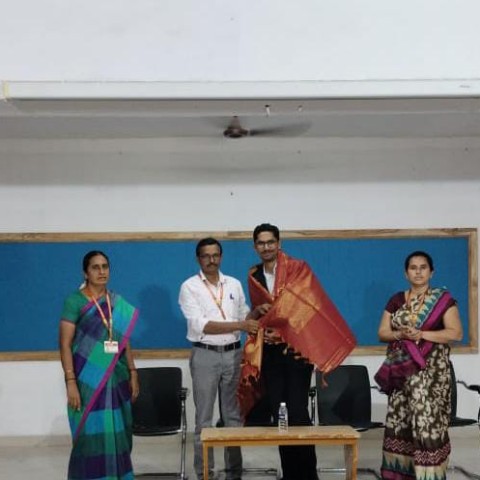
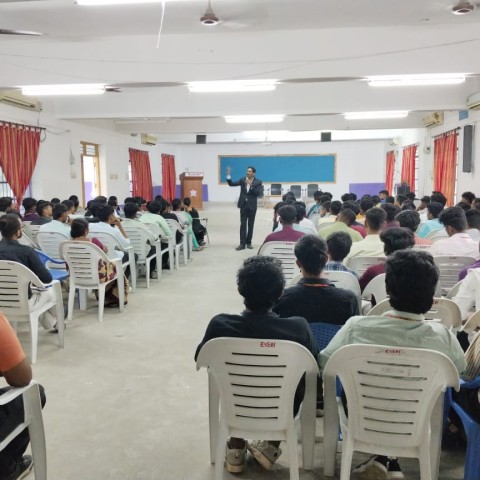
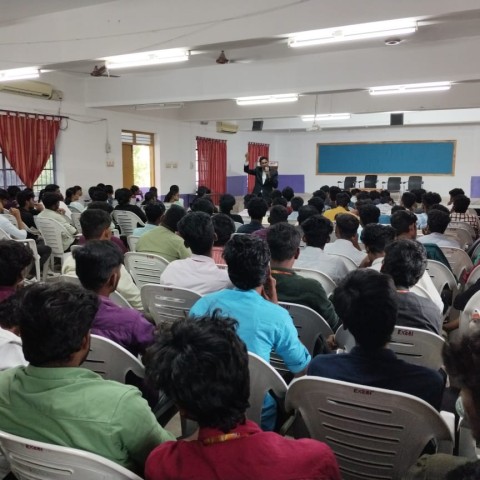
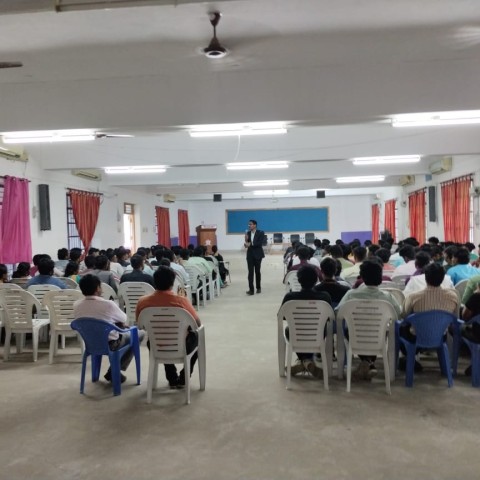
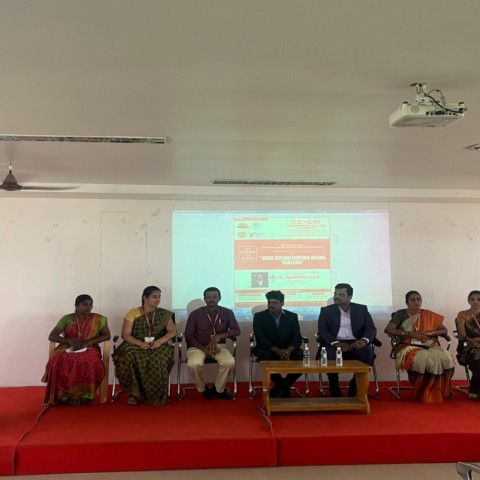
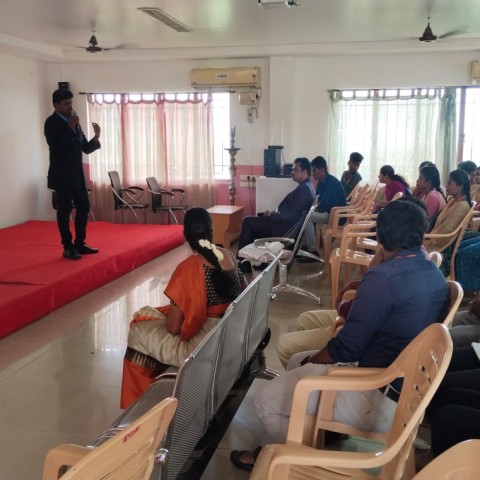
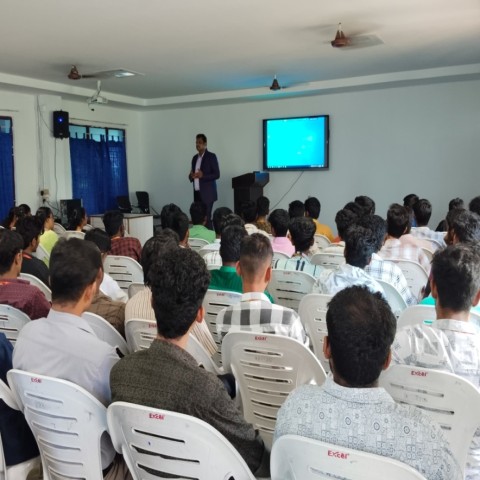
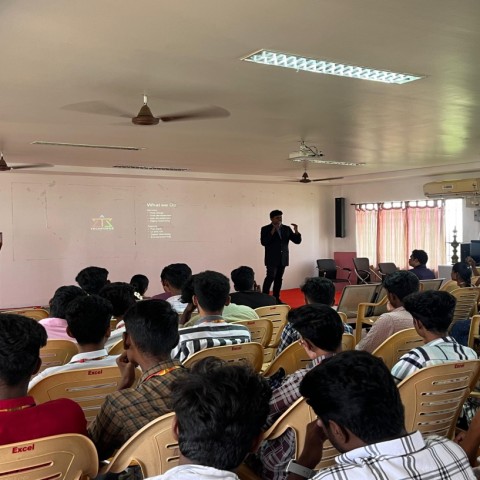
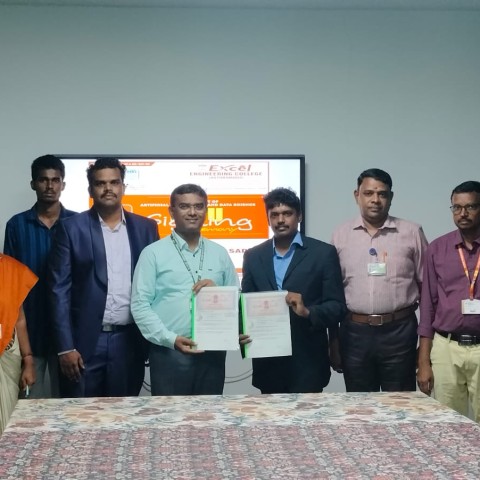





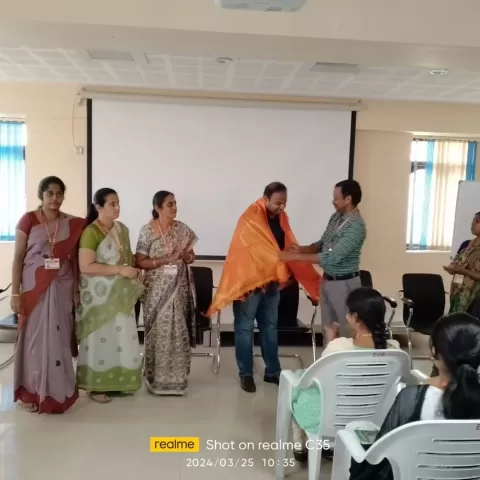
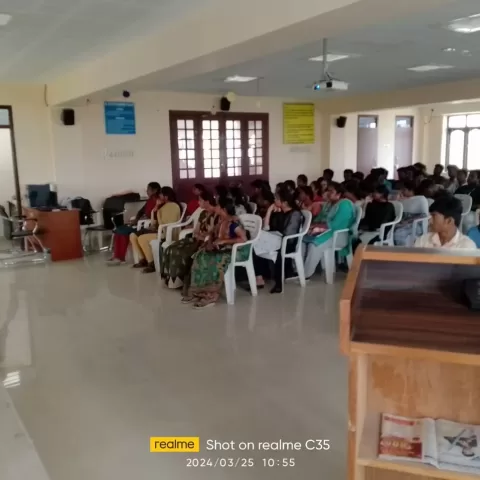
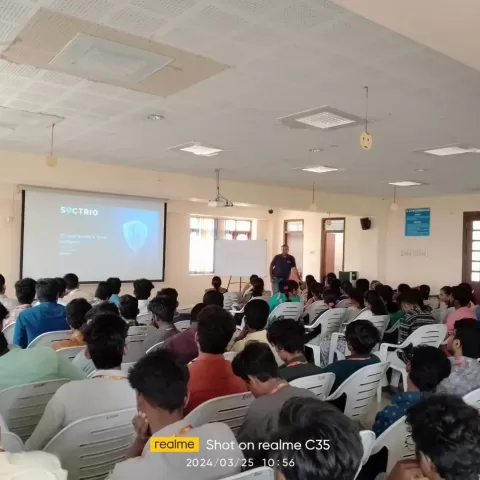
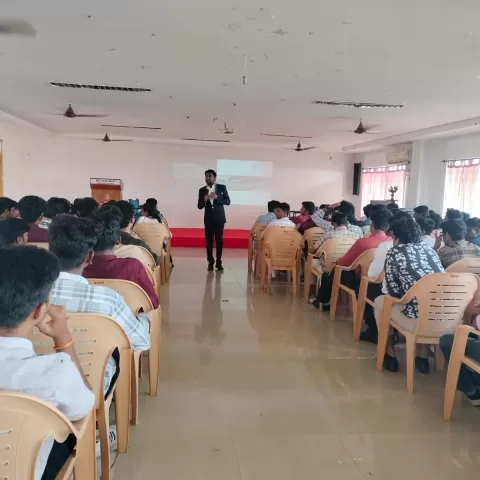
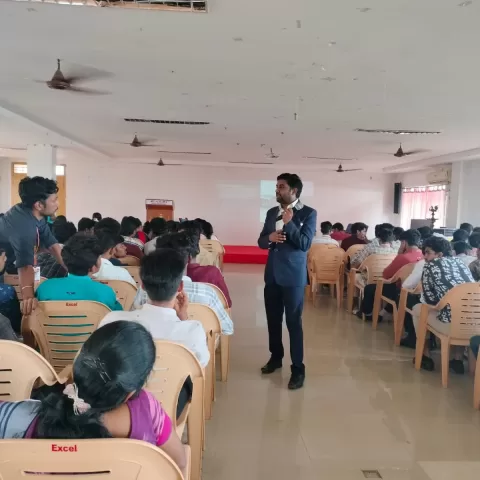
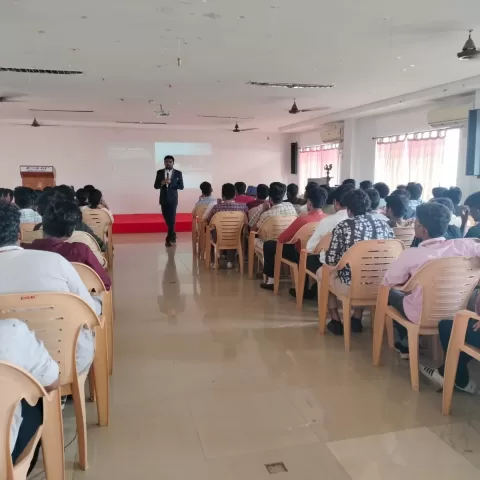
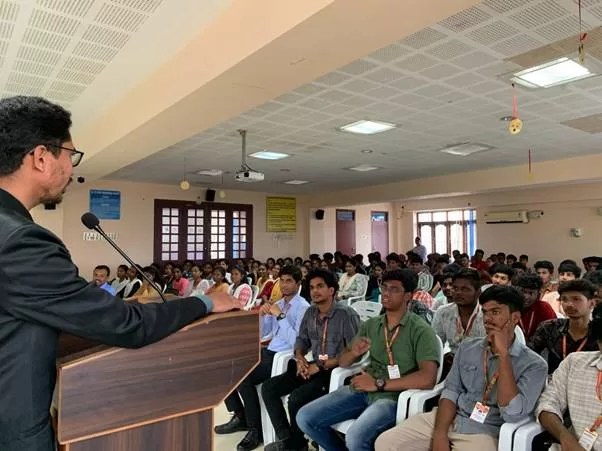
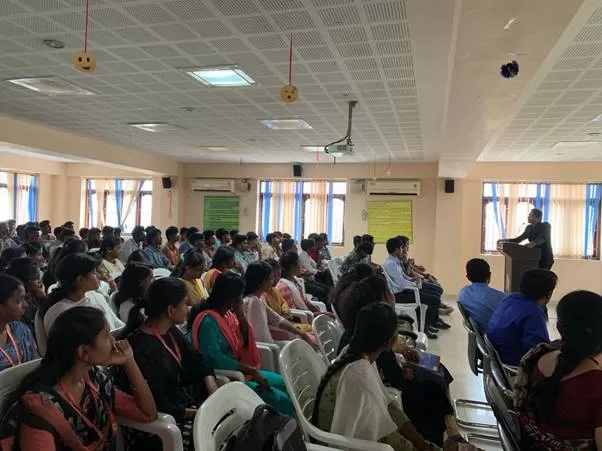
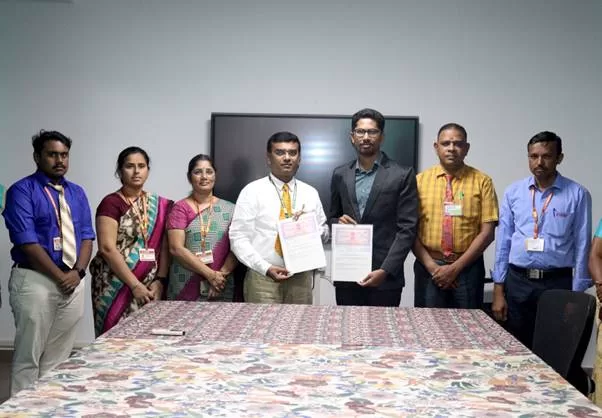
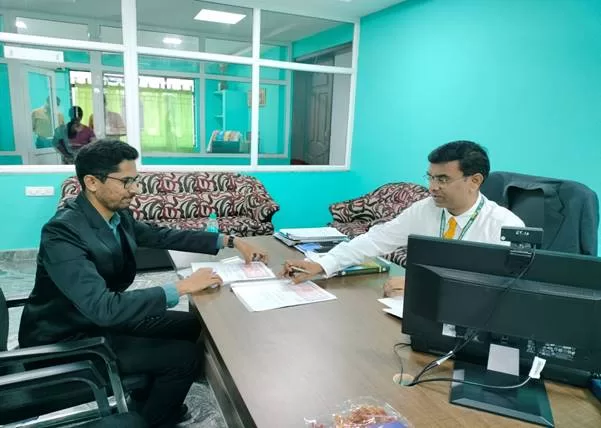


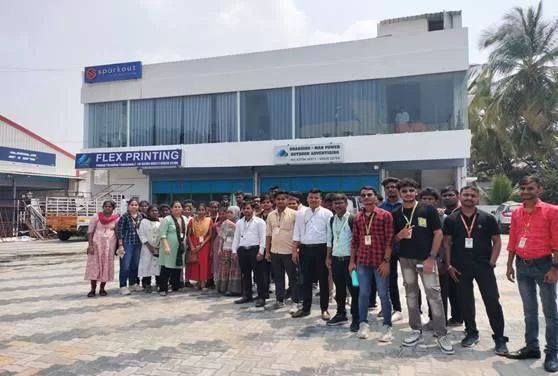
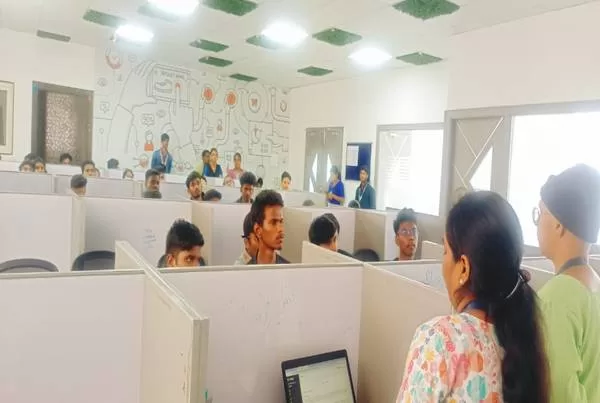
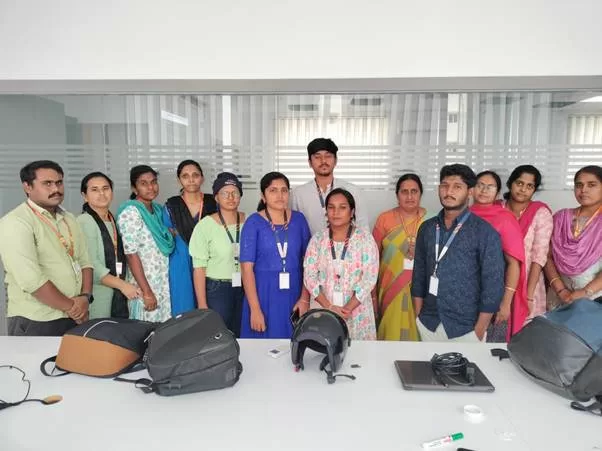
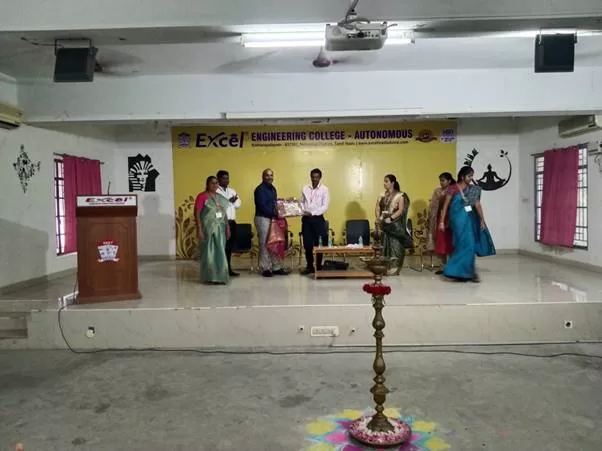
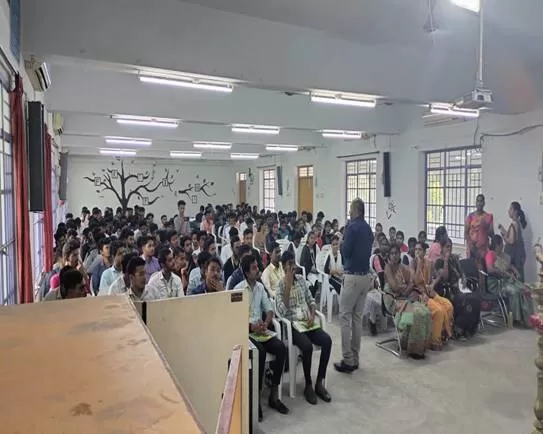
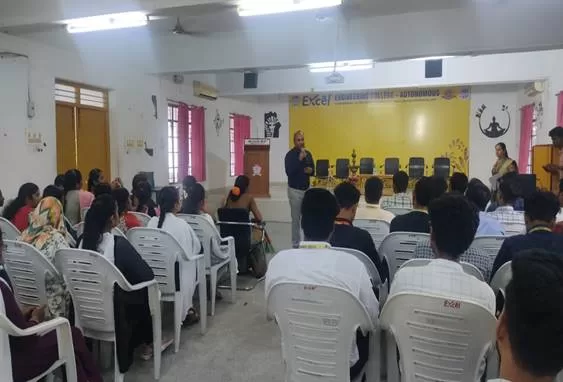
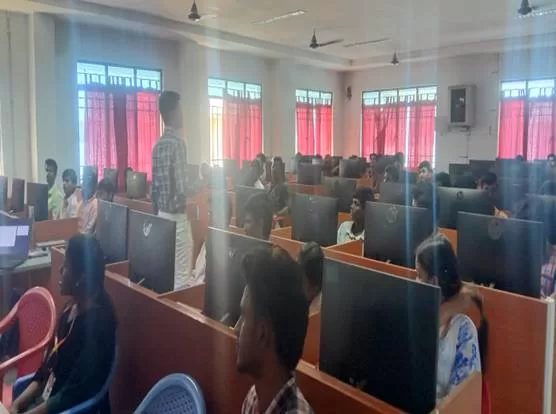
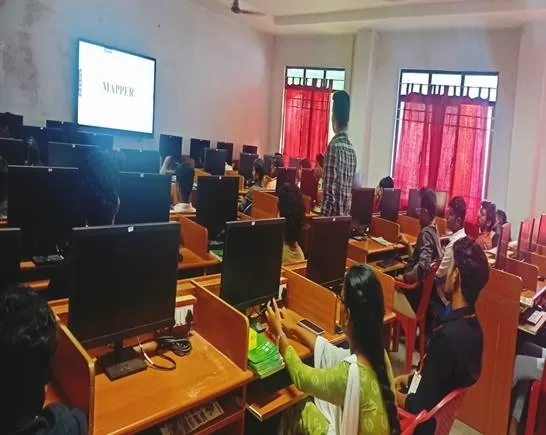
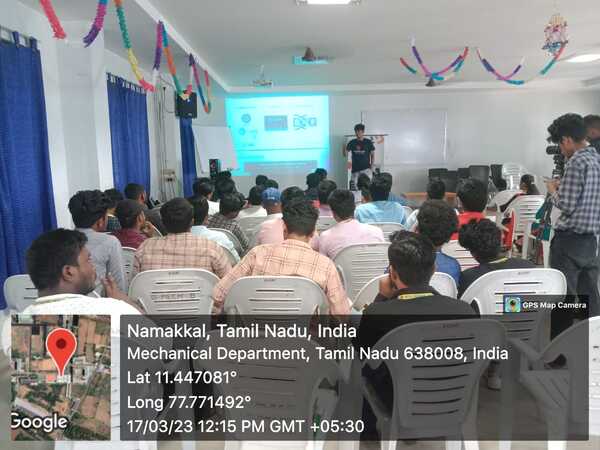
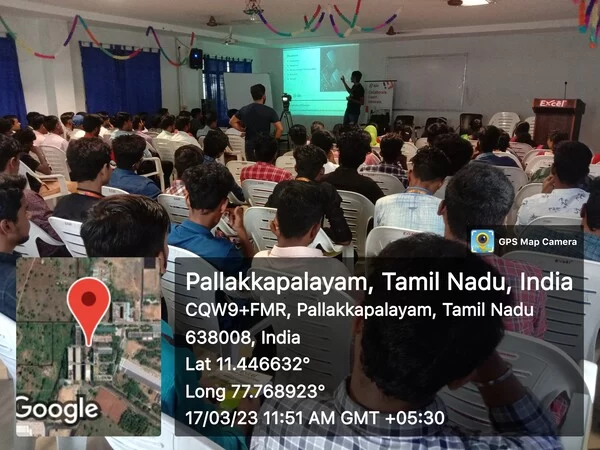
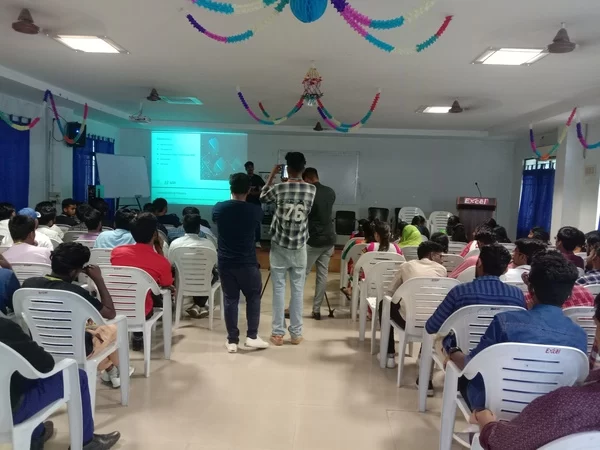
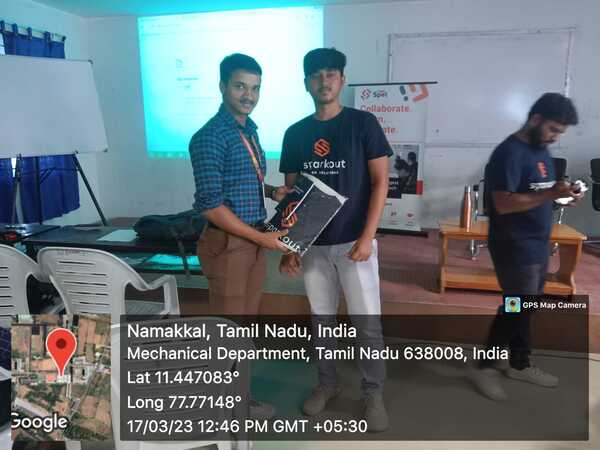
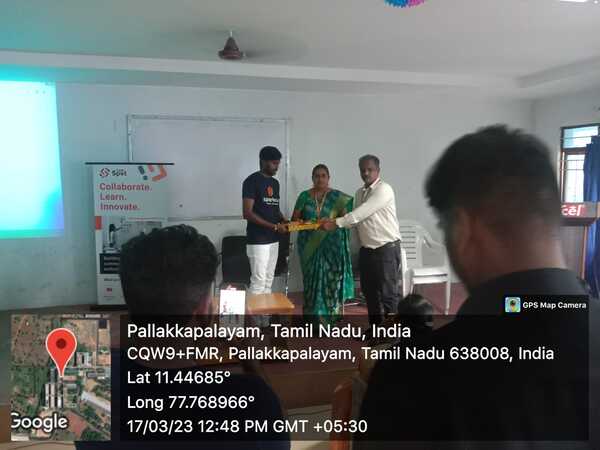
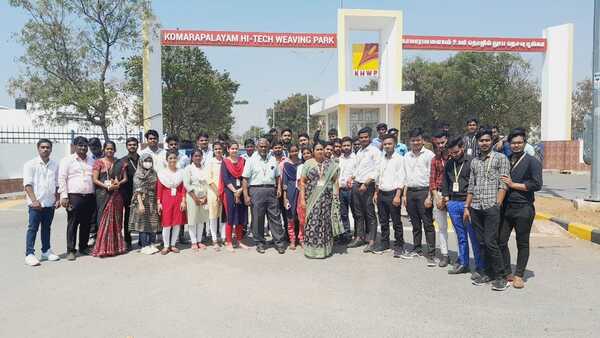
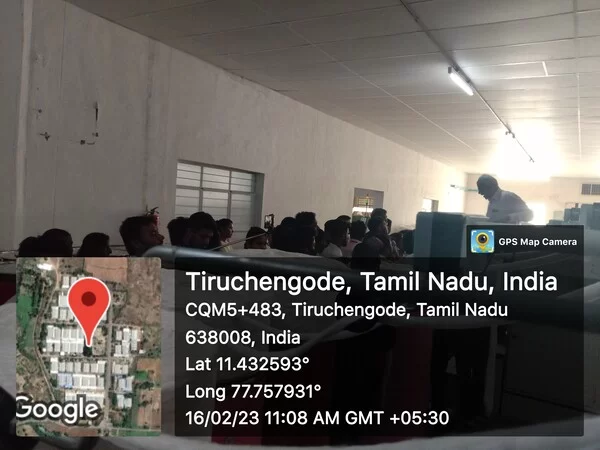
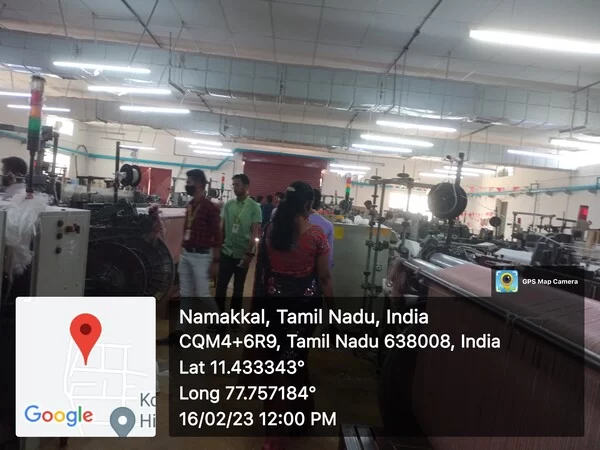
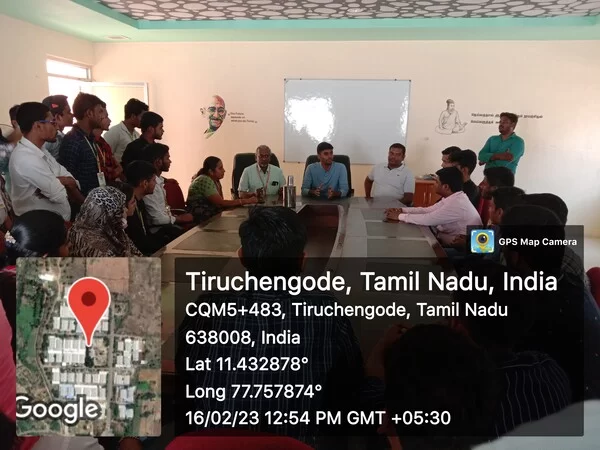
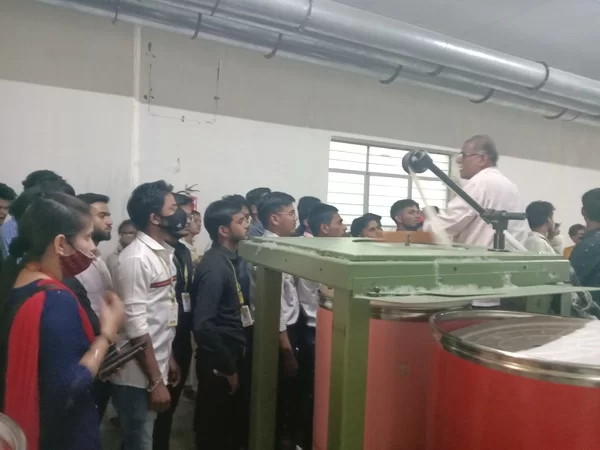
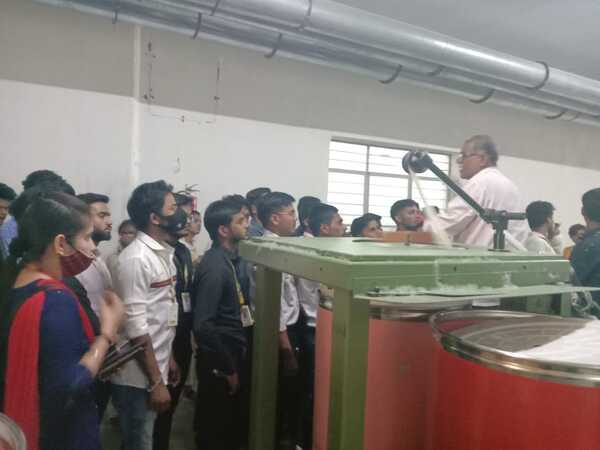
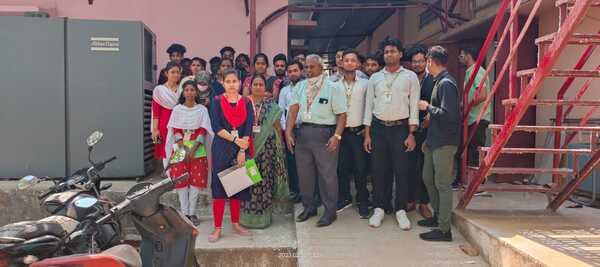
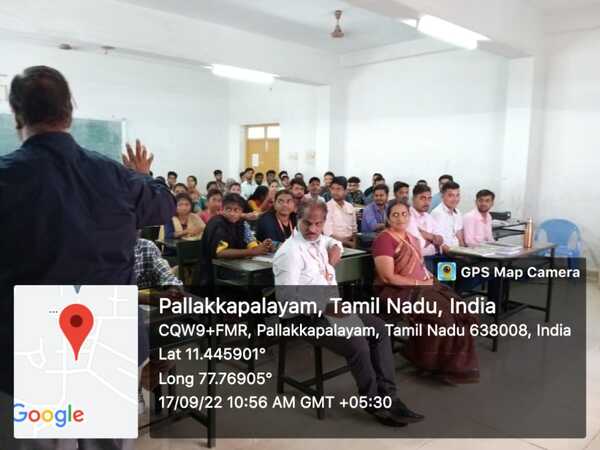
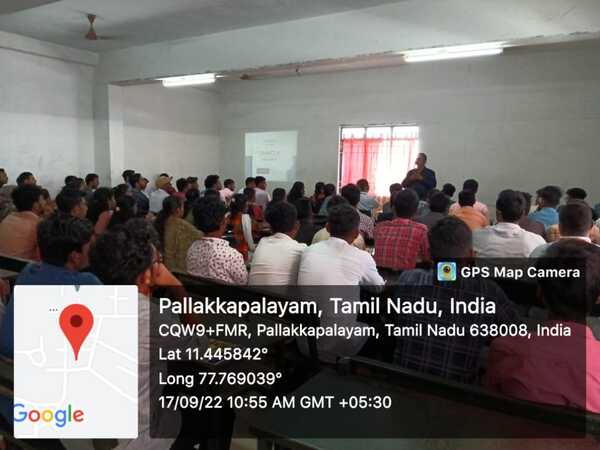
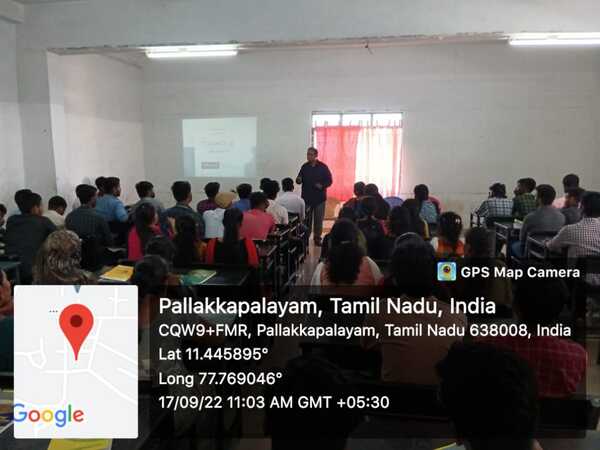



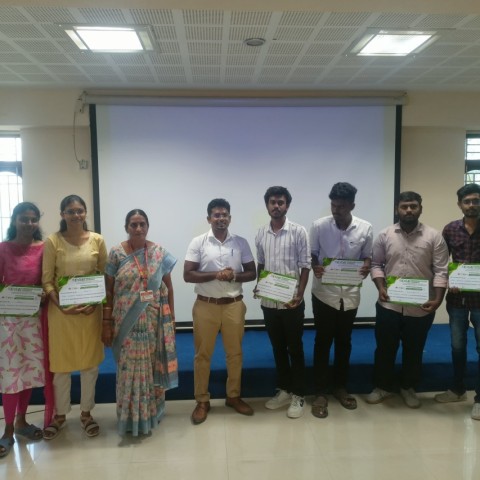

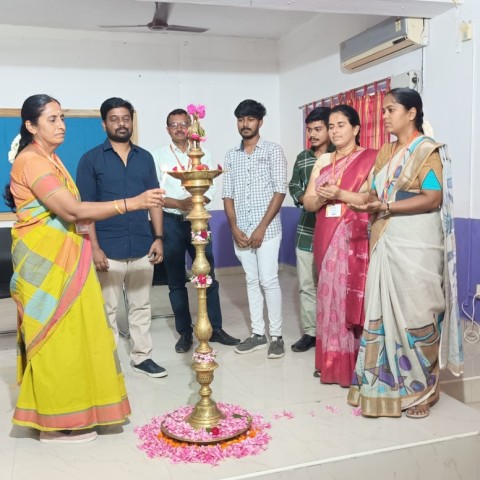
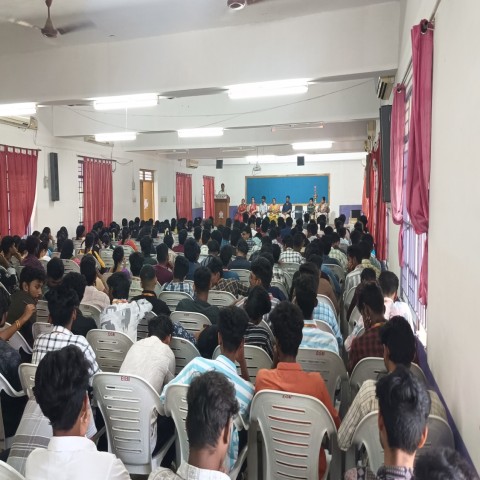
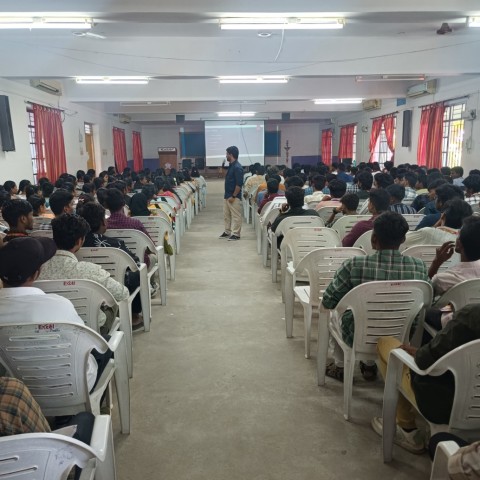
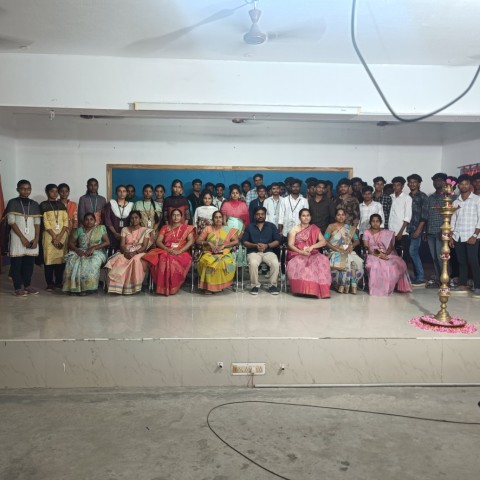
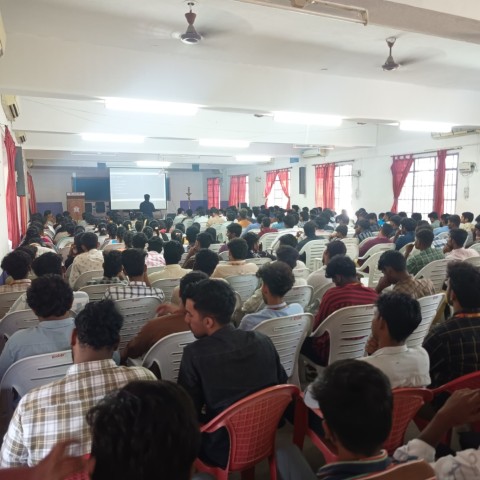
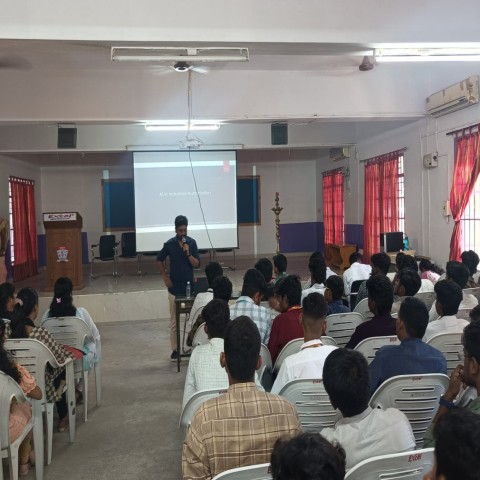



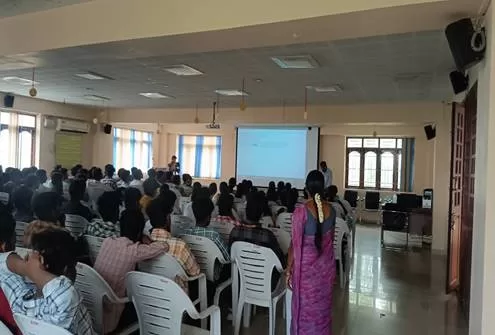
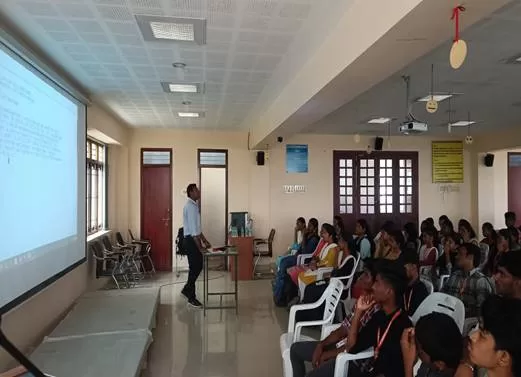
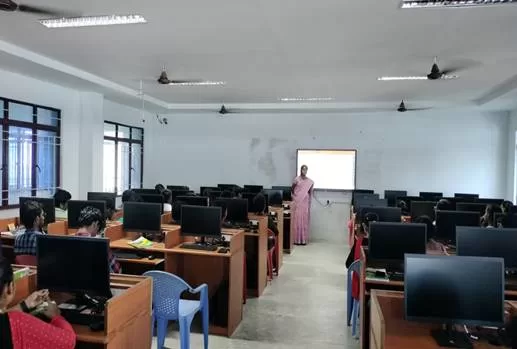
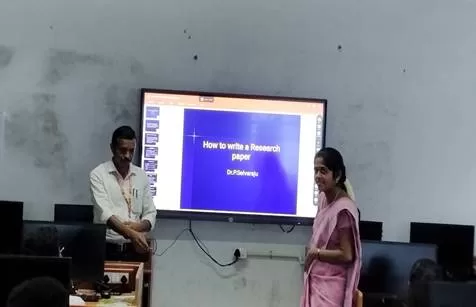
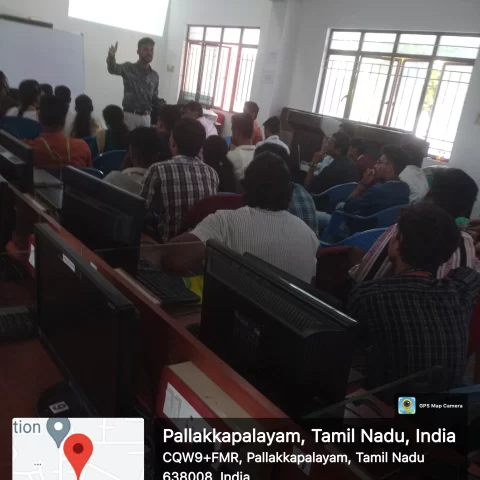
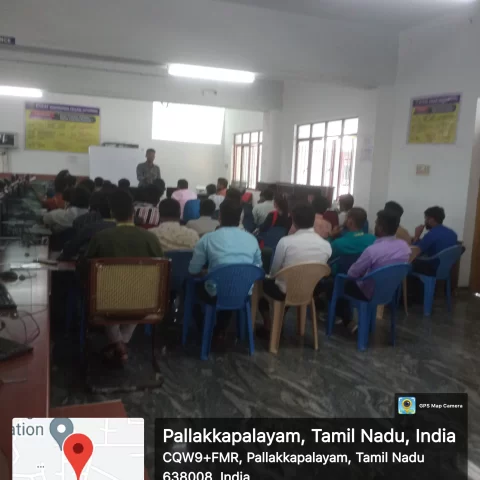
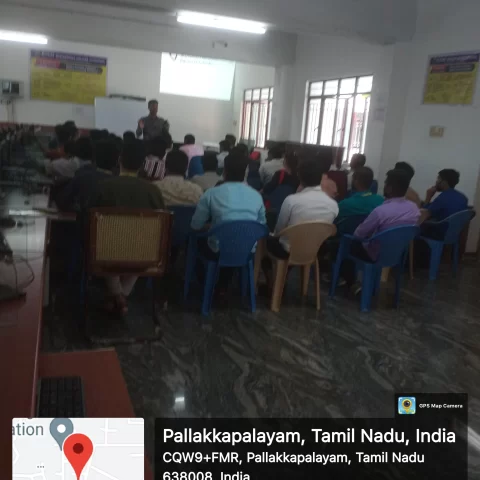
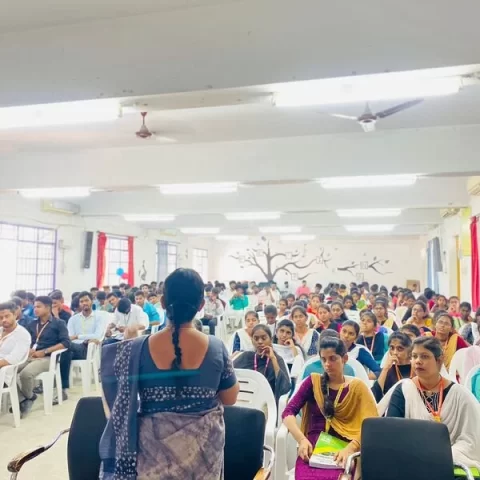
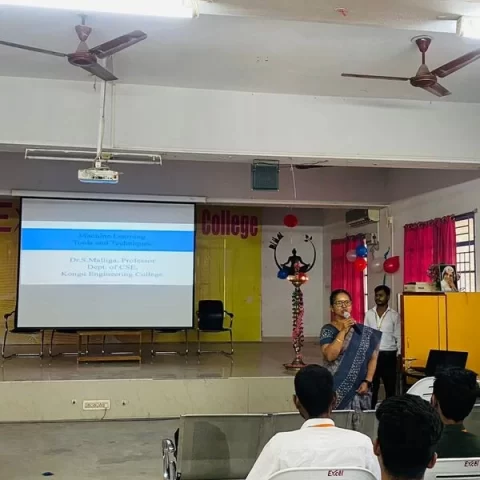
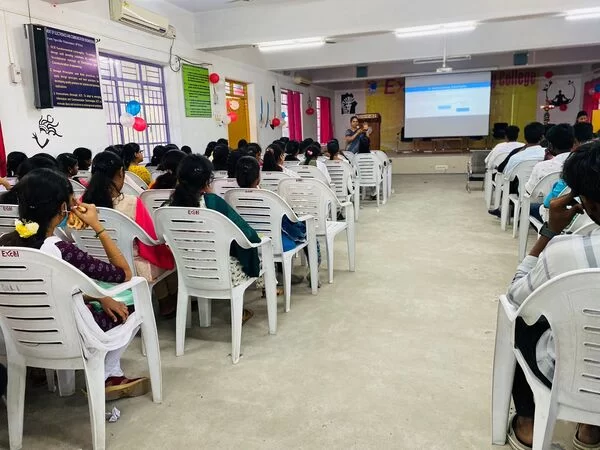
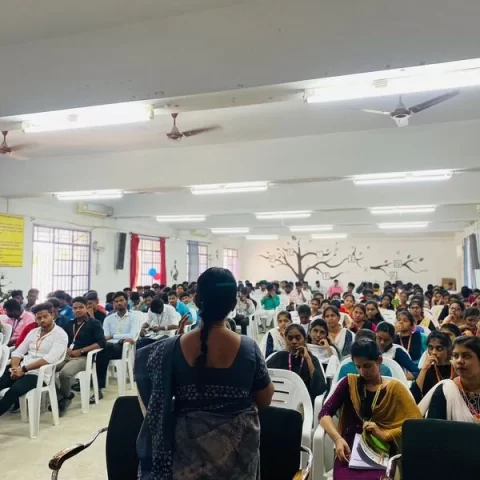
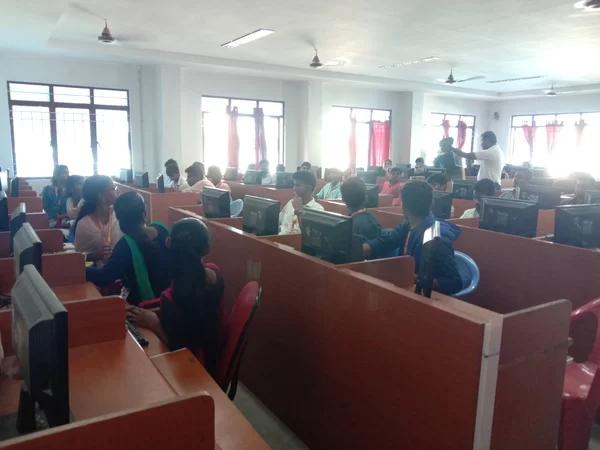
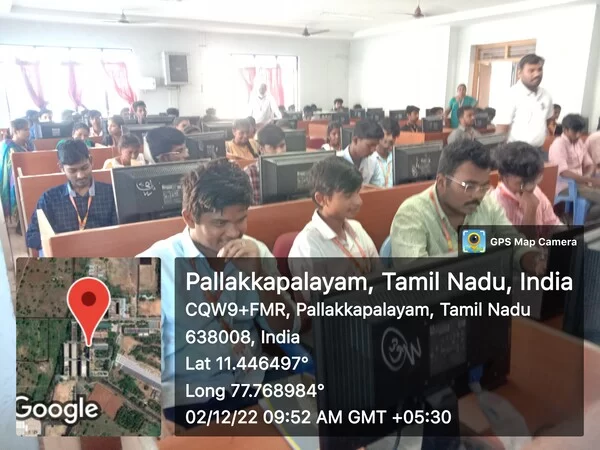
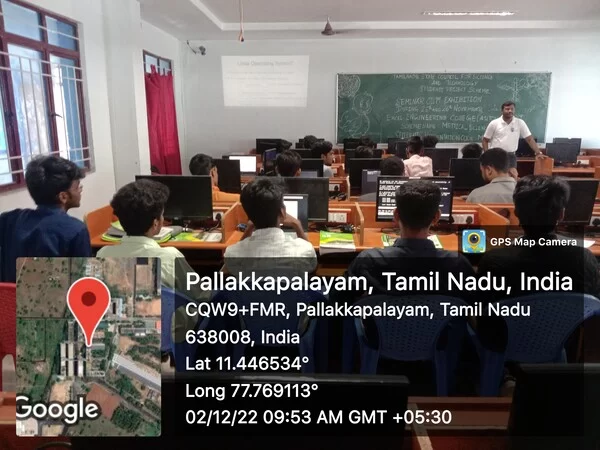
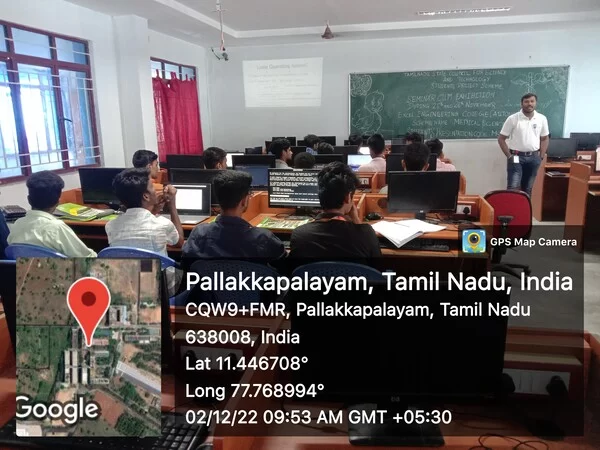
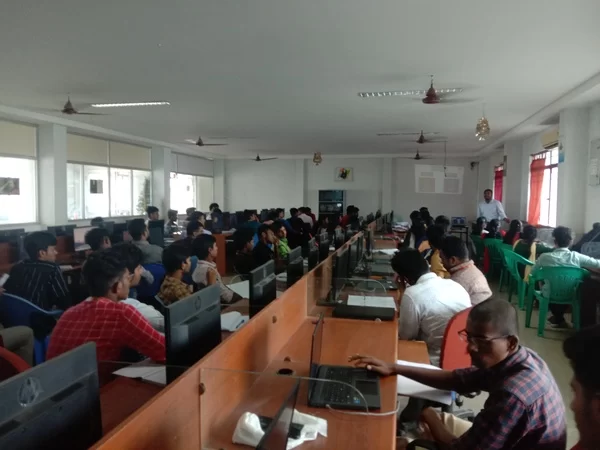
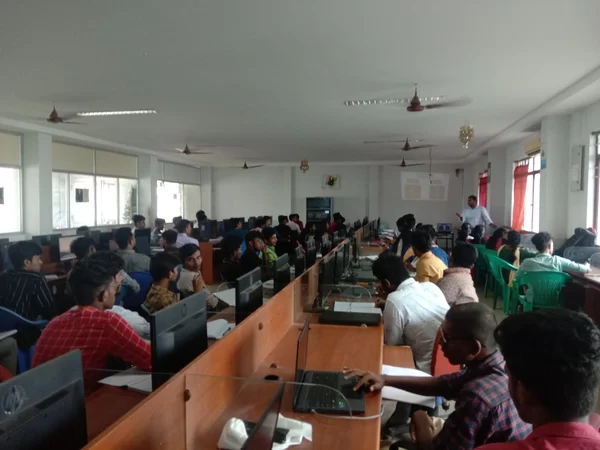
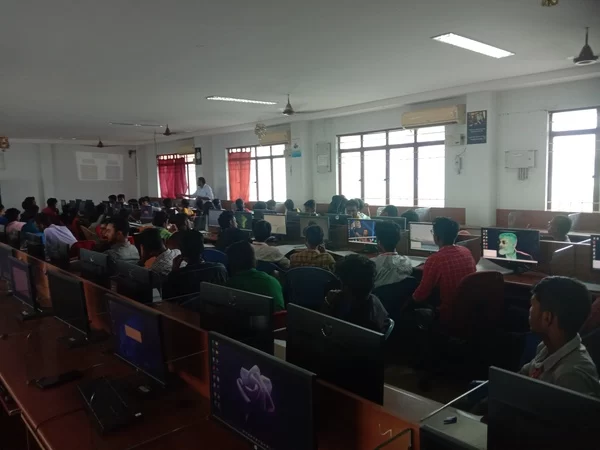
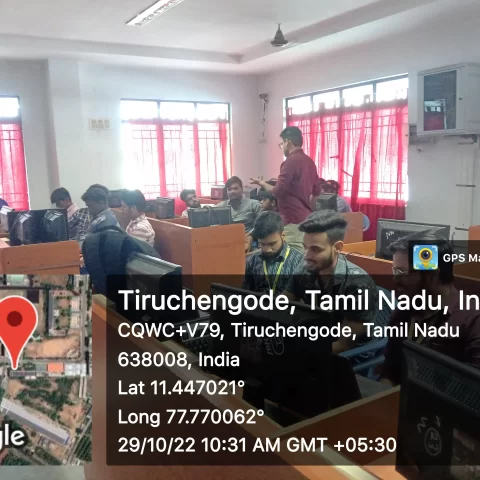
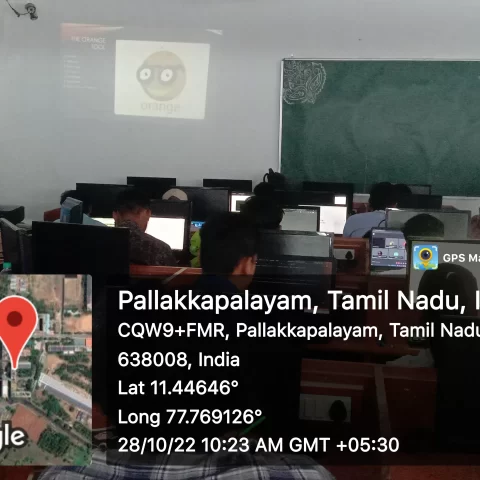
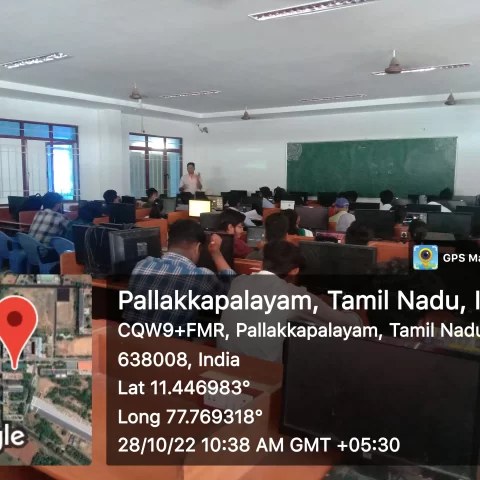
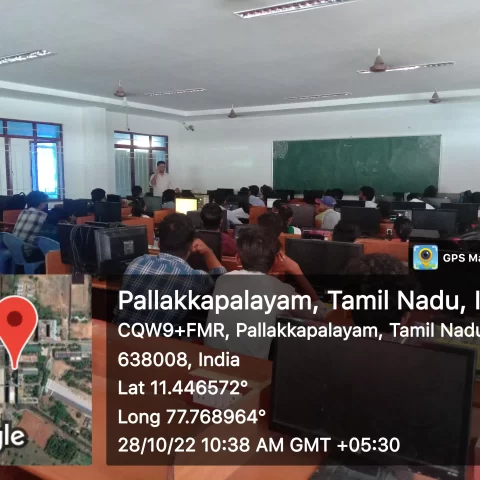
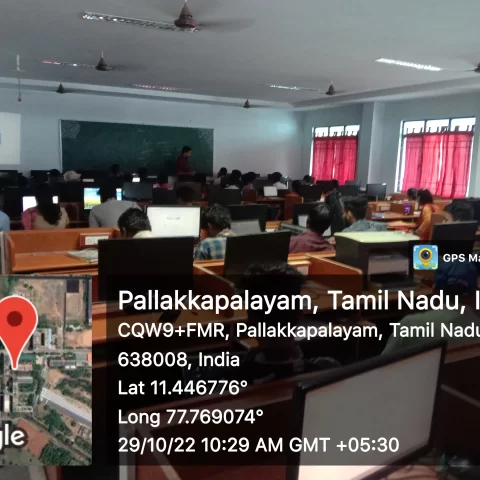
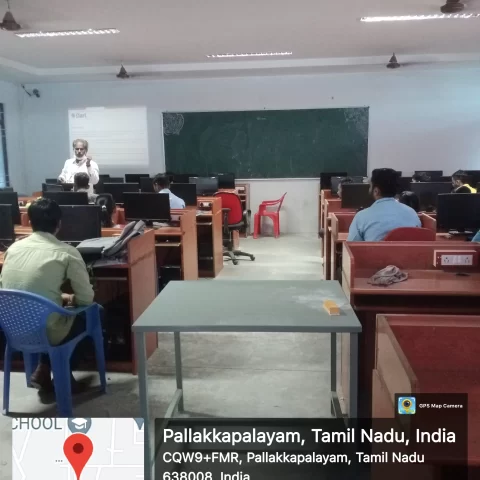
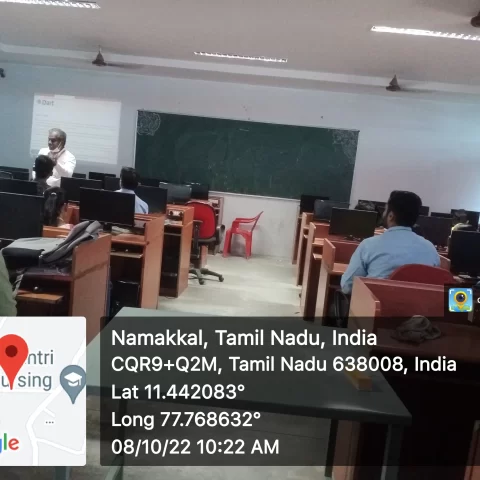
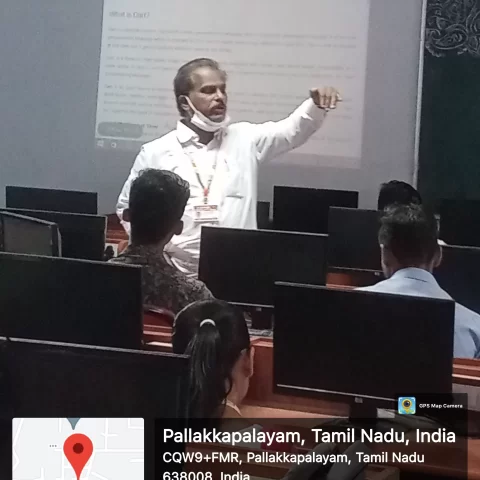
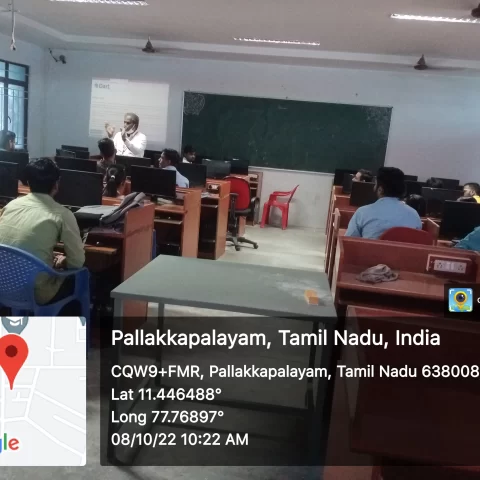
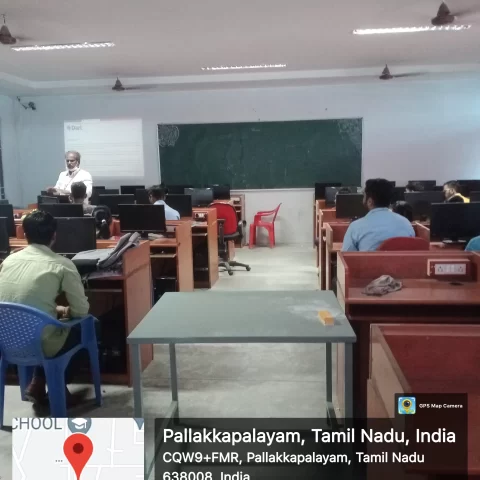
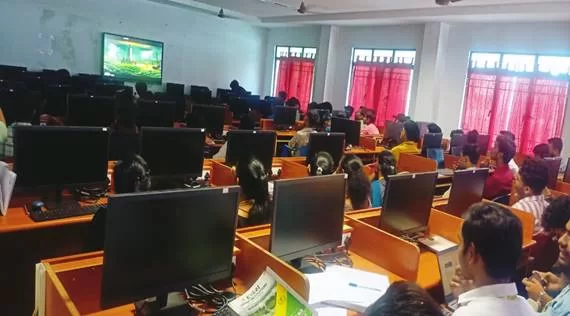
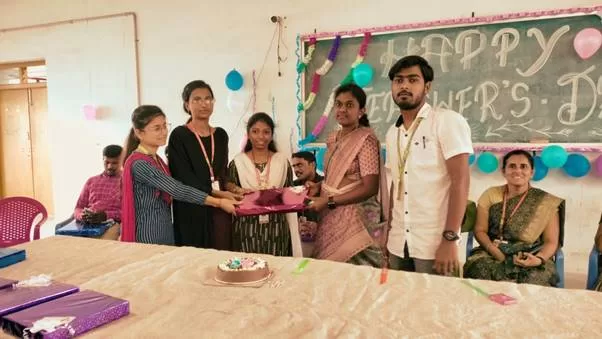


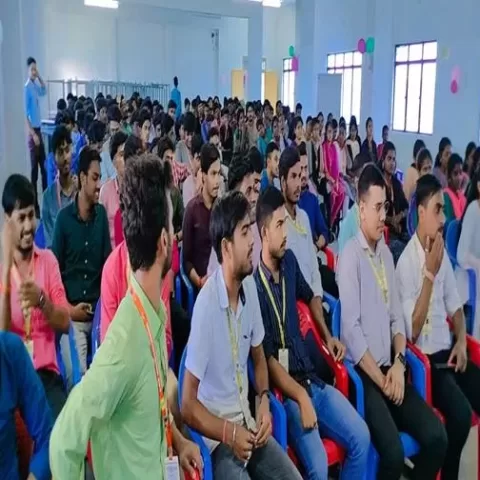
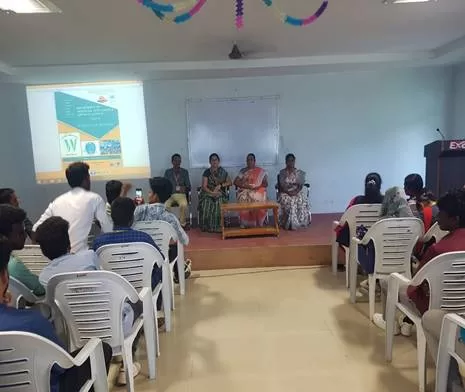
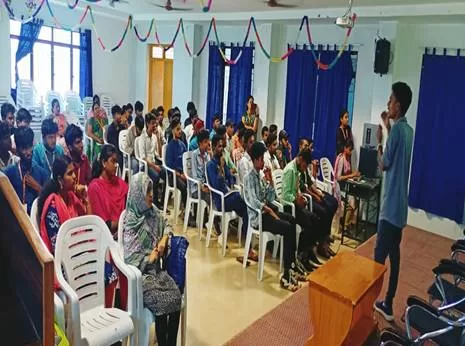
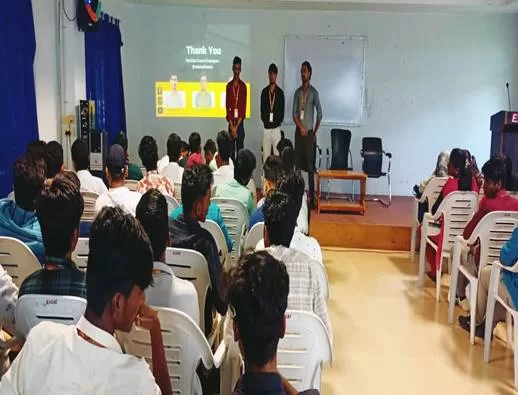
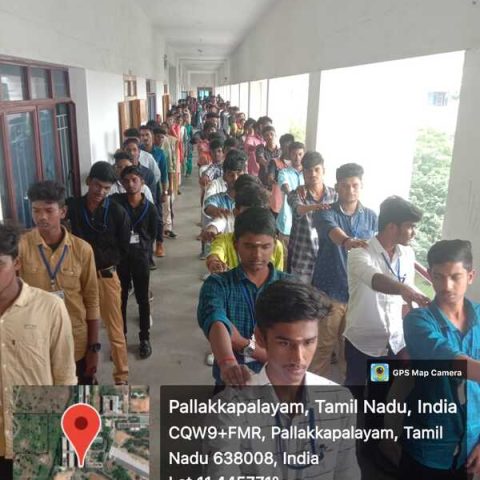
![IMG_20221128_094924[1]](https://excelinstitutions.com/excel_engg/wp-content/uploads/2023/06/IMG_20221128_0949241-jpg.webp)
![IMG_20221128_094935[1]](https://excelinstitutions.com/excel_engg/wp-content/uploads/2023/06/IMG_20221128_0949351-jpg-480x480.webp)
